Hotelie Hall of Fame Inductees
Inaugural Class – 2022
Inaugural Class – 2022
“Our Founding Father, A Determined Visionary”
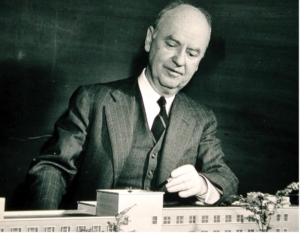
Our inaugural inductee to the Cornell Hotelie Hall of Fame is our founding dean, Dean Howard B. Meek.
“What started as the nation’s first experiential learning in hotel education, grew into the world’s premier school for hospitality. Dean Meek was a visionary leader who deeply understood the importance of experimental learning, and over five decades, with his incredible grit, persistence, and ingenuity, laid the foundation of leadership for our industry. To this day, with almost a century of HEC and the Dean’s Distinguished Lecture Series, and the Statler Hotel as our living laboratory, we are guided by Dean Meek’s extraordinary vision of partnering with our industry to create tomorrow’s leaders, today.” Kate Walsh, PhD, MPS ‘90, Dean and E.M. Statler Professor, Cornell Nolan School of Hotel Administration 6/2016 – present.
At the time of his passing in 1969, a beautiful tribute was written by Gerald W. Lattin , Charles I. Sayles ‘26, and Dean Robert A. Beck ’42 which told the wonderful life story of Dean Meek:
Howard Bagnall ‘Don’ Meek, E. M. Statler Professor, emeritus, founder and first dean of the School of Hotel Administration at Cornell University, was internationally known as the leading educator in the hospitality industry, which today ranks as the foremost industry worldwide. In 1918 he initiated collegiate education in this field with two courses at Boston University, which led the American Hotel Association to propose him as head of a new program sponsored by that organization at Cornell University in 1922. Professor Meek built the Cornell program from four courses, for which he was the sole instructor, into an independent college with its own building and a full-time faculty of twenty-one, with an equal number of lecturers drawn from industry.
‘Prof,’ as he was affectionately known by the School’s three thousand alumni, interested Ellsworth M. Statler, America’s foremost hotelman of the 1920s, in giving financial support for the establishment of Statler Hall, a $10 million complex devoted to the professional training of future hotel executives.
After his retirement in 1961, Professor Meek directed his energies toward broad educational service for the hospitality industry as executive director of the Council on Hotel, Restaurant, and Institutional Education (CHRIE), and was actively engaged in such activities at the time of his death.
Professor and Mrs. Meek traveled widely around the world, often visiting with School alumni who managed major hotels in countries abroad. Today, the Cornell school is acknowledged to be the major collegiate institution of its kind in the world and it draws about 15 percent of its five hundred full-time students from outside the United States. (As of 2022, there are over one thousand full time students with about 30% being international students). Summer short courses for industry employees were initiated in 1928 and executive educational seminars in 1955. Both attract worldwide attendance. Shortly before Professor Meek’s retirement as dean, he established a research department to serve the hotel and restaurant industries and also a publications department which provides a quarterly magazine, training manuals, and textbooks.
Professor Meek was past president of the New York State Minimum Wage Board for the Hotel Industry, consultant to the OPA, Point IV, AID Programs, and past president of the Tompkins County Hospital and the Ithaca Reconstruction Home. Among his professional affiliations were the American Statistical Association, the American Economics Association, Cornell Society of Hotelmen, Ye Hosts, and life memberships in the National Restaurant Association and the Club Managers Association of America. His publications include A Theory of Hotel Room Rates (1938), Hospitalities Around the World (1938) and Hotels of Latin America (1952).
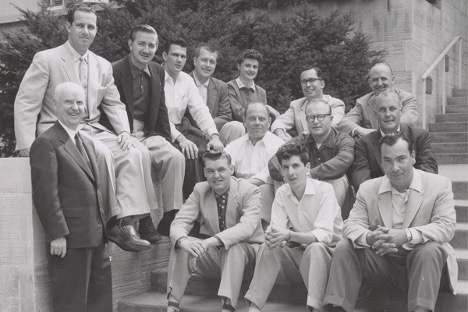
Professor Meek was born in Chelsea, Massachusetts, on October 30, 1893, the son of Warren Lee and Eliza Fowler (Reed) Meek. He obtained his B.S. degree in mathematics from Boston University in 1917. This same institution conferred on him an honorary Doctorate of Education in 1949. He earned his M.S. degree in mathematics from the University of Maine in 1920, where he was also a member of the faculty; and his doctorate in economics from Yale University in 1933.
In 1924 he married Lois Ann Farmer, a member of the faculty of the College of Home Economics, who taught food management courses in hotel administration for several years following their marriage. (They had two children, Lois Jean Meek and Donald Bagnall Meek.)
In May 1969, Professor Meek received two honors in recognition of his fifty years of service to the hospitality industry. The School’s library, the first and largest library collection of hotel and food service titles, was named the Howard B. Meek Library. The Cornell Society of Hotelmen also established the Howard B. Meek Visiting Professorship at Cornell University.
The community’s awareness of his contributions is best exemplified by an Ithaca Journal editorial:
“It is not given to many men to found a school. Dean Meek did—the School of Hotel Administration at Cornell University, rightly famed throughout the world. In 1922 he became a one-man faculty of what was then a department in the College of Home Economics. It included twenty-one students, four courses, and the sole instructor, Professor Meek. Today, the School of Hotel Administration occupies its own home, Statler Hall, with a faculty of twenty-one and five hundred students. (In 2022, there are 60 faculty members and over 1,000 students). He was the School’s first dean. His accomplishments earned him the esteem of the entire hotel industry. ‘Dean Meek did not confine himself to his school and the University. He found time to work on behalf of Tompkins County Hospital and the Reconstruction Home, as well as the Rotary Club. He was town as well as gown’.”
His colleagues and friends will miss him, but he will not be forgotten. The School of Hotel Administration is his monument.” Gerald W. Lattin MS ’48, PhD ’49 CALS, Charles I. Sayles ’26, Robert A. Beck ’42 – 1969
(Gerald W. Lattin spent 23 years at Cornell Hotel School as a faculty member and Assistant Dean from 1961-1971. He was also the founding dean of the Chaplin School of Hospitality & Tourism Management, Florida International University. After he retired from FIU in 1981, he was recruited to be the dean of the Conrad N. Hilton College at the University of Houston where he served until 1986. Charles “Chuck” Sayles was a faculty member at the Cornell Hotel School starting in 1931 teaching engineering, constructions, and property management. In the 1960’s he became a pioneer in the emerging field of data processing and its application in the hospitality industry. He also supervised the construction of the Statler Hall.)
And here are some tributes from the recent deans of the School:
“Given the University situation at the time he established the SHA, I’ve always had a deep appreciation for how difficult it must have been for him to bring the SHA about and have often thought how pleased I believe he would have been with its later successes.” Jack Clark, Dean Emeritus, Cornell University, Dean 7/1981 – 12/1989
“Dean Meek required all hoteliers to pass a math quiz that he constructed. This insured that they had the quantitative skills to succeed in the hotel business. This is an example of his vision into the future.” David A. Dittman, Hubert E Westfall Professor of Accounting Emeritus and Dean Emeritus, Cornell University, Dean 7/1990 – 6/2000
“Dean Howard B Meek laid the foundation that has enabled the Cornell Nolan School of Hotel Administration’s century of success. He worked in close partnership with an increasingly complex industry. He recruited a student-centered faculty armed with useful knowledge. Through nearly four decades he drove his vision from its humble beginning in closets and basements to a flourishing, respected Ivy League School” David Butler, Former Dean, Cornell University, Dean 7/2000 – 6/2005
“The legacy of Dean Meek is that his vision for the School was spot on from its founding as a program in 1922. The industry needed business leaders, so he founded a program, and eventually a school, that formed leaders in the business of hospitality. By doing so, he created one of the very first experiential learning programs in higher education. He was about 100 years ahead of his time!” Michael D. Johnson, Dean and E.M. Statler Professor Emeritus, Cornell University, Dean 7/2006 – 6/2016
Many graduates of the School went on to lead other university hospitality programs further developing the talents and leadership for the industry. Here is a tribute from the most beloved hospitality educator of all times:
“It was Dean Meek who convinced me to attend the Cornell Hotel School. I traveled to hotel conferences with him and witnessed the respect that hotel executives had for him. He was an exceptional educator and mentor to students.” Rocco M. Angelo ‘58, Associate Dean, Alumni Relations, E.M. Statler Professor, Chaplin School of Hospitality & Tourism Management, Florida International University
The respect that the industry leaders had for Dean Meek created extraordinary opportunities for Hotelies for decades. We are all indebted to him and sincerely in awe considering:
We all know the story of Dean Meek convincing E. M. Statler of the value of the School and the $10 million donation in 1927. Adjusted for inflation, that donation is equivalent to $170 million in today’s value. That is an incredible enrollment for his vision. The rest, 100 years later, is of course all history.
“Creator and Promoter of The Wonderful World of Hospitality Marketing and Education”
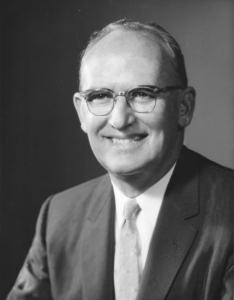 Our inductee for the Cornell Hotelie Hall of Fame for the decade of the 1920’s in the Inaugural Class is H. Victor Grohmann ’28.
Our inductee for the Cornell Hotelie Hall of Fame for the decade of the 1920’s in the Inaugural Class is H. Victor Grohmann ’28.
The following tribute was eloquently written in 1981 by Dean Robert A. Beck ‘42, Vance A. Christian ‘61, Paul L. Gaurnier ‘50 after the passing of Victor Grohmann:
H. Victor Grohmann graduated from the School of Hotel Administration in 1928 and was an ardent supporter, friend, and contributor to Cornell and the hotel school for the rest of his life.
Vic’s accomplishments and involvements over the years since graduation have truly been legendary among hotel school graduates, and a discussion of him and his efforts on behalf of the school was to be expected whenever Hoteliers gathered. He personally helped hundreds of graduates in job searches; in fact, his interest in assisting fellow alumni, young and old, resulted in the establishment in New York City of a placement service for hotel school graduates. He provided the office space and paid for the salaries and administrative costs associated with this office for thirty-five years, in addition to giving thousands of hours of his own time.
Professor Grohmann taught for forty years at the School of Hotel Administration, including the Center for Professional Development sessions during the summer periods. He was the first Howard B. Meek Visiting Professor and was able to teach and to counsel students with an intense commitment that was truly extraordinary, considering his other interests and responsibilities.
Vic liked teaching and was very impressed with the students he met over the years. They, in turn, appreciated being taught by an active, successful businessman. Vic’s ability to combine careers and to be accepted as a very successful, contributing member of each group was one of the most remarkable aspects of his personality. He was always able to get things done. His willingness to help others was so ingrained that he took it for granted that others would also want to help worthy causes. Without Vic’s telephone calls to general managers of hotels situated where Cornell athletic teams needed lodging, the Athletic Department budget would have had to bear thousands of dollars more in lodging costs.

H. Victor Grohmann ’28 as headwaiter at the 1927 HEC. He is credited with escorting E. M. Stater around campus so well he left the previously skeptical hotelman convinced the Cornell Hotel program deserved his future support.
Vic always felt he owed a great debt to Cornell. He had transferred from Rutgers to study agriculture but soon became interested in the curriculum offered by the School of Hotel Administration and switched his course of study. His interest in entrepreneurial activities can best be described by a note from him: “My last two years I worked in the student union, and I sold programs at athletic events, cereal, stationery, flowers, and used cars. I was holding so many jobs, when I graduated and got a nine-to-five position, I didn’t know what to do with all the time off.”
After graduation he worked in several hotels but always had a yearning for creative work. He therefore switched jobs and joined an advertising agency. Just a short while later, in 1931, he and a coworker (William R. Needham ’25) decided to open their own agency. The fact that the country was in the throes of a deep depression didn’t deter them; they believed the agency of Needham and Grohmann would have something special to offer clients. The agency grew steadily and has for many years been one of the preeminent agencies in the hotel, resort, and travel field. Housed at 30 Rockefeller Plaza, in New York City, it has long represented Rockefeller family properties such as Rock Resorts and Rockefeller Center, in addition to some of the most prestigious hotels in the world.
His identification with Cornell was constant throughout his lifetime. He was the founder and first president of the Cornell Club of Bergen County, he was president of the Cornell Club of New York, and he was president of the Cornell Society of Hotelmen.
Vic’s devotion to his alma mater and his willingness to do so much was brought to bear as a member of the University Board of Trustees. He served ten years on the board and was awarded the Presidential Cornell Medal for distinguished service.
A brief statement of Vic’s accomplishments in areas other than his business and Cornell activities may serve to assist H. Victor Grohmann’s many friends and associates to fill in their own portrait of this remarkable individual. He was a trustee of the United States Travel Data Center and chairman of the United States Travel Data Fund. He served on the board of Discover America Travel Organization for twelve years and was an official of the American Hotel and Motel Association. In addition to his other activities, Vic always found time for local community affairs and served on an amazing array of committees. He was president of the Community Chest in New Jersey, chairman of the Tenafly, New Jersey, Senior Citizen’s Housing Committee, and a member of the Mayor’s Advisory Committee.
Many readers may associate Vic more with sports than with any of his other activities. He was certainly deeply committed to sports, both as a participant and a fan. He played football in high school and swam at Rutgers. When he transferred to Cornell, he played football, and since there was no swimming team, he organized one and acted as coach. He later played semiprofessional quarterback and halfback for the Atlantic City Tornados. Vic served on the athletic board at Cornell and spent many years with promising high school athletes, extolling the virtues of a solid education at Cornell. Among those he recruited was Ed Marinaro ‘72, who went on to all-American and professional football fame.
Vic was a fine, forthright gentleman who believed in hard work and commitment and who adhered to principles that some may regard as traditionally, perhaps uniquely, American. At his retirement gathering—at age seventy-eight—he said of his life, “It’s really been the American dream.”
He was survived by his wife, Margaret Elizabeth (née Haver), of Sussex, New Jersey; a daughter, Gwendolyn DesCognets ‘56, of Grantham, NH; and two sons: Victor Nelson, of Lakeville, Connecticut, and William Haver, of Amherst, Massachusetts.
“I met Vic Grohmann when I was a senior at New Milford High School in New Jersey and was being recruited by Cornell to play football. I applied to the Hotel School and was contacted by Mr. Grohmann who lived in nearby Tenafly. He gave me insight as to what was involved in SHA and pretty much sold me on Cornell and the Hotel School. He was my mentor during my time in Ithaca and beyond. He taught a course in advertising during fall semester on Friday afternoon. He would come up to campus the night before and we would often have dinner together at the Statler. He loved to hear about our team and was truly our biggest fan. He was an incredible role model for me not just for his remarkable profession career but for generosity and kindness. He was a special man. Mr. Grohmann’s support of Cornell football and Cornell Athletics in general made me realize how important alumni involvement is for athletic success at a university. Go Big Red!!” Ed Marinaro SHA ’72
From the preeminent hospitality sales and marketing organization HSMAI:
“Vic Grohmann was a hotel advertising legend and active in HSMA (the I for international was not added until 1984). He started the Needham and Grohmann Advertising Agency in 1931 but was not deterred by the depression. His partner was William H. Needham, another Hotel School grad. The agency thrived becoming one of the preeminent agencies in the hotel, resort, and travel field. Housed at 30 Rockefeller Plaza, in New York City, it represented Rockefeller family properties such as Rock Resorts and Rockefeller Center, and went on to serve some of the most prestigious hotels and destinations around the world.
In 1952, Mr. Grohmann authored a dictionary of advertising language; terms in common use throughout the advertising field allied professions and industries.
Mr. Grohmann thought the agency was responsible for many innovations and claimed the use of on-location sounds as background on radio commercials as one of them. Another – and you’ve got to take your hat off to them – is the first use of the phrase. ”The Wonderful World of…” for first used by the agency for Hilton Hotels. Still, another was the individual cracker-pack, an idea it gave to its client Nabisco.
In 1978, a majority of the agency was acquired by another Hotel School grad, Howard Heinsius ’50 and Grohmann became the chairman emeritus. The 60-year-old agency was sold in 1981 to Robinson, Yesawich & Pepperdine Inc of Orlando.
When Adrian Phillips, the Cornell instructor of a Hotel Sales class since 1940 and Executive Director of HSMA from 1950-1965, started the International Travel Competition in 1957, Vic and associates from Needham and Grohmann were among the first to submit hotel promotional work as entries in the competition. In 1974 the Competition was renamed the Adrian Awards and two new “best of show” honors were recognized. The HSMA Advertising Best of Show was named the “H. Victor Grohmann Award” in his honor. To this day recipients of that award over the year have his name prominently displayed on the trophies in their offices around the globe.”
Needham & Grohmann grew over the decades to count Hilton Hotels, Sheraton Hotels, Rock Resorts, the Cloisters, the Greenbrier, and Buck Hill Falls as some of its outstanding hospitality clients.
“Vic Grohmann was an advertising legacy in HSMA(I) history. The associations international advertising competition – the Adrian Awards – names their Best of Show award after him in 1974. To this day recipients of the H. Victor Grohmann Award” have his name prominently displayed on the trophies in the officers around the globe.” Robert Gilbert ’82, President, and CEO of HSMAI
Reading these stories of hospitality legends, the Cornell Hotelie bond and relationships are multi-generational.
“Vic Grohmann was the quintessential “ad man” of his generation: elegant, articulate, engaging. His lectures were populated with intriguing examples from his real-world practice, complemented by colorful cameos he would share about his dialogue with clients. All of which made his class something I was eager to attend…and accelerated my interest in learning more about the science of marketing communications.” Peter C. Yesawich ‘72, Ph.D., Vice Chairman Emeritus, MMGY Global, Inc.
Peter’s former namesake firm Robinson, Yesawich & Pepperdine Inc. acquired the firm of Needham & Grohmann in 1981.
While the bonds and relationships are multi-generational, so are the inspirations. These giants impacted countless Hotelies for many decades.
“If establishing the cornerstone of a successful enterprise is through its vision and culture, Victor Grohmann was your man. He exemplified an understanding and application of these throughout his business and educational careers. He not only saw an opportunity to apply these values in the world of advertising, but he lived a culture based on strong personal beliefs. Today we talk about ‘Giving Back’ as if it is a new concept, but this was second nature to a man who took joy in sharing his knowledge and experience with privileged students at the Cornell Hotel School over four decades. He was an example to us all.” Helen Smith ’81, Chief Customer Experience Officer, Dorchester Collection
Vic understood knowledge when shared expands rather than vanishes and shared generously he did. Vic didn’t just love the industry and Cornell quietly. He promoted what he loved. He amplified the merits of a rigorous hospitality marketing education. In the world of “if you build it, they will come” and “a hotel can’t be any good if you have to promote it”, he was a renaissance man.
“The Beloved Hotelier of The Greenbrier, America’s Resort”
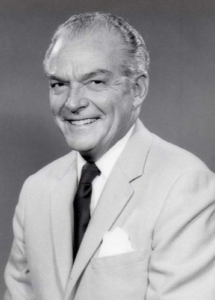
Our inductee for the Cornell Hotelie Hall of Fame for the decade of the 1930’s in the Inaugural Class is E. Truman Wright ‘34
E. Truman Wright was a 1934 graduate of Cornell’s Hotel School. He honed his skills at the Waldorf Astoria in NYC and Lake Placid Club in Lake Placid, NY as well as serving as a US Naval officer in World War II before moving to White Sulphur Springs, WVA in 1951 as President and Managing Director of the Greenbrier Resort.
Truman earned many hospitality awards during his career, including being the first recipient of the ‘Resort Executive of the Year’. He was a past president of the West Virginia Hotel and Motel Association and of Southern Innkeepers, a member of AH&MA Resort Committee, the Tavern Club, Rotary International and a great many other organizations. He served as the president of the Cornell Society of Hotelmen 1956 – 1957. During his career, he hosted many members of royalty, several US Presidents and set the standard for hospitality excellence.
After retiring in 1975, he often witnessed in churches in West Virginia and Florida, where he and wife Peg Wright (also a Cornell graduate) spent their winters. In 1995, they moved to St Simons Island, GA to be closer to family. Truman passed the love of hoteling to both of his sons (Edward T. and Walter D.) and they also graduated from the Cornell Hotel School in 1958 and 1974, respectively.
Richard A. Holtzman ‘76, current Montage International executive, formerly founding President of Carefree Resorts, 1995 HOTELS Independent Hotelier of the World, was asked to provide a tribute on Truman Wright since he is a Hotelie legend in the resort’s world. He provided a fascinating story about the Cornell Hotelie heritage:
Truman Wright was a larger-than-life figure and force in leading The Greenbrier to greatness from 1950 to 1974. Truman Wright was firm and fair in his uncompromising approach to excellence in the Greenbrier Resort experience. A great hotelman, a loving husband, father, and grandfather.
My first memory of Mr. Wright was when I was a young boy living on the grounds of The Greenbrier, as my father, Richard E. Holtzman ‘41, served as his Hotel Manager (Richard went on to put Sheraton on the map in Hawaii and founded Rock Resorts). He had an unforgettable presence. Fifteen years later, I returned to The Greenbrier as a summer intern, which coincided with Mr. Wrights final year at The Greenbrier.
Truman Wright was on a very short list of dynamic hotel managers that led important and historic hotels and resorts to international prominence, for decades. These hotel managers were linked to those great hotels, committed to their guests, employees, and the communities they served.
Truman Wright collaborated with the executive level of Federal Government to develop and construct a 140,000 square foot underground bunker in 1958, capable of housing Congress in the event of a nuclear attack, so feared during the cold war years. This was all accomplished brilliantly, in plain sight, in coordination with the construction of additional guestroom wings, a third golf course, and a new medical clinic at The Greenbrier. The bunker was successfully built but was decommissioned in the mid-1990s. So impressive that Truman Wright was so trusted to be at the tip of the sword for this incredible, top-secret initiative.
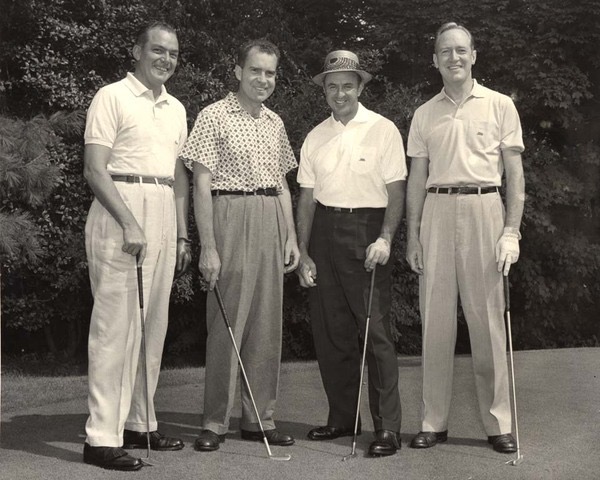
Truman Wright, Vice President Richard Nixon, Golf Legend Sam Snead, Attorney General William Rodgers at the Greenbrier in 1958
“Truman would come by my office once a week while he summered in White Sulphur Springs and usually spend an hour just talking hotel stuff. I always looked forward to his visits. His sage advice was sometimes less than subtle…but always spot on! They (Truman Wright and Maggie Kappa ‘44) gave me a Cornell education that served me well without ever attending.” Ted Kleisner, Director of Operations, General Manager, 1980-1984, Vice President & Managing Director, President & CEO, 1987-2006, The Greenbrier
Hotelie legends inspire many generations of Hotelies.
“Although I never had a chance to meet Truman Wright, his influence on the Greenbrier had a lasting impression on me as a young hotelier. Shortly after graduation from the Hotel School, I became employed at the Hotel Hershey. Our iconic aspiration was the Greenbrier. I remember it like it was yesterday, seeing the Greenbrier’s promotional video in the early 90’s. The video was a beautiful portrait of the glamor and elegance of preparing for a guest arrival at the Greenbrier. No words, just classical music showing team members cleaning, cooking, setting the table, landscaping, really glamorizing the art of hospitality. After two or three minutes of film depicting these beautiful acts of service, a bellman opened the car door of the arriving guest (the viewer) and simply said, “Welcome. We’ve been preparing for your arrival.” It was the most impactful and elegant depiction of hospitality I’d ever seen. Quite an impression, and made me very proud to be in this honorable industry. Truman Wright was a legend for providing generations of inspiration.” Abby Murtagh ’92 General Manager, The Arizona Biltmore, A Waldorf Astoria Resort
“Generations of Hotelies, myself included, have been inspired by E.M. Statler’s quote explaining his belief “Life is Service” and you succeed in our industry by giving a little more, a little better service. Statler made these remarks a decade prior to E. Truman Wright’s graduation from the School of Hotel Administration, but I am confident Hoteliers like Wright were exactly what Statler had in mind and envisioned for the Hotel School’s future success.
Wright’s life was service; service to our country, service to our industry and service to countless guests and colleagues. He always gave more.
During his longstanding leadership and tenure at the Greenbrier, Wright demonstrated the highest standards of hospitality with tremendous skill and care. He set a standard for other luxury hoteliers to emulate if they were able. What Wright created and sustained at the Greenbrier during his years of service, is not only admirable, but also an important part of hotel industry history in America. The Greenbrier and Wright are both icons in independent, luxury resort operations. Icons we remain inspired by and appreciate the special place they hold in our history and in our hearts.” Tricia Taylor ’95 Executive Vice President & General Manager, The Breakers Palm Beach
Like so many Hotelies, Truman didn’t set out to be a legend. He just wanted to do great work, take care of people, and be of service to his community. In doing so, he became a legend and inspiration to many many Hotelies. We learned at The School, we are here to lead and create, not follow and copy. This ethos set us apart from the rest.
“The Pioneering Commander Who Led Students in Ithaca to Hotelies of The World”
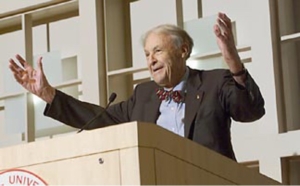 One of the three inaugural inductees for the decade of 1940’s is Dean Robert A. Beck ’42.
One of the three inaugural inductees for the decade of 1940’s is Dean Robert A. Beck ’42.
From the Cornell Chronicle by Susan Kelley at the time of Dean Beck’s passing in 2012:
“Beck led the school as dean from 1961 to 1981. During his tenure the SHA became known internationally as an important research center, doubled its undergraduate enrollment, launched its Master of Professional Studies program (now known as the Master of Management in Hospitality) in 1973 and fully developed its Executive Education program.
‘He was one of the most beloved figures in the history of our school,’ said Michael D. Johnson, (then) dean and E.M. Statler Professor of SHA. ‘He turned over the entire faculty, hiring formally trained academics in place of the operational practitioners of Dean H.B. Meek’s era. He emphasized research and raised the school’s international profile. He recognized early on the potential of the coming information age, introducing computing to the curriculum and, in tandem with the engineering school, the campus.’
After graduating from SHA, Beck served in World War II, losing a leg during the invasion of Normandy in 1944. He returned to Cornell, where he earned his master’s degree in education in 1952 and a Ph.D. in psychology in 1954. He joined the Cornell faculty in 1954, where he became a full professor of hospitality financial management in 1960. He was the youngest member of the faculty at age 41 when Cornell President Deane Malott appointed him SHA’s second dean.
In 2004 SHA dedicated an addition to Statler Hall as the Robert A. and Jan M. Beck Center, in honor of Beck and his late wife. It includes a lecture hall, two case study rooms, an expanded computer center, a three-story “curtain of glass” and study/meeting rooms. In 1984 friends and family established the Robert A. Beck ’42 Scholarship to provide undergraduate scholarships for students enrolled in SHA.
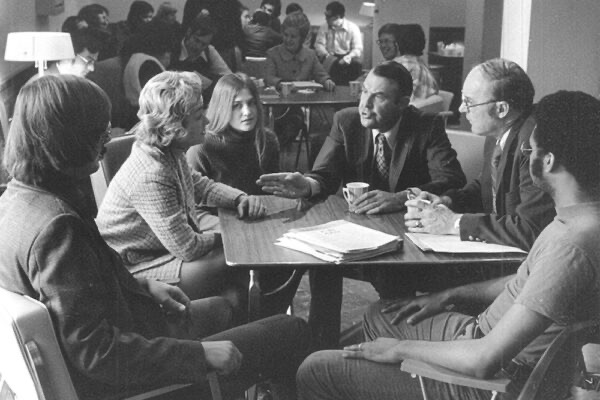 ‘Bob’s loss will be deeply felt by all alumni, faculty and staff who had the great fortune to experience his leadership as dean of the school,’ Johnson said.
‘Bob’s loss will be deeply felt by all alumni, faculty and staff who had the great fortune to experience his leadership as dean of the school,’ Johnson said.
From the Cornell Daily Sun on August 30, 2012, by Lauren Avery:
“…According to both current and former faculty, Beck had a profound impact on those he came into contact with during his time as dean. ‘He had personally — and he instilled in the school — a high level of expectation of excellence,’ said Prof. Emeritus Neal Geller ’64, hotel administration, who was named the first Robert A. Beck Professor of Hospitality Financial Management. ‘It made me really proud to be the first Robert A. Beck professor.’
Beck’s influence extended to the hotel school’s curriculum of which he expanded the scope to give students both an interdisciplinary and international research focus. He also integrated technology into the curriculum by incorporating classes on computing and by hiring faculty members with engineering backgrounds. ‘He took a technical and managerial approach to hotel management. He had a strong belief in that. There were five of us on the faculty who were Cornell engineers, and he liked engineers for the way we thought and the way we talked,’ said Prof. Emeritus Richard Moore ’67, hotel administration, whom Beck hired.
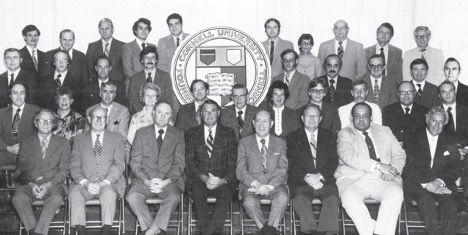
Beck established research partnerships in Latin America and France, including a joint masters program between several French universities and the hotel school, from 1979 until 2004. Beck also sent several Cornell professors, many of whom were on sabbatical leave, to teach there. ‘He did a lot to improve the faculty in terms of the professionalism of the faculty and the international stature of the school,’ said Prof. Emeritus Richard Penner ’68, hotel administration, who was hired during Beck’s tenure. ‘He was also interested in faculty doing research, but he made sure that teaching was still their foremost [concern].’
During his tenure, undergraduate enrollment in the hotel school doubled. According to Dean Michael Johnson, under Beck’s direction, the school particularly increased female involvement in hospitality at a time when the field was dominated by males. ‘The hotel industry was a very male-dominated industry. The perception was that you took a 14-year-old young man, made him a bellhop in a hotel, and over time he became a general manager in a hotel,’ Johnson said. ‘Dean Beck was the one who really started growing the number of women on the faculty and the number of women in the program … He was very proactive on the gender basis.’
Despite his numerous projects both at Cornell and abroad, Beck was known for spending much of his time interacting with hotel school students, both during daily coffee hours and down time between classes. ‘He certainly had stature, but he was friendly, and he tried to make it a point that he was accessible to students. He had an open-door policy,’ Moore said. ‘There was a chemistry class that was taught nearby, and students would come back from that class and pass the dean’s office. He always made sure that he was out in the hall at that time, working on the bulletin board or just standing there, so that students would see him, and he could say hello to them.’
According to faculty, Beck was also a dignified and authoritative leader. He expected professionalism from his peers but was also known for his sense of humor and friendliness, faculty said. ‘I was a former architect, and one day, I wore a brown leather jacket and a brown turtleneck, and I believe he said to me, “My, you look like an architect today”’, Penner said. ‘He mostly wore ties and was a pretty old-school guy who liked people to dress up to teach, but he was a great guy.’ Johnson, the (then) dean, said that he will most remember Beck for his charming demeanor and his humor, which endured into his old age ….. He just had a charm that would light up a room.’
Beck’s legacy at Cornell continues in the form of the Robert A. Beck ’42 Scholarship Fund, which was founded in his honor in 1984 to provide scholarships to undergraduates in the hotel school. In 1961, Beck, then 41, was the youngest member of the faculty when he was appointed the hotel school’s second dean and H.B. Meek’s successor by Cornell President Deane Malott. Faculty say that his impact on the school was immediate. ‘I have great admiration for him. He was a great orator, and he commanded respect, but he was not dictatorial,’ Moore, the professor hired by Beck, said. ‘I am amazed because we have had deans, and we’ve had three or four deans since him, but people always speak about “the Dean” with a capital D, and that was [Beck].’
“When I received information about the Cornell Hotel School in 1963, I contacted The School and was given time for an interview about admission. When I arrived and asked for the Office for Information and an Interview, to my surprise I was directed to the dean’s office. There stood Dean Beck and Assistant Dean Lattin, welcoming me, a young unknown man, as if I were an important guest. The interview became more like a friendly conversation and ended with Hans Weishaupt, ’64, being called to take me to dinner in the Statler restaurant. At the same time, Dean Beck asked Hans to give me solid information about life at The School. When I look back on this first meeting and the friendship I later gained with Robert A. Beck during my studies, by attending HEC, at the annual EMEA meetings and when he was dean of the Cornell program at ESSEC, I clearly see how he has lived up to E.M Statler’s adage “Life is Service” through all the years in service for the Cornell Hotel School and the Cornell Hotel Society!” Leif Reymert Evensen ’66, CHS Past President 2005
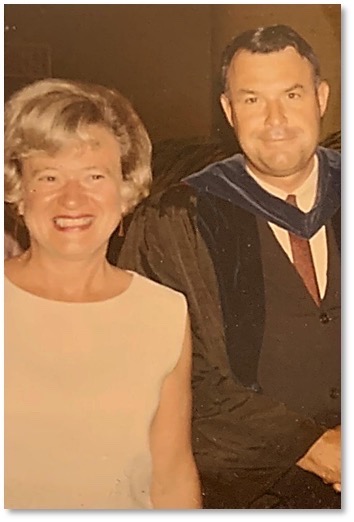 “Our most respected and beloved Dean Emeritus Robert A. Beck, and Mrs. Jan Beck would be the most formidable power-couple who ever assumed the Deanship together with ‘Mrs. Dean’, succeeding Dean Meek in furthering the process of making the Hotel School global, to be the Best in the World. Mrs. Beck had a very warm and welcoming demeanor toward all students. She was kind and attentive with remembering names with a caring fondness, especially to those of us who were foreign students from different countries, such as France, Switzerland, Holland, Japan, Germany, Hong Kong, The Philippines, Trinidad, Puerto Rico, Norway, Sweden, Finland, Greece, and Egypt at the time. She invited us to their residence for meals and barbecue, for those of us who also worked as waiters at banquets and in the restaurant.
“Our most respected and beloved Dean Emeritus Robert A. Beck, and Mrs. Jan Beck would be the most formidable power-couple who ever assumed the Deanship together with ‘Mrs. Dean’, succeeding Dean Meek in furthering the process of making the Hotel School global, to be the Best in the World. Mrs. Beck had a very warm and welcoming demeanor toward all students. She was kind and attentive with remembering names with a caring fondness, especially to those of us who were foreign students from different countries, such as France, Switzerland, Holland, Japan, Germany, Hong Kong, The Philippines, Trinidad, Puerto Rico, Norway, Sweden, Finland, Greece, and Egypt at the time. She invited us to their residence for meals and barbecue, for those of us who also worked as waiters at banquets and in the restaurant.
Dean Beck carried a regal comportment and a commanding stature particularly after his distinguished military service for which he was honoured. He was always dressed prim and proper in suits or sport jackets with his military service pin on the left lapel pin hole, with no facial hair, and his deportment was mostly attired with an assortment of bow ties. He would never allow his war injuries to slow him down from his international outreach programmes and affiliations with the hospitality industry and the US military establishments. He always addressed his office staff and colleagues as Mr. or Mrs., as in the case of Mrs. Farrell, and not Cherie. His memory of names was legendary and was most appreciative of students who worked either part-, or full-time. His iconic meeting and greeting salutations orally or in writing at times, with whom who came into contact at any level was in French, such as ‘Monsieur, Madame, à votre service, and Merci Beaucoup’ as the case may be. His service during the Second World War in Normandy, France had endeared him to the French language. He would never forget to thank others. At least with me in all cases in French. He somehow knew I spoke French.
Dean & Mrs. Beck in fact visited me and my parents and were invited to dinner at our residence apartment in Hong Kong. I thought they also wanted to find out more about the background of this foreign student who worked full-time at the Statler Inn that at the time was 36 rooms with the restaurant, banquet facilities, and the Ratskeller.
Dean Beck also unwittingly became the ‘official’ matchmaker for Michael and Shirley Chiu. Playing table tennis during coffee break in the old Student Lounge in 1964 with fellow student Hotelies, Dean Beck summoned me with his right index finger hook, in asking if I knew an applicant named Shirley Tung from Hong Kong. I respectfully answered, ‘No Dean, I don’t know this person, as there’re only 4.5 million people in HK. Why, is there a problem?’ He then answered, ‘This young lady is applying to the Hotel School. Please go upstairs to see Mrs. Edna Osborne in my office and obtain her address and write to her and tell her more what you know about the Hotel School and your student experience. I’m sure she and her parents will appreciate it’. Shirley heeded my advice to gain some industry experience and asked for an interview on campus. We met, and the rest is history after 54 years of wedded bliss now and counting.” Michael W.N. Chiu ’66, Chairman & CEO Prima Hotels & RIHP Group
(Michael was CHS Past President, Past Chairman of the Hotel School History Committee for 13 years who took up the book projects, “Hospitality Leadership” and “Hospitality Goes Global“. As Cornell Trustee on the Buildings and Properties Committee, he also chaired for seven years on the University’s Task Force on the Residential Community Initiative for the North Campus and West Campus expansions, including the expansion of the Robert A. and Jan M. Beck Center that won a design award.)
As a great commander, Dean Beck cared deeply for the people he led, the students, the faculty, and the alumni.
He was a hands-on commander. He interacted in person with the people he led.
He ran the School as a place of hospitality. Practicing everything he preached.
He stood tall for what he believed in. He had a vision for what the School could be. He held himself accountable and wouldn’t let others tell him how to run his business.
He built on Dean Meek’s legacy, and he left his own imprint on the School for generations to come.
Dean Beck was a father of 3 daughters, 7 grandchildren and 6 great-grandchildren who loved and respected both him and his wife enormously.
“Culinary Showman and Ringmaster”
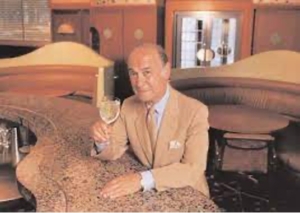
One of the three inaugural inductees for the decade of 1940’s is Joseph H. Baum ‘43
From the edibleMANHATTAN by Nancy Matsumoto
“The Legacy of Joe Baum
Joe Baum first saw the Rainbow Room in 1940, on a field trip with his freshman class at Cornell School of Hotel Administration, the upstate incubator for pro hosts. High atop 30 Rockefeller Plaza, then known as the RCA Building, the students’ focus was on stocking kitchen inventory and other back-of-the-house operations. But Baum, intent on seeing the elite supper club’s dining room, crept over to the service door and pressed his face against the window.
‘I saw this wonderful room,’ he recalls decades later. ‘I saw all the people of consequence being served in this great, glorious room. I knew that was what New York was meant to be.’
Baum would spend the rest of his life exploring his vision of what New York was meant to be, along the way becoming, in the words of food writer Mimi Sheraton, ‘the Cecil B. DeMille of restaurateurs,’ a man of lavish spectacle and over-the-top productions who transformed the restaurant industry into what it is today. Close to 45 years after that first glimpse of the Rainbow Room, Baum, by then the city’s earl of eateries, was called upon to oversee its $25 million overhaul; the shimmering Art Moderne palace that resulted became the masterwork of Baum’s storied career.
In between these symbolic bookends, Baum created a string of the most stylish, original and influential restaurants of his day, a total of 167 between 1953 and his death in 1998. For a time, a handful of his creations (notably) Windows on the World and the Rainbow Room, were the highest-grossing fine dining restaurants in the country. ‘Clearly Joe’s history is the history of restaurants in New York in the second half of the 20th century,’ says Tim Zagat.
Much of what diners now take for granted was born of Joe Baum’s fertile imagination. Although the term ‘theme restaurant’ cheapens Baum’s visionary conceptions and deeply researched menus—variously devoted to exotic cultures (the Hawaiian Room, La Fonda Del Sol), humble foods (the wurst house chain Zum Zum), or historic recreations (Forum of the Twelve Caesars)—he will forever be credited, or perhaps blamed, as the originator of this trend.
In the late ’70s and early ’80s, long before ‘locavore’ entered the lexicon, Baum’s Market Bar and Dining Rooms in the concourse of the World Trade Center listed local meat, seafood and produce purveyors, and brunch could begin with a bag of freshly picked peas in the pod. At Baum’s Kansas City establishment, the American Restaurant, chef Bradley Ogden was cooking with local produce and serving up Missouri ham.
Baum exorcised the tired conventions of the fancy continental restaurant by throwing away menus in French and, along with them, the snooty term ‘sommelier.’ He slipped lowbrow puns and winking allusions into his graphically innovative menus (the Mushrooms of the Sincere Claudius—An Emperor’s Delight at the Forum of the Twelve Caesars was one example), but also introduced Americans to quality domestic wines and exotic foreign ingredients. At his French restaurant, Aurora, Baum suggested that the young bartender Dale DeGroff study America’s earliest cocktails. DeGroff took the idea and ran with it, updating the old classics and eventually playing midwife to the modern mixology boom. Baum also pushed small plates at the bar to help boost drink tabs, presaging our love for tapas-style grazing. For better or worse, he brought informality to the fine-dining experience, even urging wait staff to introduce themselves to diners by their first names.
No purse was too big or too small for Baum to court, and no palate too refined or rustic, either; he served roast loin of veal with anchovy hollandaise to the titans of Wall Street, media and advertising at the Four Seasons, and home-style canned tuna with cannellini beans and iceberg lettuce at the raucous Mama Leone’s in the theater district.
Today many of Baum’s most famous creations are gone, yet his legacy lives on. In April (2003), the Manuscript and Archives Division of the New York Public Library opened to the public the Joe Baum Papers: 1934–1988, an extensive trove of 158 boxes of material including sample menus, correspondence, articles and ephemera donated by Baum’s children. In March (2010), a panel discussion on Baum’s impact in the restaurant world convened at the New School, featuring Michael Whiteman, Baum’s business partner from 1970 to his death; Milton Glaser, Baum’s favorite graphic designer and longtime collaborator; and architect Hugh Hardy, who worked on the redesigns of the Rainbow Room and Windows on the World.
(To watch a video recording of this panel discussion, https://www.youtube.com/watch?v=LjfgHlvFzqo )
Danny Meyer (who, along with Jeffrey Chodorow and Steve Hanson, has inherited Baum’s restaurant impresario mantle) says of Baum, ‘He was the first restaurant professional I knew of who proved you could have more than one fine dining restaurant. The previous wisdom was that there were two kinds of restaurateurs: chain operators and one-of-a-kind fine dining restaurants. He showed you could really blend the skills, to conceive fresh, forward- looking restaurants and set up teams of professionals who could operate more than one with excellence.’ Meyer adds, ‘I still have a world of respect for the restaurateur who has one great idea and devotes his whole life to that one great idea…but Joe was a force of nature who just could not contain his own imagination. He had to find an outlet for all his ideas, and we’re lucky for it.’
The man who so recreated America’s restaurant landscape in his own image, and whose paper trail now lies preserved alongside those of H. L. Mencken and Herman Melville, was born into the business in 1920 in Saratoga Springs, where he spent the summer months at his parents’ Gross and Baum Family Hotel. Back then, Saratoga Springs was the freewheeling watering hole of the rich, where mineral baths, gambling, horse racing and the workaday life of kosher innkeepers provided a mix of high and low that Baum relished. At age 10, in addition to working in his parents’ hotel pantry, he sold racing track scratch sheets, worked as a betting ring messenger, and played nickel roulette.
In a 1978 interview, the veteran restaurateur recalled his hormonally charged teen years: ‘I was 14 and my voice was changing. My parents put me to work in a big kitchen with wooden floors and windows. I was hooked. In love with the smells and the tastes, with the waitresses and the pantry girls.’ Baum’s visceral, consuming love for restaurants was always rooted in the sensual: ‘I lust after their drama, their ambience, their professionalism, and their foodgloriousfood. I hunger, not for the thematic recreations…but for new pulses of pleasure that restaurants alone can bestow,’ he said.
At Cornell’s hotel school, his gambling skills kept him flush with cash his freshman year, but eventually put him in debt to ‘some guys with broken noses from Syracuse.’ In the summer of 1941, he found a convenient escape at the Fort Benning Officers’ Club in Georgia, where he and a hotel school pal improved service by introducing a grill and replacing the former field hands who served as waiters. ‘We had a variety of beautiful women who provided a variety of services,’ Baum said. The full-service concept was a hit with officers but not with the club administrator and Baum was fired. He joined the navy in 1943 and served as a supply officer aboard a destroyer in the Pacific during the war.
Soon, stints at Harris, Kerr and Forster, an accounting and consulting company for hotels and restaurants; with the theatrical and industrial designer Norman Bel Geddes; and as manager of the Monte Carlo restaurant for real estate mogul William Zeckendorf gave Baum the ability to absorb restaurant financial sheets at lightning speed, a lifelong love of good design, and an obsessive attention to detail. At the Schine Hotel chain in Florida, Baum became director of restaurant operations. Miami, says Tony Zazula, who headed catering and sales at the Rainbow Room and became a trusted advisor to Baum, ‘had a huge influence on Joe’s ideas about theatricality, entertainment and social interaction, how to make restaurants exciting.’ It was while he was at Schine that Baum was hired by Restaurant Association and lured back to New York.
Baum made his first big splash not in Manhattan, but over at Newark Airport, where RA tasked him with the challenging, oxymoronic assignment of establishing a New Jersey fine-dining restaurant called the Newarker. It was here that Baum first deployed fire, literally, in the form of flaming shish kebabs and a parfait erupting with sparklers. Flaming dishes became one of his signatures, and he explained his penchant for them: ‘Customers like to see things on fire…and it doesn’t hurt the food much.’
Pulling out all the stops to lure both air and highway travelers to the Newarker, Baum added large portions to the pyrotechnics, such as the catchy ‘three-claw lobster’ (a lobster-and-a-half), the too-big-to-slurp ‘knife-and-fork’ oyster and the baker’s dozen of oysters, where the 13th oyster arrived on a separate plate to make the house’s generosity perfectly clear. When Restaurant Associates lost $25,000 its first year, Baum and his Swiss-born chef Albert Stockli didn’t cut spending but continued to add value to their offerings. By the mid-1950s, the restaurant was grossing over $2 million a year.
This success marked the beginning of Baum’s glory years with Restaurant Associates. The Hawaiian Room at the Lexington Hotel, the Forum of the Twelve Caesars at Rockefeller Center, the Four Seasons, the Brasserie and La Fonda Del Sol followed in the late ’50s and early ’60s. It was with these projects that Baum’s mania for research took root. During the two-year preparation for the opening of the Forum, he read the Roman food writer Apicius, instructed his staff to study Robert Graves’s translation of Suetonius’ The Twelve Caesars, and brought in a Hunter College classics professor to lecture the staff on ancient Roman culture. These exercises were complemented by the first of what became a tradition of lengthy research trips to foreign lands, what Gael Greene calls ‘those extraordinary food boondoggles where you could go anywhere and chase anything and take forever.’
To research the Forum of the Twelve Caesars, Baum and his inner circle embarked for Rome, Pompeii, Herculaneum, and Milan to soak up history, food and culture, as well as visit china factories, silversmiths and glass blowers. It was in Italy that Baum developed his love for black bespoke Brioni suits, ‘his armor,’ according to David Risk, a former junior ad man for Baum who is now writing a biography on the restaurateur.
The grandeur of ancient Rome was an ideal match for Baum’s unbridled vision and ambition: his inspiration manifested itself in such appointments as purple and red velveteen waiters’ jackets, helmets used as ice buckets, men’s room spigots shaped like Roman emperors and the fabulously expensive copper service plates fine-tuned to turn Bacchus’ leer into a smile. In a bit of typically Baumian hyperbole, the maestro described his creation as ‘a club of Roman emperors, Rockefeller Center Roman emperors—enjoying the lusty splendors of that period.’
Baum was the poetic wellspring, the general and conductor of his ambitious undertakings, operating with equal skill in both the front and back of the house. He conceived of himself as being not in the restaurant business, but in the business of pleasure. People stepped into the fantasies he created not because they were hungry, he insisted, but for the spectacle. Therefore, every detail—from the menu’s paper stock and shape of the flatware to the buttons on the made-to-measure waiter’s costumes—had to be exquisite, one-of-a-kind.
‘Joe showed that high design, zippy menu language, great graphics, fully developed concepts and lots of razzle-dazzle on the plate—all of it done supremely well—could replace the personality of an owner with a personality of style,’ says Whiteman, who continues to run Joseph Baum & Michael Whiteman Company, a boutique restaurant consulting firm with a worldwide reach. ‘Once you grasped this, you could open multiple places,’ Whiteman adds. ‘That cleared the way for today’s restaurant groups—the Danny Myers, the Drews [Nieporent], the Daniels [Boulud] and Jean-Georges [Vongerichten], the Stephen Hansons—who have profitably adapted that formula.’
In his recent book Appetite City, William Grimes quotes Whiteman describing the impresario’s knack for ‘putting a lot of talented people together…food people, ad people, artists, graphic designers.’ The research, said Whiteman ‘was not to develop a slavish authenticity but to ferret out something obscure, surprising, delightful.’
The menu consultants on Baum’s team became, if they were not already, leading names in the food world: James Beard, Jacques Pépin, Barbara Kafka and Rozanne Gold among them.
In comparison to the saturnalian excesses of the Forum of the Twelve Caesars, the decor of the Four Seasons, which took two and a half years to plan and cost $4.5 million, was a model of restrained elegance, in keeping with the character of Mies van der Rohe’s Seagram Building. Baum’s good friend, House Beautiful editor Elizabeth Gordon, had introduced him to the Japanese concept of shibui, and Baum was taken with this idea of understated elegance, of quality that does not call attention to itself. He adopted the name of the restaurant from a book of haiku and suggested changing the entire decor of the restaurant—from plants, menus, waiters’ uniforms and ashtrays, down to the color of the typewriter ribbons—with the advent of each new season. Decor included a Picasso curtain depicting a bullfight, tapestries by Miró, ceiling sculptures by Richard Lippold and chairs designed by Philip Johnson (also the restaurant’s designer) and Eero Saarinen.
The food was to be equally refined, predominantly American, and seasonal: a beefsteak tomato, carved tableside; dandelion and egg, or simply prepared main courses such as ‘brochette of young pork with spiced crab, apple and onions’ or ‘tournedos of beef with woodland mushrooms.’ Menu consultant James Beard, who was already considered the dean of American cooking, fantasized about blueberry slump and luscious crab cakes and reported to Baum on a lamb ragout he had tasted “so wonderful you just wanted to cuddle it in your arms.”’ In her book Eating My Words, food writer Mimi Sheraton, who also served as a consultant for the Four Seasons, recalled researching obscure ethnic food lore and searching for such produce as radicchio, mâche, fiddlehead ferns and ramps when even gourmet food markets of the day carried little beyond iceberg, endive and bibb lettuce. The oversized menus (which introduced the now-iconic tree logo designed by Emil Antonucci) were printed on vellum and covered with silk-threaded Japanese rice paper; very shibui. They were also very expensive to produce.
Baum, displaying the tyrannical side that could make employees quake, told a purveyor who promised morels, ‘If I print them on this menu, you better find them even if you have to grow them in your armpits,’ Sheraton recalls in Eating My Words (the mushrooms were eventually sourced from composer John Cage who was raising them at the time in Upstate New York). By then, it was apparent to a growing number of people that Baum was a kind of restaurant savant, a showman and a genius with an obsessive mastery over every aspect of the business. Glaser, a legend of graphic design, told the (same) New School audience at the (2010) Baum panel discussion, ‘I learned more about design from Joe than any other person.’
Baum’s son Charles believes that if his father had not (gotten into the) restaurant (business), ‘he would have been an extraordinary stage director, or perhaps film director or composer.’ Adds Charles, ‘He literally had an ear for the business. I remember him saying to me, ‘”Listen to the noise in the room, feel the sound. It’ll tell you how your guests are feeling.” He could tell which area was having the pleasure, which was feeling the pain.’
‘He could really see things in an entirely different way,’ says Irena Chalmers who spent 15 years as Baum’s scribe and speechwriter.
‘He could visualize a new place, he could hear the people speaking, see the traffic pattern, smell the food.’ Many of Baum’s associates have commented on his unique way of communicating, which they describe using adjectives ranging from ‘incomprehensible’ to ‘abstract.’ Baum’s poetic, stream-of-consciousness musings and non-sequitur demands drove some employees crazy, especially after being trapped with their chain-smoking boss in endless meetings and left holding little but hazy, nicotine-infused impressions. Because Baum’s genius was of an emotional, aesthetic and primarily visual nature, he found kindred spirits in his most accomplished designers and visual artists, most notably Glaser.
Baum worked seven days a week and never went anywhere without his bulging briefcase, yet his wife, Ruth, was always by his side as he made the rounds of his restaurants in the evenings. Weekends were spent at the family country home in northern Westchester, where the food was simple, seasonal, and primal. Charles recalls, ‘There was a lot of bare-knuckled eating. Our hands might be wrapped around some thickly sliced tomato on whatever the bread of the moment was, laden with watercress from the stream, some sliced onion. There was always a “gracious amount” of beverage, a lot of champagne, wine, it didn’t matter what time of day.’ Ruth and Joe were known for throwing ‘huge, crazy family parties,’ that corresponded to the lavish bashes Baum was famous for staging at his restaurants, says daughter Hilary. Sometimes Baum house parties ended with wild food fights, which, according to Charles, were usually instigated by his father.
Despite the good times, having a dad who was described as a tyrant even by employees who gladly swore lifelong fealty to him could not have been easy. Both Hilary and Charles describe their father as ‘very challenging’ as a parent, an intensity diluted only by the fact that he was always at work. On those occasions he was at home, he often summoned the family to the dining room table to show them architectural plans and concept papers for his latest project.
It seems his brain was always generating blueprints. Tim Zagat recalls being on the restaurant industry host committee for the 1992 Democratic National Convention in New York City with Baum. Their job was to create favorable press for the city by being good hosts to the hordes of delegates and media in attendance. ‘Joe was incredibly creative and had these unbelievable ideas,’ recalls Zagat: Baum dreamed up a Rockefeller Center display that involved a four-story high sculpture made of bread on one side of the central plaza, a three- or four-story ice sculpture on the other (with no thought to summer temperatures), and in front of 30 Rockefeller Plaza, an eight-story-high ‘Big Apple’ composed of fresh apples speared with metal prongs. ‘He had these fabulous ideas that he could visualize in his head, but absolutely no sense of the financial side of it,’ recalls Tim’s wife and guide cofounder Nina Zagat. In (1992, to highlight NYC’s hosting of the Democratic Convention), Baum and Tim Zagat came up with one of the enduring traditions of the city, which has since spread across the country and world: Restaurant Week, featuring a three-course meal at a roster of fine-dining restaurants for only $19.92. (Inflation has gotten the better of Restaurant Week: Winter 2010 lunches were up to $24.07, not $20.10)
The irony was that despite his fluency with numbers (he devoured financial sheets ‘like a novel,’ says Baum’s son Charles), Baum had no interest in sticking to a budget. ‘He felt that money wasn’t very interesting,’ says Chalmers. ‘It was the idea that was the challenge, and it didn’t really matter to him what it cost.’ Tim Zagat adds, ‘Joe never did anything under budget.’ It was a trait that liberated Baum creatively but would play a part in the abrupt end of his career at Restaurant Associates.
By 1970, a number of RA’s acquisitions had fallen flat, along with its stock price, and the company was more intent on saving its shirt than blazing a trail. There was no longer room for Baum’s approach of excellence at any cost. Although he had been instrumental in turning a sleepy chain of coffee shops into a $100 million juggernaut, he was cast out. In an elegiac New York Magazine appreciation, Gael Greene wrote, ‘This was the man whose ego, taste, drive, showmanship and capacity to terrorize and ingratiate had set a new style in American restaurants.’
Cut loose from Baum’s obsessive oversight, his creations floundered. La Fonda del Sol—the super-nova of a restaurant designed by Alexander Girard, featuring smart waiters’ uniforms by Rudi Gernreich and stuffed with folk art and pottery—was sold. The restaurant that had introduced New York to authentic pan-Latin cuisine (baby turkey in spicy mole sauce, in the early ’60s) was reduced to a pedestrian Tex-Mex joint. The Four Seasons, Greene noticed, began to show signs of fraying due to budget reductions.
Irena Chalmers says that Baum, then 50, was ‘deeply wounded’ by his split with RA; Greene recalls, ‘The vulnerability of Joe Baum was so appealing…. To be bounced from a company where you have created a huge number of original concepts must have been the most traumatic thing. You start to wonder, ‘Is it me?’’
But within a matter of weeks, Baum would come roaring back, landing the Port Authority contract to develop all 22 restaurants in the new World Trade Center. The massive job included devising a complex of restaurants called Market Square down below and the 107th floor showpiece, Windows on the World. Combined, they served over 25,000 covers each day. In one Market Square restaurant, the Big Kitchen, Baum paid homage to the old Washington Market—which had been razed to make way for the Trade Center—by creating market-style food stalls. Windows on the World opened in 1976 and was an instant hit. A New York Magazine cover headline swooned, ‘The Most Spectacular Restaurant in the World,’ called Baum ‘brilliant’ and his aerie overlooking a crumbling lower Manhattan a ‘masterpiece.’ Windows became one of the highest grossing restaurants in the world.
The only one of his restaurants that Baum ever owned was the 125-seat French restaurant Aurora, which opened in 1986. Despite earning three stars from the Times, it closed five years later. One reason was that Baum was busy throwing himself into the project he had coveted ever since that starry-eyed day back in 1940: the massive renovation of the Rainbow Room.
Baum hired Broadway costume designer Carrie Robbins and three assistants to tailor the waiter’s uniforms, Hugh Hardy to revive the Art Moderne decor, a lighting designer, music director and of course Milton Glaser. He had the carpet specially woven to match the 1934 original’s motif, and the walls covered in aubergine silk. The sawtooth designs on the waiter’s uniforms matched the plate design, and the small corner chandeliers echoed the grand chandelier over the dance floor. Over the bar, Baum hung a model of a streamlined ocean liner designed by Norman Bel Geddes, bringing his career full circle, back to one of his early influences. When the moody, sensual room opened in 1987 to universal accolades, one critic described it as a ‘crystal vault of enjoyment.’
The Rainbow Room was Baum’s crowning achievement. ‘It was such a gift to the city, and I think it gave him particular joy,’ recalls Hilary Baum.
Baum also hired his son Charles to serve as general manager of the Rainbow Room. It’s no surprise that in addition to Charles, many Baum offspring went into food-related businesses. Hilary became a leader in the farmers market movement; her seminar series called the Baum Forum focuses on preserving a healthy, diversified food system. Hilary’s daughter Annie c0-owned and operated Milk and Honey, a locavore café and store in West Philadelphia, and her son Alex is project manager for the BLT restaurant group. Although Charles retired from the restaurant industry to resume his career as a photographer, he participates in it vicariously through the work of his wife, prominent (hospitality) publicist Jennifer Baum.
Baum’s last major restaurant job was to oversee the $25 million 1996 reopening of Windows on the World after the first terrorist bombing. He was suffering from the prostate cancer that would eventually kill him, yet still managed to oversee every last detail of the project, from the crystal balustrades to the Milton Glaser screen behind the front desk.
Tim Zagat recalls the lavish, celebrity-studded memorial for Baum, held at Town Hall in 1998. ‘Everybody who had done anything—not only in restaurants, but in theater, the arts—was there. It was a really big, very special turnout. It was phenomenal because Joe was phenomenal. The only thing,’ adds Zagat, ‘is that if Joe had planned it, it would have been bigger and better.’”

Drew Nieporent ’77 with Joe Baum ‘44
From the New York magazine on October 26, 1998, by Gael Greene:
“Remembering Joe Baum
We who are his survivors are anxious about confronting the millennium now that Joe Baum isn’t staging the party. There would have been caviar, rainbows, Rockettes, perhaps a flight into outer space. Extravagance was not an issue. It’s easy enough to say his death ends an era. True, “the end of an era” looms at least once a week in the obituaries. But Joseph H. Baum did invent a new way to feel about dinner. He got people to come to eat at the Newark Airport by flambéing everything in sight. (‘When in doubt, flambé,’ he said.) He went on to whip up a parade of legendary spots for Restaurant Associates that made dining theater: the Hawaiian Room, The Four Seasons, the Forum of the Twelve Caesars (a Roman theme park with silver gladiator helmets as ice buckets).
It cost $7,000 just in overtime to change the Philip Johnson-designed Four Seasons from fall to winter in Baum’s reign. Flowers were forced to bloom, and the whole caboodle – uniforms, the upholstery of the banquettes, cummerbunds, matches, ashtrays, the color of the typewriter ribbon – went from rust to gray. Style was all. Nothing would be served in an old-hat way. The ritual of pouring wine at the Forum was different from the pouring style at The Four Seasons. He was a sweetie and a despot. ‘Let’s go out and kick shit,’ he’d say, touring the empire.
So much extravagance and red ink finally took a toll on Restaurant Associates stock. The bean counters had taken over and unceremoniously dumped Baum in 1970 when I first interviewed him for a piece New York would call ‘Twilight of the Gods.’ We lingered till 5 p.m. over lunch at the once-mythic Quo Vadis (now long gone). Dazzled by his musings, I filled my notebooks, but later, transcribing my notes, I couldn’t extract a single sentence with a subject and a verb. Weeks later, the Transit Authority hired him to consult on feeding plans for the new World Trade Center. Thus began the long, tortured comeback. In May 1976, with the city on the verge of default, Windows on the World was unveiled – so ambitious, every view brand-new, a symbol of survival.
Uptowners who never ventured below Saks were pulling strings to get a table. Baum was a natural then to gussy up the Rainbow Room in 1988. He rescued the great born-again beauty from dowdy neglect, getting architect Hugh Hardy to redo her cheekbones – raising floors to better the view, reviving old-fashioned cocktails, and raking in profits.
So good-bye to roller-coaster triumphs and despair, irreverent wit and mischief, cigarette girls and teddy bears in black tie. Good-bye to the thrift-shop chapeau he used to send every year, and the glittering parties he threw to raise money for Citymeals on Wheels. His inspiration remains. He left enough ideas to borrow for a century to come.”
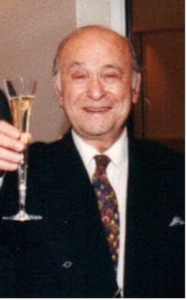
A tribute from one of the best restaurant operators of all time:
“Joe Baum was a rare breed of restaurateur, who could create exciting concepts and then operate them with perfection. He is credited with developing the first ever, theme restaurants. His restaurants consistently drew acclaim, even in a hard-to-please market like NYC.
The Tower Suite was a private club at lunch, and then at dinner, it turned into a semi-private dining room where the servers were dressed as maids and butlers and wore white gloves. La Fonda Del Sol was one of the first major Mexican Restaurants in NYC. To add to its’ authenticity, he had a Mariachi Band wandering through the dining rooms. The Four Seasons Restaurant was the epitome of gracious dining. Designed with ultra-high ceilings; loaded with fresh flowers and a long pool garden in the middle of the dining room. Tables were spaced far apart, and it became the epicenter of expense account deal making. It was one of the most expensive restaurants of its time, yet reservations were difficult to get.
Mama Leone’s was a large, 800+ seat restaurant, in the theatre district, and geared to serve the theatre crowd. The menu of Italian comfort food was designed to be served quickly, but not at the expense of quality. Roving minstrels, playing mandolins, violins, and guitars, would stroll through the many dining rooms, singing and entertaining.
Other restaurants he created were The Forum of the Twelve Caesars; Trattoria; The Brasserie; Windows on the World, the Rainbow Room, and numerous others.
He was known to take a crew of associates to foreign countries, for weeks on end, in order to research concepts and ensure they were authentic. His keen eye for detail was one of the elements of his success.
Joe Baum was an iconoclast who wanted to be different from others. He certainly made his mark on the restaurant industry, and he is credited with making Restaurant Associates the powerhouse restaurant company of its’ era.”Burton M. “Skip” Sack ’61, Former Chair, National Restaurant Association
From one of the king/queen makers of the restaurant industry:
“While attending Cornell’s Hotel School in the 70’s with aspirations of becoming a restauranteur, Joe Baum was my idol. Joe created the most stylish and original New York restaurants of his era and developed four of the highest grossing restaurants in Manhattan, Windows on the World, the Rainbow Room, the Four Seasons and Tavern on the Green. Joe epitomizes what a Hotelie Hall of Fame inductee represents. His influence on many generations of Hotelies and restauranteurs will be felt into eternity.” Court Williams ’78, CEO HVS Executive Search
From a legend of the finer dining experience:
“Ode To Joe Baum
June 1964 I had just returned from Liberia where I worked for Pan Am for a year. I had gotten an interview with Mr. Joe Baum, by telling his secretary I went to Cornell and I know he had also. I wanted to work at the Four Seasons (Restaurant).
The interview lasted about 15 Minutes as his piercing eyes looked me over and my resume. He finally said, ‘you went to Cornell, you can start as assistant receiving steward at the Four Seasons Monday for $125,00/week.’ My rent was $130.00. ‘You have to start at the bottom, I don’t care what you learned in college, or Pan AM. Take it or leave it..’
He was always short, meticulous and to the point…
Restaurant Assoc. was created by Joe Baum and Jerry Brody (they were brother-in-law). was the definitive restaurant company of the 60/70. Baum was the creative genius and Brody was the financial brain…
Working for Mr. Baum was a challenge, you always had to be on top of your game, he demanded more than a 100%, he could make grown men cry. My then boss Mr. Stuart Levin would almost shake when Joe came in the building. He would say very little but when he spoke it was measured and always pretty correct. He knew how he wanted things, and they always had to be perfect.
Look at all the restaurants he created that have never been able to be duplicated, The Forum of the 12 Caesars, the Fonda Del Sol, The Tower Suite, Charley Brown, Zum Zum. All so imaginative, great designs, wonderful food, great service. He was way ahead of his time in dining.
He knew how to pick the staff, the managers that came out of RA all had great careers. Paul Kovi, Tom Margittai, Lee Hardy, Tony May, Stuart Levin, just to name a few.
I will always remember Uncle Joe as many of us called him, I remained about five years with RA until Joe Baum and Jerry Brody split due to divorce. I ended up with Jerry Brody.
I will conclude that those of us who have worked for Mr. Baum will never forget it. His work ethics remained with me all through my professional career.
Cornell (Hotel Society) by choosing him is finally doing the right thing. He should have been recognized a long time ago. The press never I feel gave him the dues and respect he deserved.” Patrick Terrail ’64, Founder and owner Ma Maison, Los Angeles.
After his death in October 1998, Joe’s three children — Hilary, Charles and Edward — served on the board of directors of the family-owned restaurant group for several years until its sale. They continue to advise on projects documenting their father’s legacy in the hospitality industry. Hilary and Edward are both graduates of Cornell Arts & Sciences (’69 & ’78). The family also endowed the Joseph H. Baum ’43 Scholarship, which provides undergraduate support to students enrolled in the School of Hotel Administration.
Joe Baum had a long list of “first to …” because he always wanted to do something different. He accepted no precedents. For him, nothing was ever finished, everything was a work-in-progress. His work were “endless beginnings”. He transformed the restaurant industry like Cirque du Soleil transformed the circus industry.
Joe Baum thought of himself as a restaurant worker. “I feel very comfortable with the people I work with. I love them.” Said Joe. He acted like a movie director telling each employee the entire story is riding on their one single character. He wanted from employees that special something he can’t quite articulate yet. He let them figure it out for themselves. No one ever wanted to disappoint Joe whether it is out of fear, love, respect, personal pride, or all of the above.
Joe Baum understood pleasure. He approached his creations holistically with attention to every aspect of the evocative experiences. Like a symphony orchestra, every note must be hit exactly right at the right time. He didn’t consider himself a businessman although his businesses were extremely successful because he created pleasure for his customers.
“Keeping The Best Home for All Her Guests”
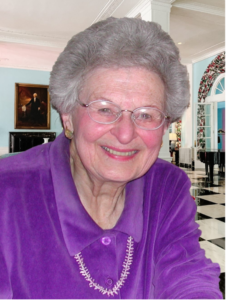 One of the three inaugural inductees for the decade of 1940’s is Margaret “Maggie” McCaffrey Kappa ‘44
One of the three inaugural inductees for the decade of 1940’s is Margaret “Maggie” McCaffrey Kappa ‘44
Margaret McCaffrey was born into a third-generation hotel family in Wabasha, Minnesota in 1921. The Anderson House, built in 1856, was purchased by the Anderson family in 1909. Maggie, as she was affectionately known, worked in the family-owned hotel as a youngster. Maggie was encouraged by her mother Verna May (née Anderson) to apply to the Hotel School at Cornell University. Before she was allowed to enroll, her mother spoke with Dean Meek, the School’s first dean, at a Hotel Show in Chicago. Meek told her mother, “Not many women entered and that they either flunked, left, or got married.” However, at her mother’s urging, Meek agreed to let Maggie enroll. Maggie graduated from the School of Hotel Administration in 1944. There were only two other females in her class of 42 students. Almost forty years later in 1980, Margaret McCaffrey Kappa was the first female elected president of the then Cornell Society of Hotelmen.
After Cornell, Maggie held executive housekeeping positions at the St. Paul Hotel and the Plaza Hotel, both in New York City. In 1957 she was hired by E. Truman Wright ‘34, a fellow Hotelie Hall of Fame inductee, to be Manager of Housekeeping and Decorating at The Greenbrier Resort, located in White Sulphur Springs, West Virginia. There she worked closely with famed interior designers Dorothy Draper and Carleton Varney.

Per her son Nicholas, “Maggie was often referred to as “The First Lady of Housekeeping” and “The White Glove.” She took great pride in what she did, it was that she knew nothing less than perfect would do for the guests of The Greenbrier.” From its beginning, and especially during Maggie’s tenure, The Greenbrier was known as a playground for “the rich and famous.” Presidents of the United States were frequent visitors, along with well-known celebrities, and sports figures. Princess Grace and Prince Rainier of Monaco and the Duke and Duchess of Windsor were frequent guests. Debbie Reynolds and Eddie Fisher spent their honeymoon at The Greenbrier as did Joe and Rose Kennedy, parents of US President John F. Kennedy. Three 18-hole championship golf courses and long-time golf pro Sam Snead drew top golfers to White Sulphur Springs. Bankers and businessmen, politicians and executive level government officials took advantage of The Greenbrier for high level meetings. The Greenbrier was “the place to be!” Margaret McCaffrey Kappa was the one responsible for keeping The Greenbrier in the pristine condition her guests expected.
After retiring from The Greenbrier in 1983, Maggie founded the consultancy firm Hospitality Housekeeping. In addition to working with numerous hotels, she was a summer consultant at the historic Grand Hotel on Mackinac Island, Michigan for twenty years. Her career spanned six decades during which she received many accolades, including a Diploma of Honor from the Société Culinaire Philanthopique. She was named consistently to Who’s Who of American Women and the World’s Who’s Who of Women.
Margaret M. Kappa co-authored several books including “Managing Housekeeping Operations” and “Housekeeping Management,” both published by the American Hotel and Lodging Association.
By the time Maggie retired from the Greenbrier she had raised two sons, Nicholas and Christopher, and adopted West Virginia as her home. She was very active and well known in the community of White Sulphur Springs. She loved to sing and sang in the choirs at both the Catholic Church and the Methodist Church every Sunday and participated in the activities of the ladies of the Episcopal Church. She was the “story lady” every week at the elementary school and volunteered at the after-school program at the Methodist Church. Everyone in town knew who she was and enjoyed being in her company wherever she went.
Maggie was often quoted as saying, “I know I never would have had the success I enjoyed without my Cornell degree.” She loved Cornell and tried very hard to return to Ithaca every five years for reunion weekend. At her 60th and last reunion she was thrilled to be asked to carry the Class of 1944 banner in the parade of classes. She considered that honor as the ultimate confirmation of her success as a graduate of Cornell University and the School of Hotel Administration.
“I worked with Margaret and learned much from her, both as a GM then later as CEO. Her management style was unique. Her sense of humor was just delightful. The rank and file loved her, and their respect for her was equal to their adoration. In a challenging, sometimes militant, trade unionist environment that was not just unique, it offered me a post-graduate course in labor relations.” Ted Kleisner, Director of Operations, General Manager, 1980-1984, Vice President & Managing Director, President & CEO, 1987-2006, The Greenbrier
“Little did I know when I worked as a summer trainee at The Greenbrier that I would never again see a Housekeeping Department like Maggie’s.
Everyone knew their job, and everyone wanted to do it. Wow, what a concept!
Maggie was an inspiration to the entire Management Team at The Greenbrier as well as her own Department. A great organizer and team builder . . . every task, be it daily, weekly, monthly, or seasonally, was scheduled and carried out as it ideally should be. Dorothy Draper designed and furnished a magnificent hotel, and Maggie extended the life of all those beautiful furnishings well beyond their normal lifetime.
Her staffed adored her and it showed. And she took time for everyone, even an undergrad summer trainee. I learned how to make beds and wash baseboards, but mostly I saw how she inspired people to do their very best.
Legend has it that Maggie started a book called ‘Top Sheet Down’. This was to have been a writing of her Life and Experiences in The Hospitality Industry.
After retiring from 20 years (perhaps longer ) at the Greenbrier, Maggie took a one-month assignment at The Grand Hotel in Michigan to help train a new Executive Housekeeper. She made such an impact on the entire hotel, the owners talked her into staying there another 20 years . . . as an adviser to the new Executive Housekeeper she trained.” Michael L. Pleninger ’63, Chairman, Newport Hospitality Group
“Margaret “Maggie” McCaffrey Kappa was a true inspiration in her leadership and contributions to our industry. Was so impressed how she broke through as a female student at the Hotel School and ultimately the first female President of the Hotel Society in 1980. Such a proud Cornellian – she truly loved the Hotel School.
The work she did as the Executive Housekeeper for the Greenbrier hotel was impressive – such a famous institution known for excellence, with 710 rooms, 33 suites and 11000 acres (sure she also kept the Bunker in good shape too!). You can only imagine with the nicknames of “White Glove” and the “First Lady of Housekeeping” what her expectations were when she entered the hotel each day. In talking with those that knew her she did this with a very supportive caring style, who truly enjoyed teaching and mentoring those around her for them to achieve success. She truly lived by the Golden Rule and inspired excellence in all her teams. So great to see her receive this recognition.” Scott Taber 85’, SVP Global Hospitality, Four Seasons Hotels and Resorts
Maggie’s potential was not fully realized by an industry and a society which saw women in limited roles. Maggie did not allow anyone to be limited with what she created in her role. She didn’t just do the best she could, she did it better than anyone else, man or woman. Imagine if her contribution were not limited in anyway. Imagine the contributions she could have made. She was ready to do the greatest good.
“Trailblazer in Her Professional Life and Service to Cornell”
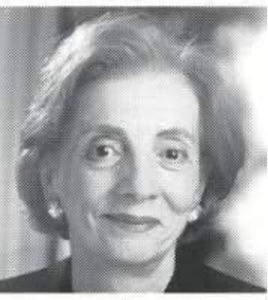 One of the three inaugural inductees for the decade of 1950’s is Lilyan H. Affinito ’53.
One of the three inaugural inductees for the decade of 1950’s is Lilyan H. Affinito ’53.
From the Cornell Chronicle on July 12, 2018, by Kate Klein
“Lilyan Affinito leaves a legacy for women in leadership
Trustee emerita and Presidential Councillor Lilyan Affinito ’53, a staunch advocate for including women in leadership roles at Cornell and excellence in the professional realm, has died at the age of 86.
A longtime resident of New York City, Affinito died June 29 near her birthplace in the Pittsburgh area.
Affinito leaves a legacy for women in leadership. She earned a bachelor’s degree in hotel management from Cornell’s School of Hotel Administration, followed by a master’s degree from the University of Pittsburgh. She began working at Price Waterhouse & Co. in Pittsburgh, later transferring to the company’s New York City office. Through hard work and persistence in a work environment where women rarely reached senior leadership positions, she joined Simplicity Pattern Co. as an executive in 1968, becoming president and treasurer in 1976. After the company was acquired in 1982, she served as president and chief operating officer at Maxxam Group until 1987 and as vice chairman from 1987 to 1991.
Affinito was appointed to many corporate boards, including Chrysler, Caterpillar, Lilian Vernon, Mayo Foundation and Tambrands. She applied her professional experience and skill to volunteer leadership at Cornell, serving as a member of the Cornell University Board of Trustees from 1981 to 1994, chairing national fundraising campaigns and volunteering for the Class of 1953. She was named a presidential councillor and trustee emerita in 1994.
One of only a few women on the board of trustees in the 1980s, she worked with fellow trustee Patricia Carry Stewart ’50 to start the President’s Council of Cornell Women (PCCW), which was founded by President Frank H.T. Rhodes in 1990.
‘Lilyan was dedicated to creating opportunities for the next generation of women leaders at Cornell, particularly by establishing the President’s Council of Cornell Women,’ said Rhodes. ‘I deeply appreciated the insights and integrity she provided as a member of the board of trustees and as a volunteer.’
Stewart, who met Affinito volunteering at the Cornell Women’s Club in New York City – at a time when the Cornell Club was only for men – said she and Affinito felt that women needed a voice at Cornell.
‘Lilyan was very active. She was innovative,’ said Stewart. ‘She knew how to operate in an organization, and she did it with great skill and tact. We worked hard together to put women in places of responsibility at Cornell.’
PCCW continues to thrive and grow, preparing Cornell women for leadership and advocating for women’s interests at the university. PCCW offers professional development, volunteer opportunities, mentoring, philanthropic projects, and an annual symposium to advance the involvement and leadership of Cornell women faculty, staff, students and alumnae. Heidi Grenek ’92, (then) PCCW chair, said all those groups have felt the impact of PCCW since Affinito and Stewart started the organization.
‘She was a trailblazer, both in her professional life and in her service to Cornell,’ said Grenek. ‘She and Pat Stewart saw an issue with representation on campus. Rather than accepting that as just how life is, they took action. That willingness to see a problem and tackle it has inspired PCCW for the past 28 years.’
Cornell women continue to give back to other women through PCCW, said Grenek. Record-breaking fundraising in the past year allowed the organization to fully fund all requests they received for leadership grants, micro-grants for student projects and for Affinito-Stewart grants, which award seed funding for women faculty.
Affinito founded the Lilyan H. Affinito Scholarship Fund at Cornell, and she was active in the Cornell Catholic community. She also gave her talents as a volunteer to Cornell’s development efforts. From 1990 to 1992, she was national chair of the Tower Club and helped revitalize a recognition program and achieved record-breaking results. Then she served as co-chair, with Jack Neafsey ’61, MBA ‘63, of the regional campaign for ‘Creating the Future’ from 1993 to 1995.
‘Lilyan helped to shape our plans, encouraged a bold vision and gave us the confidence that we could exceed our goals,’ said Jeff McCarthy, associate vice president for principal gifts.
Valerie Kuramoto, MPS ’90, a development officer with Cornell Alumni Affairs and Development, remembers Affinito as an ‘amazing volunteer,’ generous with her time, expertise, and resources, and passionate about giving women opportunities to attain and excel in leadership roles.
‘She cared about students, and she cared about giving women opportunities to build strong futures,’ said Kuramoto. ‘She cared deeply about Cornell.’”
“Trustee emerita and Presidential Councilor Lilyan Affinito ’53 was blazing trails, breaking glass ceilings and ‘leaning in’ before any of those buzzwords were even in the vernacular. By being fearless in her quest, she showed following generations of Cornell women how to claim our space and have a voice.” Emily Kanders Goldfischer ’92, Founder and Editor in Chief, hertelier
“Ms Affinito graduated almost seventy years ago – yet her trailblazing journey continues to inspire. She paved the way for change in our industry; change that would bring more of us to the table. And for this our industry is that much better. She did the same at Cornell. Thank you Ms Affinito.” Liv Gussing Burgess, ‘91 Managing Director, Luxury Hospitality Consulting, Chair, Cornell Club United Kingdom
“Lilyan Affinito was a true pioneer, a woman well ahead of her time in her advocacy for the roles women play in multiple dimensions in our society. Lilyan’s work was incisive and clarifying, always eye-opening to her audiences and convincing in its claims. To say that she has made a positive difference for generations of Cornellians is to understate the case. In fact, she has led the way and taught others how to think and act by her example.” Hunter R. Rawlings III, President Emeritus, Cornell University
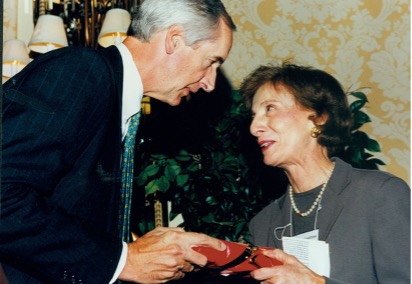
Lilyan Affinito ’53 with Cornell President Emeritus Hunter R. Rawlings III.
Lilyan Affinito’s work can be viewed in similar light as to that of another Cornellian, Ruth Bader Ginsburg ‘54. While Justice Ginsberg made great work in the legal domain, Lilyan Affinito made progress in corporate America and higher educational institutions. They both established precedents in the roles they achieved but they didn’t stop there. They went on to use their newfound platforms to advocate for others to advance on a more leveled playing field. While they specifically advocated for women, their work benefitted all marginalized individuals in the US and around the world.
“Giving While Living”
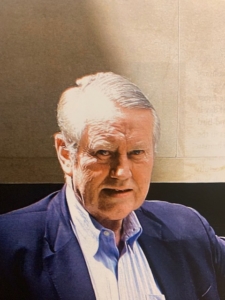
One of the three inaugural inductees for the decade of 1950’s is Charles (Chuck) Feeney ’56.
Cornell’s School of Hotel Administration served as the gateway for Chuck Feeney to begin his unique and amazing journey. The legacy of Chuck Feeney is immense, hardly measurable and continuous.
As a business entrepreneur he earned in excess of $8 billion dollars in various business sectors including retail, hotels, real-estate and successful equity investing. But more noteworthy is that during his lifetime Chuck donated and leveraged all $8 billion in programs based on improving the life of others. His philanthropic strategy of GIVING WHILE LIVING is perhaps his most important and lasting legacy.
Bill Gates has said that Chuck “set a wonderful example for the billionaire set” while Warren Buffet says that Chuck is his hero and should be everyone’s hero. Modeled somewhat on Chuck’s Giving While Living, Gates and Buffet formed The Giving Pledge which encourages other wealthy individuals to use their wealth to help others and to do so during their lifetime. Currently there are 230 signatories to the Giving Pledge.
In 1982 Chuck created Atlantic Philanthropies as the vehicle for distributing his wealth. Atlantic provided Chuck with the anonymity with which he was and still is most comfortable. Businesswise, he felt anonymity was also essential for granting his wealth according to a time sensitive, predetermined strategy rather than responding to unsolicited requests.
Atlantic made its final grants in 2016.
Chuck is both honored and humbled to be inducted into Cornell Hotel Society’s Cornell Hotelie Hall of Fame. Upon learning of this honor, he repeated his belief that “I had one idea that never changed in my mind — that you should use your wealth to help people.” He hopes others will find this idea worthwhile
From a Forbes magazine article by Steven Bertoni on September 15, 2020
“It took decades, but Chuck Feeney, the former billionaire cofounder of retail giant Duty Free Shoppers has finally given all his money away to charity. He has nothing left now—and he couldn’t be happier.
Charles ‘Chuck’ Feeney, 89 (now 91), who cofounded airport retailer Duty Free Shoppers with Robert Miller ’55 in 1960, amassed billions while living a life of monk like frugality. As a philanthropist, he pioneered the idea of Giving While Living — spending most of your fortune on big, hands-on charity bets instead of funding a foundation upon death. Since you can’t take it with you—why not give it all away, have control of where it goes and see the results with your own eyes?
‘We learned a lot. We would do some things differently, but I am very satisfied. I feel very good about completing this on my watch,’ Feeney tells Forbes. ‘My thanks to all who joined us on this journey. And to those wondering about Giving While Living: Try it, you’ll like it.’
Over the last four decades, Feeney has donated more than $8 billion to charities, universities, and foundations worldwide through his foundation, the Atlantic Philanthropies. When I first met him in 2012, he estimated he had set aside about $2 million for his and his wife’s retirement. In other words, he’s given away 375,000% more money than his current net worth. And he gave it away anonymously. While many wealthy philanthropists enlist an army of publicists to trumpet their donations, Feeney went to great lengths to keep his gifts secret. Because of his clandestine, globe-trotting philanthropy campaign, Forbes called him the James Bond of Philanthropy.
But Feeney has come in from the cold. The man who amassed a fortune selling luxury goods to tourists, and later launched private equity powerhouse General Atlantic, lives in an apartment in San Francisco that has the austerity of a freshman dorm room. When I visited a few years ago, inkjet-printed photos of friends and family hung from the walls over a plain, wooden table. On the table sat a small Lucite plaque that read: ’Congratulations to Chuck Feeney for $8 billion of philanthropic giving.’
That’s Feeney—understated profile, oversize impact. No longer a secret, his extreme charity and big-bet grants have won over the most influential entrepreneurs and philanthropists. His stark generosity and gutsy investments influenced Bill Gates and Warren Buffett when they launched the Giving Pledge in 2010—an aggressive campaign to convince the world’s wealthiest to give away at least half their fortunes before their deaths. “Chuck was a cornerstone in terms of inspiration for the Giving Pledge,” says Warren Buffett. ‘He’s a model for us all. It’s going to take me 12 years after my death to get done what he’s doing within his lifetime.’
Feeney gave big money to big problems—whether bringing peace to Northern Ireland, modernizing Vietnam’s health care system, or spending $350 million to turn New York’s long-neglected Roosevelt Island into a technology hub. He didn’t wait to grant gifts after death or set up a legacy fund that annually tosses pennies at a $10 problem. He hunted for causes where he can have a dramatic impact and went all-in.
In 2019, I worked with the Atlantic Philanthropies on a report titled Zero Is the Hero, which summarized Feeney’s decades of go-for-broke giving. While it contains hundreds of numbers, stats and data points, Feeney summarized his mission in a few sentences. ‘I see little reason to delay giving when so much good can be achieved through supporting worthwhile causes. Besides, it’s a lot more fun to give while you live than give while you’re dead.’
On September 14, 2020, Feeney completed his four-decade mission and signed the documents to shutter the Atlantic Philanthropies. The ceremony, which happened over Zoom with the Atlantic Philanthropies’ board, included video messages from Bill Gates and former California Gov. Jerry Brown. Speaker of the House Nancy Pelosi sent an official letter from the U.S. Congress thanking Feeney for his work.

On September 14, 2020, Chuck Feeney—with wife Helga Feeney—signed documents in San Francisco marking the close of the Atlantic Philanthropies after four decades of global giving. THE ATLANTIC PHILANTHROPIES
At its height, the Atlantic Philanthropies had 300-plus employees and ten global offices across seven time zones. The specific closure date was set years ago as part of his long-term plan to make high-risk, high-impact donations by setting a hard deadline to give away all his money and close shop. The 2020 expiration date added urgency and discipline. It gave the Atlantic Philanthropies the time to document its history, reflect on wins and losses and create a strategy for other institutions to follow. As Feeney told me in 2019: ‘Our giving is based on the opportunities, not a plan to stay in business for a long time.’
While his philanthropy is out of business, its influence reverberates worldwide thanks to its big bets on health, science, education, and social action. Where did $8 billion go? Feeney gave $3.7 billion to education, including nearly $1 billion to his alma mater, Cornell, which he attended on the G.I. Bill. More than $870 million went to human rights and social change, like $62 million in grants to abolish the death penalty in the U.S. and $76 million for grassroots campaigns supporting the passage of Obamacare. He gave more than $700 million in gifts to health ranging from a $270 million grant to improve public healthcare in Vietnam to a $176 million gift to the Global Brain Health Institute, a partnership program between Trinity College Dublin and the University of California, San Francisco.
One of Feeney’s final gifts, $350 million for Cornell to build a technology campus on New York City’s Roosevelt Island, is a classic example of his giving philosophy. While notoriously frugal in his own life, Feeney was ready to spend big and go for broke when the value and potential impact outweighed the risk.”
“I can tell you one Chuck Feeney story which encompasses all his deeds:
In October 2011 Cornell presented its proposal to the City of New York for the creation of a new campus focusing on teaching High Tech to graduate students. The prize for being awarded the rights was the opportunity to spend up to a billion dollars for a new campus on Roosevelt Island in the middle of the East River. I was chair of Cornell’s eight-billion-dollar capital campaign and head of the special donations ($50 million dollars plus gifts) committee. I suggested David Skorton go see his friend Chuck Feeney to tell him of our hopes.
On the day of the presentation to NYC, David laid out our hopes to the Economic Development Commission including the fact that, in order to move Cornell Tech forward, it would take an initial commitment of $400-500 million. At the end of his presentation, as everyone was leaving so Stanford could come in to make their pitch, David said ‘Oh, do you remember we talked about the initial spend of $400-500 million? WE HAVE THE MONEY!’
Chuck had committed the bulk of the money for Cornell Tech on David Skorton’s say-so. No fancy presentation, no written contract, no protracted negotiation.
Chuck was and is a man of his word and the largest benefactor to Cornell in Cornell’s history. He has expressed his gratitude for the opportunities presented to him by his alma mater many times over.
I hope this encapsulates Chuck and his effect on all of us.” Andrew H. Tisch ‘71, Co-chair of the Board of Loews Corporation, and former Vice-Chair of the Cornell Board of Trustees
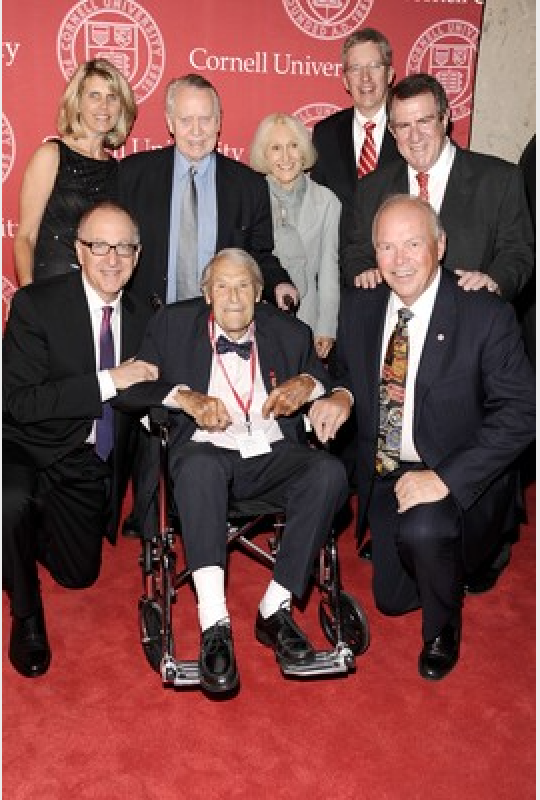
Back row, Jill Johnson, Chuck Feeney, Helga Feeney, Dean Michael Johnson, Andrew Tisch Front row, President David Skorton, Dean Robert Beck, Lee Pillsbury
“Chuck was very humble and wanted no recognition for his philanthropy. Despite his reticence, when his generosity did become known, it inspired Bill Gates and Warren Buffet, and launched a movement of “Giving While Living” among very high net worth individuals. Cornell was a major beneficiary of Chuck’s generosity in many ways over many years. He and Helga befriended many Cornell leaders and worked closely with them to support the University’s needs and priorities. He truly is a ‘Hotelie for Life.’”Leland C. Pillsbury, ’69, Trustee Emeritus and Presidential Counselor, Cornell University; Managing Director, Thayer Ventures, Chairman, TLG Investment Partners LLC
Chuck Feeney’s impact is truly global and multifaceted. Here is a video which tells that story.
https://www.youtube.com/watch?v=BALDAgNZTVU
Despite all the extradentary business achievements and contributions to humankind, Chuck is an ordinary human being who enjoys good friends and casual conversations. One of his longtime friends is Giuseppe.
“I know that words are rarely and seldom sufficient to describe, in particular a person of such magnitude as Mr. Charles Francis Feeney, well known as ‘Chuck’. A wonderful and special human being. Therefore, I shall be extremely brief, since Big Chuck, is very simple and humble person of few words.
Mr. Feeney’s philosophy is always to Care, Share and Give, to people, institutions, and countries all over the world, without taking any credit. He is a global role model and a Shining Star that graduated from the School of Hotel Administration at Cornell, that ought to be emulated and celebrated by all of us.” Giuseppe Pezzotti ‘84
We often hear words like rare, one of a kind, and unique used to describe conventional things. Chuck Feeney is one of a kind, unique and rare in three aspects:
The paradox is that he wishes he is not that rare. He truly hopes that by sharing his story, it will no longer be rare. Others will see the joy of caring, sharing and giving by Giving While Living to help other people who are less fortunate and in return find happiness themselves. Chuck agreed to allowing us to honor him not because he wanted more recognitions. This is one more way he is giving so others may benefit.
“The Longest Serving and Most Respected and Loved Hospitality Educator and Mentor”
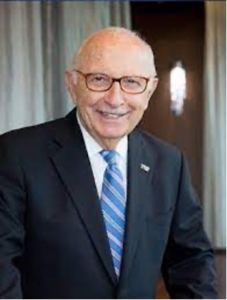 One of the three inaugural inductees for the decade of 1950’s is Rocco M. Angelo ’58.
One of the three inaugural inductees for the decade of 1950’s is Rocco M. Angelo ’58.
Professor Rocco M. Angelo joined Florida International University and the School of Hospitality and Tourism Management in 1974. Prior to joining the University, Professor Angelo was the manager of Laventhol and Horwath’s Management Advisory Services division in New York City. While with that firm he was responsible for supervising and conducting economic feasibility studies, operation and control analyses for hotels and restaurants, and tourism studies in the United States, Canada and the Caribbean. He managed a private club/hotel, in New York City and worked in various management positions with Aramark and Loews Hotels. Before that he was with Pannell, Kerr, Forster as a hospitality consultant with the Management Advisory Services Division of the firm.
He received the Bachelor of Science Degree from both Fordham University and the School of Hotel Administration at Cornell University and the MBA from the University of Miami. After graduating from Fordham University he served in the United States Army and as a 2nd Lieutenant was a commanding officer of an Antiaircraft Gun Battery, then as a 1st Lieutenant, the commanding officer of a Group Headquarters Battery.
He was a visiting faculty member at Cornell’s School of Hotel Administration from 1968 to 1979. While on leave from FIU in the Fall of 1980, he taught at the International Institute of Glion in Switzerland.
He was advisor to the Club Management Institute of the Club Managers Association of America and served on the American Hotel & Lodging Association’s Market Research and Feasibility Committee, the Certification Commission of the Association’s Educational Institute and the Scholarship and Grant Committee of the American Hotel Foundation. He was a member of the Corporation of the Culinary Institute of America, has been a trustee of the Caribbean Hospitality Training Institute and served on the advisory board of Miami-Dade County’s Academy of Hospitality and Tourism. He was the Interim President of the Southeast Federation of the International Council on Hotel, Restaurant and Institutional Education, the worldwide association of hospitality and tourism educators.
In 1993 he was awarded the Statler Professorship and in 1997 he received Florida International University’s Distinguished Service Award. The FIU Alumni Association honored him in 2009 with the Outstanding Faculty Torch Award.
He received the Lamp of Knowledge Lifetime Achievement Award from the American Hotel Association Educational Institute. The Cornell Hotel School Alumni in 2008 awarded him the alumni “Hotelie” of the Year and in 2011 the International Council on Hotel Restaurant & Institutional Education (ICHRIE) presented him with the Howard B. Meek award for lifetime achievement. He received the Dade County Academy of Hospitality & Tourism 2013 South Florida Tourism Professional of the Year.
He is the author of “Understanding Feasibility Studies, A Practical Guide” and author of the textbook “Hospitality Today: An Introduction”
In 2001, he was the president of the Cornell Hotel Society (CHS). He had been president of the CHS chapters in New York City (two years), the Caribbean and South Florida.
Rocco was the Master of Ceremonies at the Seventy-Fifth Anniversary celebration of the Cornell Hotel School at Windows on the World. He presided over the “Hotelie” of the Year dinners for Dean Robert Beck ‘42 (at the NYC Waldorf Astoria), Richard Brown ’49 (at Tavern on the Green), Dennis Sweeney ’64 (at Windows on the World), and with co-host Simon Turner ’83 emceed the “Hotelie” of the Year dinner for the Mariani brothers (at The Plaza Hotel in NYC). When Dean David Dittman concluded his tenure as dean Rocco emceed the “thank you” celebration at Windows on the World.
A 2018 video prepared by FIU for The Rocco M. Angelo Legacy in Leadership Scholarship Campaign really talked about Rocco the mentor.
https://www.facebook.com/watch/?v=10156279822462658

“Nobody exemplifies hospitality better than Rocco Angelo does. Surely, Rocco has bad days. We all do, but you will never know that Rocco is feeling anything less than 100%. His ineffable smile exudes hospitality.
After honing his craft as an operator and analyst, Rocco went on to teach and inspire decades of hospitality students at FIU. Rocco’s influence goes well beyond FIU as he mentored and inspired generations of students and educators alike from around the globe. I am fortunate to count myself among them. Those who know me well may have heard me say that ‘when I grow up I wanna be just like Rocco.’ I will never reach that goal (for one, I’m too tall), but I am better for aspiring to Rocco’s example. Rocco, you are the GOAT! A very fitting inaugural inductee into the Cornell Hotelie Hall of Fame. Congratulations!” Robert R. Nelson, Ph.D. ’83, Associate Professor and Past Chair, Hospitality & Sport Business Management, University of Delaware
“Rocco M. Angelo is not only the longest hospitality educator, he is also one of the most respected educators in hospitality education. This respect was earned by his total focus on the success of his students and his dedication to hospitality education, as a discipline in itself. Rocco illustrates that it is possible to be both incredibly successful and nice. A frequent attendee and active participant of all the major hospitality conferences, Rocco truly is a global citizen with friends throughout the world. Rocco, congratulations on this incredible honor. We at the Harrah College of Hospitality at UNLV are incredibly proud of you.” Stowe Shoemaker, PhD ’95, Dean, Andrew and Peggy Cherng Deanship, Harrah College of Hospitality University of Nevada, Las Vegas
“Rocco helped change the trajectory of my professional life.
Back in 2000, I was the COO of a large management company and having the time of my life professionally. Some folks in my hometown in San Diego, asked me to help launch a School of Hospitality at San Diego State. I thought they just wanted money but instead they wanted me to found the school!
I knew Rocco through our mutual friend Tony Marshall and recalled that we had both worked in the business for a while and that we have worked with Laventhol & Horwath (Hotel Feasibility work) in common. Rocco had made the transition to academia, and it seemed like a good idea to get his opinion. He really encouraged me to take the leap and it was the best professional decision I could have made!
I have known Rocco as an educator and a one-of-a-kind person for 20+ years. His passion, loyalty to FIU and Cornell, his student focus and kindness is second to none. In building my school and its culture, Rocco continues to inspire me. He is the consummate professional, a bon-vivant and wonderful role model for me and many others.” Carl Winston ‘81, Founding Director, L. Robert Payne School of Hospitality & Tourism Management, San Diego State University
“While we have many noteworthy people in our industry, Rocco Angelo is an institution! Regardless of where you see him, he greets you with a smile and amazing hospitality. And the man doesn’t age! I am forever proud to call him a friend…” Dennis Reynolds, Ph.D., ’92, Dean of the College and Barron Hilton Distinguished Chair, Conrad N. Hilton College of Global Hospitality Leadership, University of Houston
“Nobody in hospitality higher education is more beloved or respected than Rocco Angelo. The decades he has devoted to his university, especially the alumni, have resulted in lifelong relationships that have helped the careers of so many graduates. Rocco’s former students all hold him in the highest regard and have great affection for him as well. His dedication to ICHRIE has also been noteworthy as he has shared his time and talents with so many educators. Rocco is a true gentleman who exemplifies the best in hospitality. And he’s a helluva good dancer!” Deborah Breiter Terry, Ph.D. ‘84, Professor Emerita, University of Central Florida
“When I think of Rocco Angelo two of my favorite quotes frequently come to mind the first being E.M. Statler who said, “Life is service the one who progresses is the one who gives his fellow men a little more – a little better service.” my second favorite quote is that of Maya Angelou who said, “People will forget what you said, people will forget what you did, but people will never forget how you made them feel.” Rocco gave tirelessly of himself in service to the spirit of hospitality throughout his career. Most important while service will be a lasting legacy it is without question how he made people feel during his countless visits with alums throughout the globe that will be remembered most of all.” Michael J. Petrillose, Ph.D. Kansas State University, 95′, Cornell, 80′ & 90′; Founding Program Manager and Professor, Seminole State College of Florida
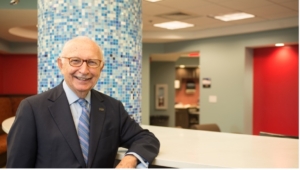
“It was the first day of my career, three weeks after graduating from the Hotel School. I arrived at the Laventhol Krekstein Horwarth & Horwath office in New York. Everyone was very serious and very busy. After completing my forms with Human Resources, an Administrative Assistant showed me my cubicle, escorted me on a tour of the office, and took me to the office of the Manager to whom I would be reporting, Rocco Angelo.
Rocco was clearly busy working on something, but his generous smile, sincere congratulations on my first day with LKH&H, and asking about my move to New York, were as genuine a welcome as there could have been. He commented that we had Cornell in common in a way that conveyed I was not only part of his LKH&H team, but there was a connection beyond just work. In addition to welcoming me with the sincerity of a true hospitality person, Rocco spoke and dressed the part of what I envisioned of a professional hospitality consultant. From those first moments I realized that Rocco is a uniquely caring professional. He is a teacher, a cheerleader for his colleagues, a role model, and a mentor. I appreciated I was extraordinarily fortunate to be working with this special person. That realization and appreciation grew with each passing day I reported to Rocco, and continue to this day.
If I were to write the candidate specification for someone’s first or career manager/boss/mentor, it would be easy – I would describe Rocco. I will always be grateful.” Bjorn Hanson, Ph.D. ‘73
(Bjorn joined Laventhol Krekstein Horwath & Horwath/Laventhol & Horwath after graduating from the Hotel School. He held numerous titles and positions including Senior Principal and member of the firm’s National Council. While working Bjorn received his MBA from Fordham University and his Ph.D. from New York University. He joined Coopers & Lybrand/PricewaterhouseCoopers (PwC) as a partner and held titles and position including Industry Chairman – Hospitality, Industry Chairman – Real Estate, and as a member of the U.S. Leadership Committee and Global Financial Advisory Services Committee. Bjorn was Managing Director of Lodging & Gaming Investment Banking for Kidder Peabody, and Managing Director of Lodging and Leisure Equity Research for PaineWebber. After retiring from PwC, he joined the faculty of NYU, served as Divisional Dean of the Preston Robert Tisch Center for Hospitality, Tourism, and Sports Management, and Co-interim of the School of Professional Studies. For Cornell, Bjorn has served as President of the Cornell Society of Hotelmen, Visiting Assistant Professor, President of the Cornell Club of New York, and Chair of the Committee on Alumni Trustee Nominations. Bjorn’s wife and he founded the Bjorn & Catherine Hanson Scholarship Fund. Bjorn is a life member of the Cornell University Council and a Trustee of the Cornell Hotel Society Foundation. Bjorn currently serves as Executive Vice President of 795 Fifth Avenue Corporation/The Pierre hotel, is a Director for Summit Hotel Properties, is a NYSE traded REIT, and is Adjunct Professor in the NYU Jonathan M. Tisch Center of Hospitality.)
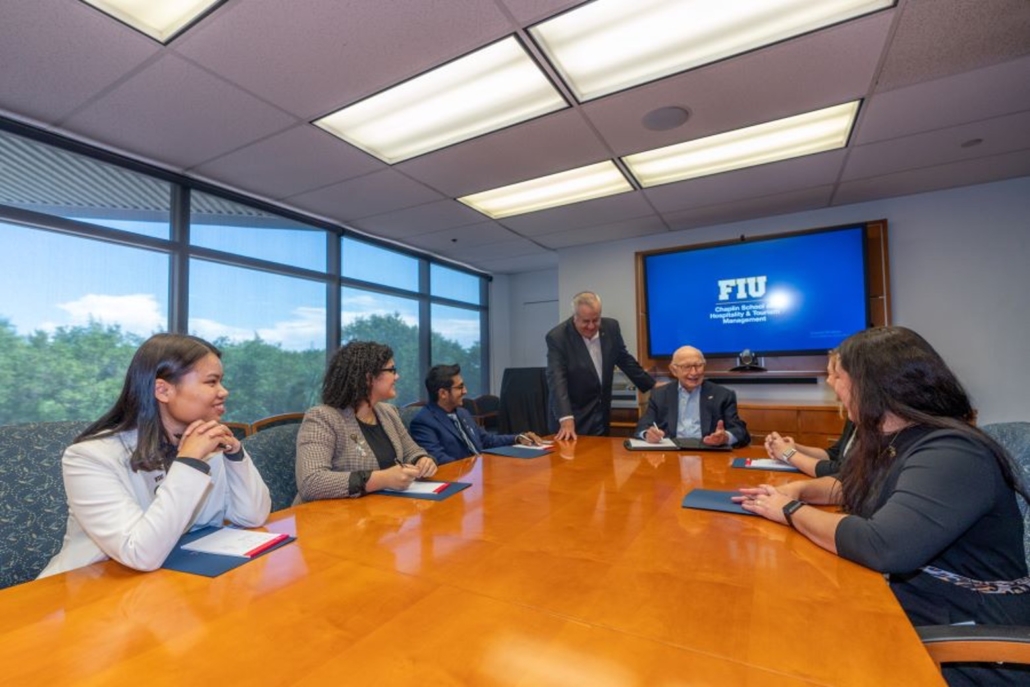
“We often say that people in our Hospitality industry are characterized by being ‘one degree of separation’ from each other. As in, within 15 minutes of first meeting, you and I will discover that we know someone in common, who we didn’t know we both knew. Of course, that person is Rocco Angelo.
He might not know (and love) everyone in the industry, but everyone in the industry knows (and loves), Rocco.
Who else has a ‘Curriculum Vitae’ – a true ‘course of life’ – that reads like his? Think about this as you read tributes to the other distinguished Hall of Fame inductees. Rocco’s hospitality life actually originates with “Our Founding Father” and then covers almost seven decades. In Rocco’s own words he was recruited, and mentored, by the legendary Dean himself:
‘It was Dean Meek who convinced me to attend the Cornell Hotel School. I traveled to hotel conferences with him and witnessed the respect that hotel executives had for him. He was an exceptional educator and mentor to students.’
Remarkably, this was after first receiving his Bachelor of Science from Fordham University. Rocco was one of the unlucky groups who before the MPS degree was started in 1973 had to take a full four years to get a second Bachelor of Science from The Hotel School. So, Rocco was at least 4 years older than his classmates, and upon graduating in 1958 Rocco was starting his career already in his late 20’s!
But, unlike the saying, ‘those who can’t do…teach’ Rocco can actually do it. With his gigantic smile, and a loquacious personality that would belie his financial & feasibility skills honed at PKF and L&H, he proved his operating chops at Loew’s and Americana Hotel, at ARAMARK, even private club management.
And though he had been a visiting professor at Cornell starting in 1968, it wasn’t until he was in his 40’s, in 1974, that Rocco first found his way to the then fledgling Florida International University and discovered his knack for teaching. He’s invested 48 years on the FIU faculty, and since 1982, as Associate Dean of the Chaplin School of Hospitality. Yet he also found time for a decade of service to the Corporation of the Culinary Institute of America. Quite a run.
Even through this wide-ranging CV, Rocco always stayed loyal to Cornell. A lifelong member of the Cornell Hotel Society, he has taken leadership positions across local, national, and international groups.
Simply, Rocco has always been there, to teach, and to guide, and to share his life experiences with multiple generations of students, industry professionals, and his ever-expanding network of real friends.
In my view, there is no better praise for any person than to paraphrase this line from a great man. After over six decades as the teacher for our entire industry, Rocco Angelo,
‘… (is) an exceptional educator and mentor to students.’” Christopher C. Muller, MPS ’85, Ph.D. ’92, Former Dean, School of Hospitality Administration, Boston University
In one hundred years, the Cornell Hotel School’s impact on the hospitality industry has been transformative.
Cornell Hotel School has educated hospitality educators around the world. Many have led or leads hospitality programs in leading universities. They brought hospitality to these institutions. Rocco Angelo personifies the finest spirit of hospitality educator and mentor.
“The Legend of Hospitality Spirits”
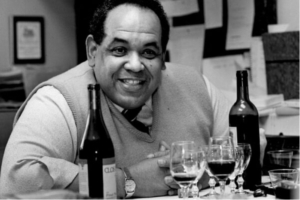
One of the two inaugural inductees for the decade of 1960’s is Vance A. Christian ’61, MS ‘65
“On November 5, 1984, the School of Hotel Administration lost one of its most famous, respected, and dedicated teachers and alumni, Vance Christian.
‘Teaching is my greatest joy,’ Vance often remarked. ‘I like to see and be instrumental in developing success. What brings tears to my eyes is recalling some young man or woman sitting across my desk from me who has no idea of his or her potential, convincing the student that he or she has it, and then seeing that person years later as a leader in the hospitality industry.’ By the time of his death, Vance had become, in the words of several colleagues, ‘the closest thing we had to a legend’ at the Hotel School.
Born in New York City, Vance moved as a child to rural West Virginia, where his father was a country doctor choosing to serve those who were not fortunate enough to receive adequate medical attention. Vance’s father was his mentor—kind, gentle, patient, but with an underlying independence and iron resolve. Vance adopted his virtues and combined them with his strong opinions and theatrical manner of making his point.
Vance arrived in Ithaca in 1959 through a bit of good luck for him and for Cornell. After earning a chemistry degree at West Virginia State College, he had enlisted in the army and managed an army service club. Upon his discharge he had planned to enroll in the Harvard Business School when a waiter working for him suggested Cornell. ‘I don’t want to go to hotel school and be a cook,’ Vance recalled telling the waiter. When he reviewed the catalog and became aware of the school’s commitment to management, he changed his mind. He earned a second bachelor’s degree and a master’s degree at Cornell. He then joined the faculty as a lecturer in 1961 and was appointed an assistant professor in 1965, at that time one of only a few black faculty members at Cornell.
Over the years, Vance developed an international reputation as a concerned, caring, and demanding professional, who lived by the philosophy absorbed from his father—concern for people, hard work, independence, and leadership. On campus he developed and taught numerous food and beverage management courses, spicing each lecture and demonstration with strong opinions and a personalized phrase such as ‘in doing so’ or “on the reverse side” followed by an all-knowing smile and a chuckle. His most popular course, ‘Introduction to Wine and Spirits,’ attracted hundreds of Cornell students each semester. For his efforts and leadership in promoting beverage management in the curriculum, he was named the Villa Banfi Professor of Wine Education in 1978.
Students and former students making their way up the echelons of the industry sought out Vance for his sage advice. He became the mentor to a wide range of students, both domestic and international, and to many young faculty members. He took time to listen, to be concerned, and to become involved. The loan fund, which he established in his father’s name, quietly assisted deserving students.
Within the industry Vance was well known and highly respected. By example he promoted hospitality-management education as a legitimate and demanding discipline. A black in an industry whose management ranks were almost entirely white, he said his color was not a problem. ‘I do not teach black management. I teach management. If people want to improve their business or make their personnel more efficient, they don’t care who does it.’
Vance carried the highest standards of hospitality education with him wherever he traveled throughout the world—Europe, the Far East, Africa, South America, and India. He personified Cornell to those he taught and encountered in distant places and to those government and industry leaders he advised. An established and reputable consultant and management adviser, he also contributed significantly to industry education and research as president of the Society of Wine Educators, as a member of the board of directors of the Culinary Institute of America, and as an active member of the Society for the Advancement of Food Research; the Council on Hotel, Restaurant, and Institutional Education; the Institute of Food Technologists; and the Hotel Sales Management Association.
A bachelor most of his life, Vance’s family was the students he taught and the faculty he befriended. Late in his life he married Nena, his steadfast companion through his long and slow illness. Vance never gave up. With deep, moving courage and hope, he talked and planned of coming back. He rose from his bed to lecture to his class and to travel for one last visit to Singapore to give his farewell seminar to the industry he loved.
Vance’s passing leaves a void that cannot be filled. He touched our lives in deep and moving ways. A personal giant: tough, but soft underneath; demanding, but understanding; opinionated, but willing to reconsider his position. From humble beginnings to a humble end, Vance was laid to rest in a small country churchyard in rural Virginia beside his mentor, his dad.” Stephen Mutkoski ’67 Ph.D ‘76, Normand Peckenpaugh ‘72, James Eyster ’69 Ph.d ‘77
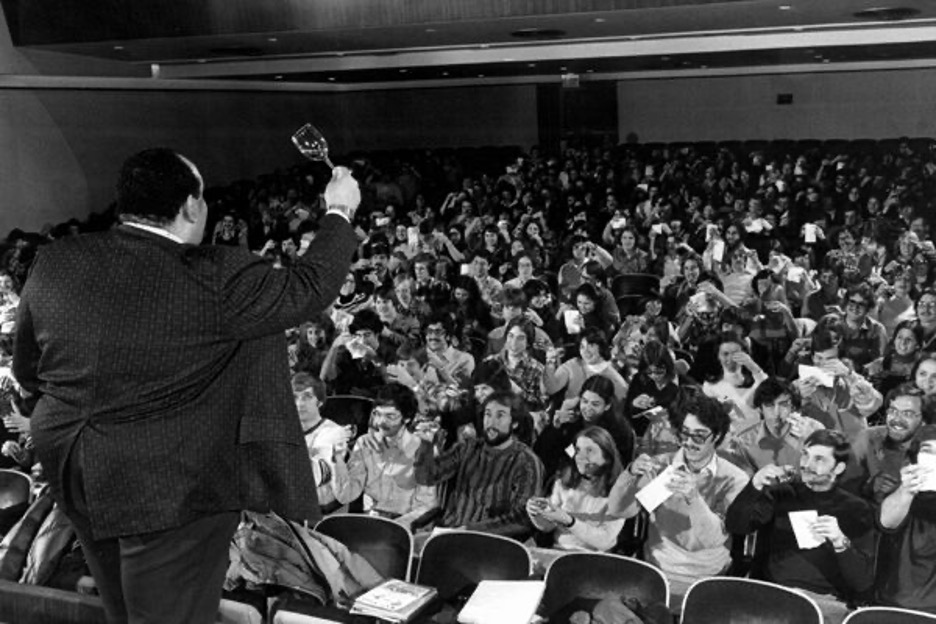
“Freshman 77 entering hallowed halls of Statler … the daunting institution with some of the most iconic figures that would soon begin to influence our formative years
Dean Robert Beck ‘The Coach’
Prof Ray Goodman ‘The Essentials of Service’
Prof Peter Rainsford ‘The Food Chemist’
… but for so many in our class and the classes that preceded and followed us, the most memorable and impactful was Vance A. Christian.
We were greatly impacted as freshmen as Vance taught the ‘Introduction to Hospitality’ his approach was bold, voicing his opinions in a manner that made you think.
A larger than life, thoughtful leader who was the most knowledgeable educator on all thing’s food & beverage, Vance’s experience, his connections, his style and grace, and at all times his passion are still to this day are unrivaled.
This could be said about many iconic educators – of such Cornell had its fair share. But what elevated Vance to this rarified respected space was that he was a humanitarian, a caring kind soul who respected all of his students, especially, those disciples that took an interest in his teachings. Vance would share his vast knowledge, his contacts, his table, and be your best support system without bias or judgement. Vance was never shy about standing up for what he believed in, with his colleagues, his students or industry leaders.
We had the good fortune to serve as his teaching assistants for several years at Cornell where we watched this extraordinary man, professor and thought leader impact thousands of students every year teaching the most popular class on campus. The Introduction to Wine. He loved teaching and set the highest bar. What was special for us was the privilege to spend quality time with Vance in his office, his classroom, or over a dinner with industry guests. His opinions on critical issues were thoughtful, impactful, and always gave us a new dimension to contemplate.
When Vance left us in 1984, they broke the mold – although others under his earlier tutelage including Joe Durocher and Giuseppe Pezzotti have honored him with their dedication to the craft. Almost two decades as a professor at Cornell, he was one of the first black faculty whose presence encouraged other faculty and students of color to continue pursuing their educational or professional aspirations.
For those of us who were inspired by Vance and subsequently pursued careers in F&B after we left Cornell – there was no greater influence.” Christopher Hunsberger ’81, Daniel Fenton ‘81
“Prof. Vance Christian is a legend. When I get the pleasure of speaking to alums who had him as a faculty member, they always say how impactful he was in their lives. He was not just someone who introduced them to a lifelong interest or passion in beverages but as someone who cared. Some even tell me they would not have graduated if it were not for him. That is the type of faculty I want to be. One who lifts students up and is there to be their cheerleader.” Cheryl S. Stanley ’00, Senior Lecturer, Nolan School of Hotel Administration, Cornell University(Cheryl Stanley is the current instructor for the Introduction to Wines course.)
“As a young girl growing up in the Caribbean, I had heard my mother, Gloria speaks often about her cousin Vance Christian who was a professor at Cornell University teaching food and beverage. I finally met Vance years later when our family were enroute back to the UK on long leave via Canada with a long drive to Ithaca to see Vance before my sister and I headed to boarding school in the UK. Vance encouraged me like so many others to pursue their dreams in the hospitality industry which I subsequently did and never looked back! I was a lucky recipient of a scholarship to attend Summer School at Cornell which he arranged. He was larger than life – a bit frightening sometimes – but a very kind, generous and respected gentleman who mentored many in the industry.” Gillian Greenwood, Former Director of International Sales, InterContinental Hotels and Resorts
“I was fortunate to have Professor Vance Christian as my godfather. He had a loud laugh, a loud voice and an even larger personality. He was seemingly an expert on any topic during a dinner conversation. One of my best memories of Professor Christian has nothing to do with the hotel industry. It was going to the Franklin Institute in Philadelphia one summer day with him and my sister Kim (’93), also a Hotelie. I believe I was about ten years old or so. We went there because I was very interested in astronomy and this museum had a planetarium. Professor Christian had tremendous patience with all my questions and had an answer for each one throughout the day. Since he was a college professor, I assumed he would know all the answers. He mentioned a professor at Cornell who knew a lot more than him about astronomy. (I know today that was Carl Sagan).
Professor Christian was always learning and encouraged me to ask questions and always be reading a book. He bought me several during that visit to the museum and I read them all. He also told me it was important to learn about computers, which would change the world, as Vance would say. I used his urging to convince my father to buy me a computer because that’s what Professor Christian suggested. I considered that to be a productive outing to a museum. And we got some ice cream too.
I was 14 years old when Professor Christian died. I didn’t decide to pursue a career in the hotel industry until after his death. But he is responsible for causing me always to want to learn more and realize there is so much out there, whether in the cosmos or here on earth, that we don’t know. But always asking questions and pushing myself to learn more has allowed me to have a relatively successful career in the hotel industry. That was the most important gift I received from my godfather and I hope to pass it on to my children.”
Raymond Martz ’93, EVP CFO Pebblebrook Hotel Trust
“Vance Christian took over the leadership role in the Food and Beverage Department in the mid 1960’s and worked diligently to modernize the focus of the department and the course offerings. He developed strong industry relationships with top executives throughout the Hospitality Industry. This brought a new level of expertise to campus in the form of guest speakers. In time companies like Hyatt and Marriott offered to support new courses and even sent their department heads to campus to participate. This opened new job opportunities for our students and that was the driving force of Prof Christian’s efforts. His executive education programs, which were conducted both in Ithaca and around the world, were fully subscribed and highly regarded. As his students excelled in their careers throughout the world, his reputation as an educator and consultant also expanded internationally.
Students who had the opportunity to attend his classes know he was a no-nonsense task master, but he was always there for students who needed help. Need a place to stay, help with a rent or tuition payment or just someone to talk to, he was there. It was common to find him still in his office late in the evening. His door was always open.
Those of us who were lucky enough to become a TA for him in any of his classes found a mentor and advocate for life. He would call periodically to see how things were going with your career and family. In my case, he called me in June 1972 at 6:00 am on his way to do a seminar in the Philippines. He asked if I would be willing to teach a course in September. After returning to Ithaca with my wife and three children, Vance would periodically stop by the house on a weekend and say: ‘You two need a break, I am taking the kids out for ice cream.’ I was lucky enough to continue to learn from him as a colleague for another twelve years.” Stephen A Mutkoski, ’67, Ph.D. ’76, Professor Emeritus, School of Hotel Administration, Cornell University (Professor Mutkoski took over the Introduction to Wines course after the passing of Vance Christian in 1984),
“To say that Professor Vance Christian was an imposing figure would be an understatement. He had a sternness about him that could stop you in your tracks, but inside was a heart of gold. He cared deeply for his students and was a master of bringing out the best in you. I was fortunate to have him as my freshman advisor. I can honestly say that without his mentorship and support, I’m not sure I would have made it through my first year.
I recall Prof Christian picking me up from my dorm and treating me and other students to dinners at his favorite Chinese restaurant off Route 13. There I had the opportunity to meet fellow classmates from around the world. He would also open his home throughout the year to students, particularly inviting those who could not travel home for long stretches. His wife Nena would prepare feasts, while his guests, unknowingly, were building ‘Hotelie for Life’ bonds.
What I remember most about Prof Christian is that he taught us to take full ownership of every task – and to perform them proudly and with humility. Lessons that I still hold dear today.” Ginny Mariani Kitt ‘82
“From the very beginning of my arrival in Ithaca in August 1983 as an MPS student, I was able to live for free (well, in exchange for putting out the garbage, shoveling the snow, and driving The Prof to the hospital for his cancer treatments) in a small apartment that Vance kept for struggling grad students in his basement at 1032 Hancock Street. Fred Antil, the Career Services Director, lived in the much larger walkout apartment next door.
I was scheduled to bring Vance home from the hospital for final hospice care on Monday, November 5, 1984, but he passed away earlier that morning. That sad and solemn evening was also my induction banquet into Ye Hosts, which he hoped to celebrate with me. Without his generosity, I would not have been able to stay and complete my degree at Cornell and my life would be completely different.
I made a promise to him over dinner one evening that I would continue his efforts to increase the number of students and faculty of color at the Hotel School, and over the past 38 years, that has been one of my touchstones. To be honest, it hasn’t been very successful. Some may forget, but as the original Banfi Professor I believe he was the very first Full Professor of color to hold an endowed chair at the University, not just the Hotel School. Certainly, he was the very first to teach a college-level undergraduate course in Wine Appreciation anywhere in the USA.
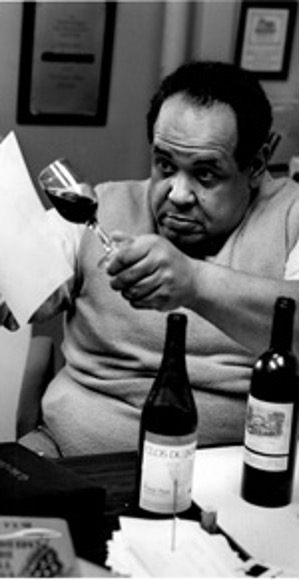 All who knew Prof. Christian know that he was truly ‘larger than life’ in every way. A story often retold by President Rhodes concerned one of his visits to Asia. He was checking into his hotel, where he was welcomed cordially. When the front desk clerk saw that he was from Cornell, he was asked if he worked with the renowned Professor Vance Christian, who was currently occupying the Presidential Suite.
All who knew Prof. Christian know that he was truly ‘larger than life’ in every way. A story often retold by President Rhodes concerned one of his visits to Asia. He was checking into his hotel, where he was welcomed cordially. When the front desk clerk saw that he was from Cornell, he was asked if he worked with the renowned Professor Vance Christian, who was currently occupying the Presidential Suite.
And a story Nena, Vance’s wife, like to tell was his encounter with the hotel staff at the Mandarin Oriental. Upon checking in, Vance sent his laundry down to be cleaned. An hour later there was a knock on the door. It was the Laundry Supervisor with his entire staff, they had come up to see the man who could fill such enormous underwear. On his next visit, when he returned to the hotel and sent down his laundry, they all rushed to see him, they had recognized his ‘briefs.’ Christopher Muller, MPS’85 Ph.D. ’92, P’14, Former Dean, School of Hospitality Administration, Boston University
To Vance Christian teaching was personal. It was not just the transmission of knowledge to the students. He took an interest in the people he was teaching, each and every one of them. He wanted to know the persons whom he was teaching. He helped students outside of the classroom. When a student had a financial need, he would reach into his own pocket to help.
It was well known he was a demanding educator. Students didn’t want to disappoint him. When they did, he was never a “you are not good enough” instructor. Instead, he was always a “you are better than that” teacher.
Truly the Legend of Hospitality Spirits.
“Designing the Great Hospitality of Life”
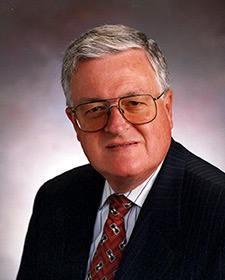 One of the two inaugural inductees for the decade of 1960’s is William V. “Bill” Eaton ‘61.
One of the two inaugural inductees for the decade of 1960’s is William V. “Bill” Eaton ‘61.
“William V. Eaton’s purpose in life has been to fulfill the adage, ‘Life is Service’, a belief espoused by E.M. Statler. In his professional life, ‘Bill’, as he was known by his colleagues, made innovative and life changing contributions by serving organizations, leading businesses and educating/mentoring individuals who would follow in his footsteps.
Serving organizations:
Bill loved organizations that supported his profession, namely the ‘Hotel’ School at Cornell University and Foodservice Consultants Society International (FCSI), the society for experts in foodservice consultants around the world.
Leading Businesses:
Although Bill initially started his career in Marriott, he had his greatest impact in Cini-Little (originally formed as Cini-Grissom in 1968), a foodservice consultancy firm, known for exceptional service, creative solutions, and innovative designs for foodservice clients. Along with the other founding partners, he guided the firm to world renown status with such milestone projects as the World Trade Center, King Abdullah University of Science and Technology, Universal Studios (the parks in Orlando and Los Angeles), and the White House (twice). Within the firm he rose from consultant to President, Chairman of the Board, and finally Chairman of the Board Emeritus.
Educating/Mentoring Individuals:
Bill’s mentor at the Hotel School was Ernie Bangs who instilled in Bill the importance of mentoring those who would follow. While at Cini-Little from the late 1960’s until Bill’s retirement in 2015, he educated those who had the drive to succeed. Over the years, he trained/developed the new hires, project managers and office managers, and eventually, he guided and inspired the next generation of partners and managers. Within FCSI, Cini-Little became informally known as the University (CLU) for foodservice design consultants because many of its employees eventually started their own firms and became competitors.
For the Hotel School, he actively participated as a guest lecturer in the foodservice design courses both in the regular curriculums (BS and MMH) as well as the Professional Development Program (PDP) during the summer. In addition to his technical knowledge, he provided a role model for those students who would follow him into foodservice consulting.
For Mike Redlin, he actively mentored me from 1973 until 2005 (my entire time at the Hotel School). Through Cini-Little, Bill provided me two sabbatical leaves through which I became steeped in the subtleties in foodservice design and client relations. In addition, I taught PDP courses with him, learning as much as the students did.
I will be forever grateful for having Bill as a role model and mentor, and I strive to uphold his passion for “Life is Service”.” Michael H. Redlin, BS ’67 and PhD ’74 (Mechanical Engineering) Professor Emeritus, Nolan School of Hotel Administration as well as Cornell University
“My earliest memory of Bill Eaton was when he joined our family for dinner when I was about 6 years old, back when Bill and my dad John Cini worked together in the design department of Marriott’s restaurant division. Later in life, I had the pleasure to work alongside Bill at Cini-Little International.
Bill once told me his education at the Cornell Hotel School taught him to think through all aspects of a hospitality project, even those outside his purview, to make sure the impact of each was considered. Bill made it his life work to do just that as he guided clients and architects to shape the hospitality industry.
He enjoyed working alongside fellow Cornellians like my dad John Cini, Ron Kooser, and others, building the outstanding reputation of Cini-Little International. Bill has always been very supportive of Cornell and its students, guiding the future path of many graduates. His devotion to the hospitality industry included numerous volunteer hours through leadership roles in FCSI, the NRA Kitchen Innovations Awards program, Cornell, and more. His positive contributions to the industry will be felt for years.” Diane Cini Dowling ’80, Former CEO & CFO, Cini-Little International, Inc.
The life story of Bill Eaton was well told when he was inducted in the Foodservice Equipment and Supplies Hall of Fame.
FE&S’ 2016 Hall of Fame William V. “Bill” Eaton, Chairman of the Board Cini-Little
By Amelia Levin April 01, 2016
From foodservice to the farm
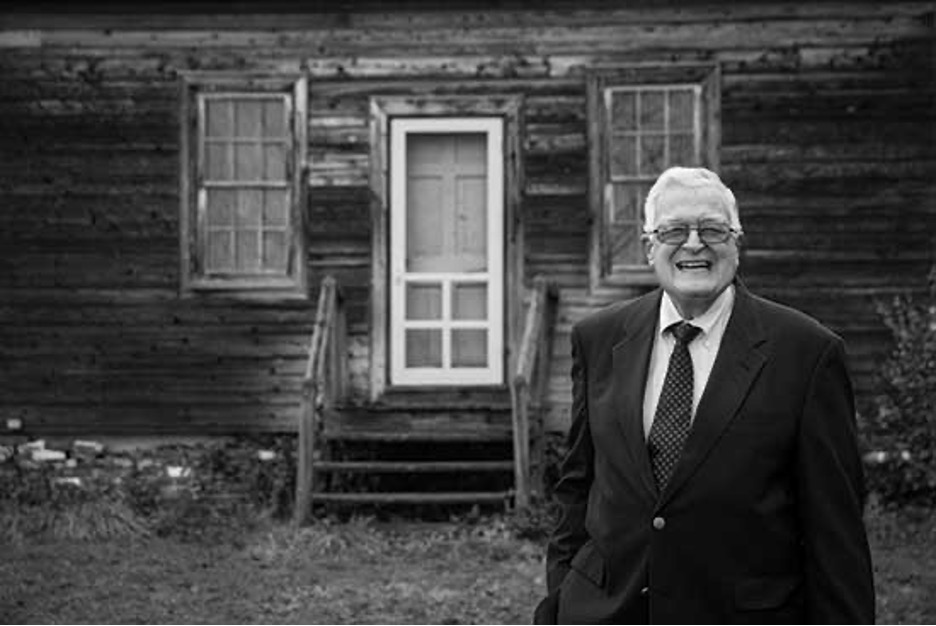
Photo by mk Photography
These days, renowned foodservice designer and long-time Cini-Little executive William V. “Bill” Eaton spends much of his time on his farm on the eastern shore of Maryland. He alternates between there and his family’s beloved home of 47 years about 30 miles away. No question — after four and a half decades in the business, he’s earned the downtime.
“I have made hundreds, if not thousands, of friends over the years in this industry, from dealers to manufacturers, consultants, installers and more,” Eaton says. “All of these people really have one focus, and that’s ‘let’s get the job done and do it right.’ It’s fun work, and that’s why it’s so hard to let go.”
While Eaton may have “officially” retired from Cini-Little last year, don’t be fooled — he remains active as chairman of the board for the worldwide consulting firm. During the same week as his interview for this article, in fact, Eaton had two conference calls scheduled with Cini associates about various projects — and a site visit planned for the next. Plus, he continues to mentor and coach up-and-coming designers at the firm and even outside of it. Throughout the year, Eaton also devotes countless hours collecting and reviewing entries for the National Restaurant Association’s Kitchen Innovations (KI) Awards. In fact, he’s been part of the process since the inception of the awards more than a decade ago.
In talking to Eaton’s colleagues for this article, many quickly offered their congratulations and support, reiterating that this recognition was well deserved. In fact, that’s an understatement, folks told us.
Eaton’s life story begins outside Detroit, where he was born when his father, a chemistry graduate, worked at a chemical company in the area. For 12 years, Eaton lived in Trenton, Mich., where his father went on to develop two major inventions: an odorant for natural gas “so we don’t die without knowing what we’re smelling” and non-ionic 218, the main ingredient of Joy dish detergent.
Clearly, Eaton’s father passed down the innovation gene to his son, who went on to invent the designs for some of the most complex kitchens and foodservice facilities in the country and the world. Ironically, when he was a child, all the younger Eaton wanted to do was farm the land.
“Our home backed up to a hay field, and all I wanted to be was a farmer,” says Eaton. “I made friends with our neighbors, who would let me bail the hay and ride on the tractors.”
Eaton’s family later moved to Pennsylvania, where he finished high school and applied to the engineering physics department at his father’s alma mater, Cornell.
“They only took 62 students, and I was lucky to be one of them,” he says. “My first class at Cornell was calculus at 8 a.m. Monday morning. At public high schools in 1957, you didn’t have calculus. The teacher asked how many of us went to Brooklyn Tech, a high-quality math and science school in New York, and half the class raised their hands. So she said turn to chapter 12, page 22, and that’s where we start. I now had 12 chapters to catch up on.”
Just like he always has in life and work, Eaton jumped in 100 percent. What began as an initial dream of building rocket ships changed once the reality set in. An ongoing recession at the time made it difficult for Eaton to find a summer job at engineering firms, so he reached out to a fraternity brother, who put him in touch with The Statler Inn in Ithaca on the campus of Cornell’s School of Hotel Administration. Eaton applied for and got a job as a bellhop. While toiling in that role, he struck up a friendship with Professor O. Ernest Bangs in the hotel school, who would later become one of Eaton’s closest mentors.
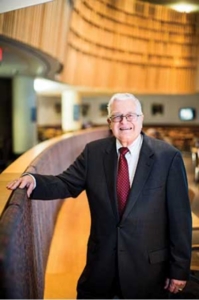
The Mitsitam Native Foods Café at the Smithsonian’s National Museum of the Native American Indian remains one of William Eaton’s most enduring designs and it won FE&S’ 2007 Facility Design Project of the Year award. Photo by mk Photography
“He probed into my background and learned how I was in engineering, not satisfied with the program and afraid of the thought of being trapped in a lab the rest of my life,” Eaton recalls. Realizing this, Bangs introduced Eaton to a new program he was spearheading: Food Facilities Design, sponsored by a professional organization called the Food Facilities Engineering Society (FFES). Founded in 1952, this organization would later go through various mergers and change names in the late ’70s to become Foodservice Consultants Society International (FCSI), one of the most important organizations in Eaton’s career. (More on that later.) “I made the decision to change schools and had the honor of taking three years, or six semesters, of courses with Professor Bangs,” Eaton says.
Meanwhile, Eaton continued to learn the ropes at The Statler, moving through the ranks as front desk associate, dining room manager, banquet manager and sales manager. He also joined FFES as a student member and continued as an active member of what is now FCSI.
Eaton’s roster of classmates reads like a who’s who of the foodservice consulting industry. “In Professor Bangs’ course were Dewayne Grissom, Ron Kooser, Richard Swartz and Carl Vail, all of whom became members of the consulting firm Cini-Grissom Associates, now Cini-Little International. And all, of course, were also members of FFES, were also members of FFCS (Food Facilities Consultants Society), ISFSC (International Food Service Consultants Society) and eventually FCSI over the years,” Eaton recalls.
Coincidentally, the late Jim Little, another important figure in Eaton’s life, had served as the last president of FFCS, and Eaton became the first president of FCSI in 1979. Later, Eaton’s daughter, respected industry consultant Pam Eaton, would also eventually matriculate at the Cornell program and become active in FCSI.
Working in various positions at The Statler helped Eaton learn the operational side of the foodservice and hospitality industry, something he combined with his education to easily find a niche in the foodservice consulting and design community. “I don’t know how I would be the consultant I became without having worked every job in the hotel, including doing a whole lot of dish washing,” he recalls.
Upon graduation from Cornell in (1961), Eaton sent out 62 letters to different professionals and firms, including the founding members of FFES. He eventually obtained a job as a draftsman with Horwath and Horwath, a Chicago-based accounting and management consulting firm for the hospitality industry. The company had recently added kitchen design to its scope of services.
A year later, though, Eaton was enticed to move back to the East Coast — Maryland specifically — to run the Santa Maria Hotel in Ocean City for a fellow Cornell hotel school alum who was a professor and had been a general manager at The Statler. After a short stint there, a recruiter from a restaurant group, Hot Shoppes in Washington, D.C., contacted Eaton about a design job with the company. Hot Shoppes would later fold into what is now Marriott International.
Here’s where the plot thickens.
“I was walking into the parking lot on the first day and happened to meet up with another gentleman also walking in on his first day,” Eaton says. “I introduced myself, and he asked what department I was in. I said kitchen design, and he laughed. ‘I’m the new head of kitchen design.’ Turns out it was John Cini, and two of my classmates were already inside working for the company.”
Eaton spent four years at Hot Shoppes, working his way up to assistant director of the design department. In the meantime, he met Phyllis, a fellow Marriott employee in the operating division, who would become the love of his life. They were married in 1966.
After reaching his limit in the Foodservice Design Department, he examined other opportunities within Marriott, including moving into the accounting department of the Hotel Division. When that did not materialize, an opportunity to join another operating company, Macke Vending, in the Washington area, appeared and Eaton joined Macke as director of design for their kitchen facilities department, handling their newly acquired cafeteria division in the East and Midwest.
“Sixteen months later, an interviewer from Marriott called me and said, ‘How would you like to come back to Marriott? We have an opening in the in-flight feeding division as director of engineering and standards,” Eaton recalls. The year was 1969.
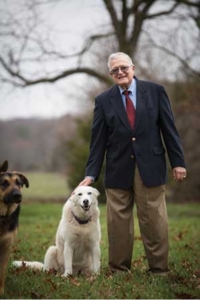
William Eaton, pictured with his dogs Chief (left) and Star, on the farm he shares with his wife Phyllis in Centreville, Md. Photo by mk Photography
It was a good job with good pay, and Eaton got the chance to fly all over the world to help design in-flight kitchens and develop operating manuals for this growing business. When the airline industry stalled — no pun intended — a year later, Eaton found himself in a similar but slightly different job at New York’s John F. Kennedy Airport, working for the in-flight services division of what is now Aramark.
The commute was brutal. “I made the commute from my house in Maryland, where we still live now, going up Sunday evenings and staying Monday nights, then driving home Tuesday night, flying to various flight kitchens on Wednesday and doing the same round-trip Thursday and Friday.” That went on for one whole year. Enough was enough.
The year was now 1970, two years after former Hot Shoppes boss John Cini had founded Cini-Grissom Associates with fellow Marriott and Cornell alum F. Dewayne Grissom.
Through his connections with Cini and fellow alum Kooser, who had gone to work for Cini-Grissom, Eaton was recruited to join the five-person firm. This became his home for 45 years and counting. During those four-plus decades, Eaton has gone from one of the first CAD system operators in the country to president and COO in 2002, the first president after Cini’s retirement, to chairman of the board.
It was in 1984 that John Cini and Jim Little started conversations that would ultimately result in a merger to become Cini-Little, the largest foodservice design firm in the world, headquartered in Germantown, Md., with offices in Chicago, New York, Los Angeles, San Francisco, Ft. Lauderdale, Toronto, Tokyo, and London.
At Cini-Little, Eaton has focused primarily on corporate design (35 percent), followed by hotels, colleges and universities, and some large, full-service restaurant chains. By his own account, Eaton has worked on a whopping 1,192 projects, to be exact.
“We did all of the work on Capital Hill, from remodeling both the Senate and House dining facilities to the botanical gardens and basically anywhere there was food and beverage served,” Eaton says.
Other major projects have included cutting-edge, state-of-the-art foodservice restaurants and operations at the National Gallery of Art in Washington, D.C.; the Rockefeller and Lincoln Centers in New York City; and countless other museums, institutions, and national landmarks.
The Madison Square Garden renovations proved to be particularly challenging because of the circular design of the arena and because Eaton’s team had to work even as events continued. He and the firm went on to renovate 50 or so other stadiums and arenas worldwide.
“These spaces were symbols of the industry, which made the work so exciting,” says Eaton. At one point, Eaton spent time in Saudi Arabia at King Abdullah University, where he designed the kitchen and dining facilities using a limited range of equipment. Further complicating matters was the fact that the kitchen had to accommodate many different styles of cuisine for the international students.
Eaton credits Joe Baum, the former president of Restaurant Associates, as one of his other main mentors. It was Baum who brought the Cini-Grissom firm into one of the most memorable and later emotional projects of Eaton’s career: the World Trade Center with its many foodservice facilities, including Windows on the World. To give an idea about the scope of this work, this late-’70s project would account for 20 percent of Cini-Little’s annual fees today. The firm continued to manage the design and equipment needs for the restaurant and center for over two decades. Eaton was scheduled for a meeting at the North Tower (Building One) on September 11, 2001.
“We flew into LaGuardia at 5:30 a.m. on one of the most beautiful flying days I’ve ever recalled,” Eaton says. Luckily, they were early and would work out of Cini-Little’s New York office on Park Avenue before the meeting. “Someone in the office answered the phone and told me a plane hit the World Trade Center,” Eaton says. Thinking it was a smaller plane, he looked out the window to see Tower One in flames. As he walked out to the street, the South Tower came down.
“Our close friend, one of the owners of the restaurant, wasn’t in the building, but he lost 35 employees that day,” Eaton says. “It was tragic from every aspect, having spent 30 years working on the building but also seeing so many lives lost. I don’t think a day goes by I don’t think about it.”
Eaton sets himself apart from other foodservice facilities designers through his strong operational background and firm grasp of management advisory consulting, even if he doesn’t focus on that area. “You can’t design without understanding foodservice management,” says Eaton, who has helped clients with some of the initial concept development work.
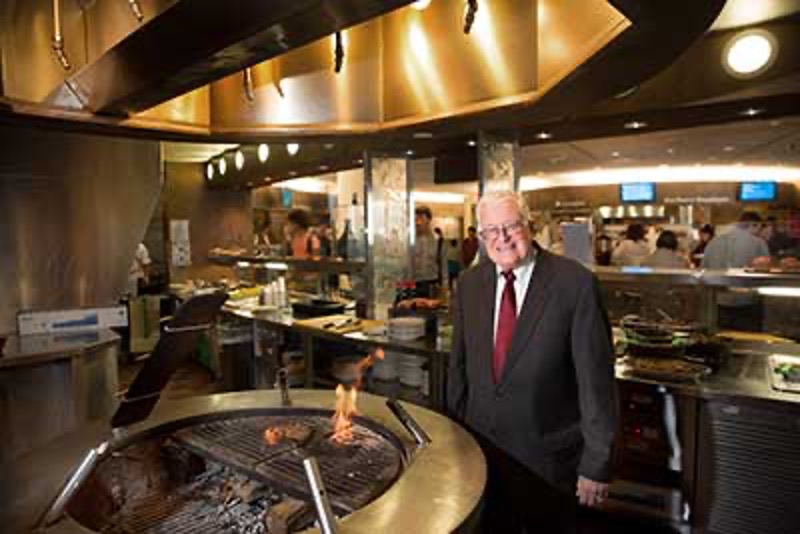
One of the innovative features at the Mitsitam Native Foods Café is the fire pit, which staff use to prepare traditional Native American fare. Photo by mk Photography
It was through collaboration with others in FCSI that he was able to learn more about the MAS side of the consulting business and forge close bonds with other designers. Throughout his many years of membership, Eaton has served on almost every committee in the association and has helped plan many conferences, seminars and events. Eaton was nominated as an FCSI Fellow, a highly coveted and respected title, on September 18, 1987.
When asked how he views the nature of changes in the foodservice industry, Eaton points to the Kitchen Innovations Awards.
But Eaton’s most important endeavor outside of work has been family, he notes. Eaton and his wife have four daughters and 11 grandchildren. Pam Eaton, as noted earlier, has become a highly respected foodservice consultant in the industry, helping to guide newcomers just as her father did.
Eaton admits he didn’t encourage his daughter, then a veteran restaurant manager, to come to work for Cini-Little. Determined, she got hired by Dan Bendall without Eaton’s knowing. “One Sunday night, she called and hung up the phone saying, ‘I’ll see you tomorrow.’ Well, she did, and we made it work, and she’s made me so proud.”
Nowadays, Eaton continues to mentor newer designers at the firm through project work but also through Cini-Little University, a series of weekly interactive webinars that helps new recruits work through complex design problems to find solutions. For two decades, he even taught courses during Cornell University’s two-week summer professional development program.
He gives the up-and-comers advice similar to what he received. “Joe Baum always taught me you have to do your work right, and if you have to spend more time doing it right, so be it because there won’t be any reward if you don’t,” he says.
When working with clients, Eaton has always made it a priority to listen carefully to their ideas. He also points out the realities of what might not be a great idea and works with his clients to find solutions for how the idea could work better.
“It’s about having the client see through your eyes why we design equipment in a kitchen the way we do,” says Eaton. “We have to show them, ‘Here’s what happens if you put the range here but don’t have any workspace next to it.’ The cook has to be able to put a hot pan down somewhere.”
These days, Eaton’s hobbies all pertain to maintaining the farm, his early childhood dream. With the assistance of a farmer, he manages 54 acres of crops and 34 acres of wild grass to help bring back the quail population. He and Phyllis continue to make updates to the centuries-old house on the property. The Eatons also make regular trips to the Blue Heron Café, a Maryland restaurant renowned for its oyster fritters and managed by fellow Cornell alum Paul Hanley. And they spend plenty of time with their children and grandchildren.
As he has his whole life, Eaton gives 100 percent.
Kitchen Innovations
For the last decade, the National Restaurant Association’s Kitchen Innovations (KI) Awards have recognized some of the most innovative foodservice-related equipment, technologies and supplies. From its inception in 2004, Bill Eaton has had an integral role in the development of the Awards program, which showcases the winners each year during the annual National Restaurant Association Restaurant Hotel-Motel Show in Chicago.
In fact, it was Eaton and Alan Plassche, partner of BP Partners Consulting and a former executive with the Culinary Institute of America, who came up with the idea for the KI program during an FCSI event in Toronto. They viewed KI as a national platform through which to elevate standards of excellence in the field. Ever since, KI has kept manufacturers on their toes, pushing them to think even more outside the box and create products that could help foodservice operations reach higher levels of success. Past winners have included equipment and other products that help operators save on energy, water and waste to meet sustainability and cost-cutting goals. Some have demonstrated innovations in food safety and sanitation.
In the early years, Eaton and Plassche recruited a handful of volunteers, including Kathleen Seelye, FFCSI, LEED, of Ricca Newmark Design; Robert Marshall, vice president, U.S. operations for McDonald’s; and Robert Forrester, then of Quizno’s and now principal of Restaurant Industry Solutions, to help build the KI program.
Eaton has also remained a judge and coordinator for the program, spending hours throughout the year collaborating with other judges to review and vet the applicants. Judges must be in unanimous agreement to award the KI honor.
“At first, we struggled to find innovation, and the reason why is because innovation costs money,” Eaton says. “But every year has gotten better and better. We’re seeing more applications, more ingenuity and more innovation. The biggest change I’ve seen is in the way these products continue to strive to answer operator problems.”
Eaton has even coached applicants that didn’t make the cut so they could make improvements that might get them to the finals the following year. “We have sent some manufacturers back to work on a project if we think they have a great idea but need to finish the execution,” he says.
One of the best things about KI? The coming together of industry experts and peers. “The collaboration is just amazing,” Eaton says. “I have made such close friends through KI, and it’s been wonderful to share ideas and help our industry move forward.”
Letter from Bill’s Daughter: Pam Eaton
Even though I worked with my father at Cini-Little for 20 years, the work together began long ago as a child. As one of four daughters and no sons, we were “adopted” for some of the boy stuff. I was the Redskins football fan and did a lot of the yard work and repairs around the house with my dad. It was a relatively easy transition to later go into a real work environment with him and anticipate what was coming next. In fact, people are surprised how well we work together. Now that he’s not in the office as much anymore, I realize how often I popped into his office down the hall for a few minutes of advice.
What I learned most from my dad was not as much from his words, but from his actions — he has such dedication to the client and such a drive, not just to design a successful facility, but to anticipate what they don’t know they need to ask of him.
He taught me and many others how to continue pushing so you have all the information from the client, and then do as much with that information as you possibly can, never settling with the easy answer.
Looking back, one of my earliest memories was watching him work on the dining room table with all the drawings spread out before him. When I asked what he was doing, he said “Designing the greatest bar in the world.” Little did I know at the time he meant the one at Windows on the World at the World Trade Center.
(End of FE&S article)
Bill Eaton used great designs to improve human lives. He designed places where people can relax and connect with other people. He designed kitchens where great meals can be prepared and served. He designed places where people can work safely. He put hospitality into his designs so people can enjoy themselves. Bill has fulfilled E.M. Statler’s adage “Life is Service – the one who progresses is the one who gives his fellow men a little more – a little better service”.
“Making You Feel at Home at the Palazzo of Rome”
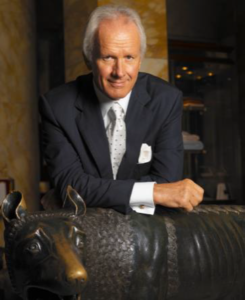 One of the two inaugural inductees for the decade of 1970’s is Roberto E. Wirth ‘75.
One of the two inaugural inductees for the decade of 1970’s is Roberto E. Wirth ‘75.
Roberto E. Wirth was the proprietor and General Manager of the Hassler Roma, and the first son of Oscar Wirth and his wife Carmen. Second-generation owner of the Hotel Hassler and representing the fifth generation of a famous hotelier family, he believed in carrying on the rich tradition of the Bucher-Wirth hotel dynasty. For almost two centuries, the Bucher-Wirth family has made a strong impact in the field of luxury hospitality and continues to do so.
The dynasty began with Franz-Josef Bucher, now considered one of the pioneers of the hotel industry in Europe. In the 1870s, Bucher bought and developed the Trittalp area of Switzerland, previously remote and inaccessible. Within a couple of years, he built several hotels and specialized in a new field, that of transportation and lift facilities, building funiculars, the Burgenstock railway and the Hammetschwand, still the highest chair lift in Europe. However, Franz-Josef Bucher’s real passion was the hotel business, and he soon realized that city hotels were much more profitable than those situated in resort places. Therefore, in 1890 he sent his son-in-law, Heinrich Wirth, to Rome to become the manager of the Hotel Minerva, in the city center and a few years later he decided to buy the Hotel Quirinale in Rome. In 1921, Oscar Wirth, Heinrich’s youngest son, followed in his family’s footsteps and became partner with a German hotelier, Franz Nistelweck, son-in-law of the Swiss Hotelier, Albert Hassler. Together they managed the Eden and the Hassler hotels until 1964, when Oscar became the sole owner of the prestigious Hassler hotel. The hotel’s excellent location atop the Spanish Steps and next to the Trinità dei Monti church provided it with almost unlimited potential. In 1939, Oscar demolished the building almost entirely in order to rebuild it. Thereafter the hotel was requisitioned by the U.S. Air Force to serve as their Rome headquarters during World War II. The new Hassler was finally opened to the public in 1947.
Roberto Wirth considered the Hassler his passion, home and family heritage. His commitment, dedication and personal touch were what have led the hotel to achieve its position as one of Europe’s top hotels and the preferred destination for the elite society’s sojourns in Rome.
Being born deaf, Roberto Wirth had been very active in various associations that strive to improve conditions for the deaf. He is the founder and president of CABSS (Assistance Center for Deaf and Deafblind Children), a non-profit organization that is dedicated to supporting deaf and deafblind children, and their families. The association focuses in particular on children from birth to six years and works with projects that promote an adequate cognitive, emotional, social, linguistic and communicative development, that allows children to fully express their personality. Moreover, CABSS, in collaboration with the Italian Fulbright Commission, provides study scholarships to deaf students to attend Gallaudet University, USA. He also sponsored several other philanthropic, cultural and artistic associations.
He established Il Palazzetto, a unique 16th-century Roman palazzo situated right by the Spanish Steps and just a few steps away from the Hassler. Il Palazzetto encompasses four intimate hotel rooms, and two spectacular panoramic terraces on the 4th and 5th floors as well as indoor spaces (open-air garden, library room and salone with a fireplace) on the second floor for private events.
Besides managing the restaurants of the Hassler and Il Palazzetto, he was also a consultant to several restaurants abroad, including the Italian restaurants “Travertino” of the Oberoi hotel, New Delhi, and “Vetro” of the Oberoi Mumbai.
Roberto Wirth was one of the Counsellors of the Association of Piazza di Spagna and Trinità dei Monti, after having been President from May 2012 until March 2015, his second turn in office after having been appointed President from 2003 – 2006. The Association safeguards and represents the interests of retailers and business owners who operate in the area (security, sanitation etc).
Mr. Wirth received numerous personal awards such as “Independent Hotelier of the World 2005” by HOTELS magazine, one of the most prestigious publications in the hospitality industry; the Prize for Economic Achievement by Rome’s City Government in an event presided by the city’s mayor (February 2006); the “Marco Aurelio” 2006 prize for Tourism from the Vice Mayor of Rome, Mariapia Garavaglia – this prestigious award recognizes those who have distinguished themselves in the Roman tourism sector, emphasizing the importance that tourism has for the economic and social life of Italy’s capital. In Nov. 2014 he was awarded the “Leading Legend Award” by The Leading Hotels of the World, for his commitment to the art of independent hospitality.
Roberto Wirth received a B.Sc. degree at Cornell University’s “School of Hotel Administration” (Ithaca, New York) as well as Honorary Doctorates in Humane Letters both from Lynn University (Boca Raton, Florida) in May 2006 and from Gallaudet University, in Washington, DC in May 2009. He is also one of the 8 deaf recipients of the DeafNation Inspiration Award (for Hotel Hospitality) which was granted in August 2012 in Las Vegas, during the first edition of what was to become an important international annual appointment.
In 2016 he was awarded with an Honorary Degree in Human Letters by the prestigious John Cabot University in Rome, Italy.
On June 14, 2018, in the occasion of the 70th anniversary of the Fulbright Program in Italy, the US Ambassador to Italy, Lewis M. Eisenberg awarded Roberto Wirth with a special prize for the commitment that for over 25 years he has dedicated to the promotion of the rights of deaf children from 0 to 6 years.
Roberto Wirth passed away on June 5, 2022 at the age of 72.
(Roberto Wirth’s biography was provided by the Wirth family)
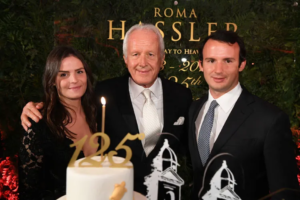
Roberto with his twins Veruschka and Roberto.
“If we were to describe our father in three words they would be: determined, generous, sincere. Since he was a child, his dream was to become the captain of his ship. the Hassler. Despite his handicap, his determination and strong-will led him to overcome all obstacles. Roberto Wirth was always generous at heart. He cared very much for the international deaf community, which was demonstrated by his many initiatives such as the scholarship at Gallaudet University, as well as the creation of CABSS, the non-profit association for deaf and deaf-blind children. Transparency was one of his many qualities, and he was never afraid to say things as they were.
The most important love of his life was the Hotel Hassler, as he would always say ‘The Hassler is the woman of my life, a woman to care for, treat with velvet gloves and love with all my heart’. Roberto Wirth was the perfect host. He was always ready to welcome hotel guests, from royalty to simple travellers. He was an icon for both the Hotel industry and the deaf world and will be greatly missed.” Roberto & Veruschka Wirth
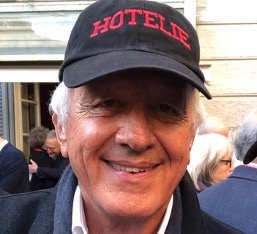 “Beyond an inspiration to me, Roberto will always be ‘Rome’s greatest Hotelie’. He was an industry hero who overcame the odds to set the standard for Roman hospitality driven by a divine love for his city.
“Beyond an inspiration to me, Roberto will always be ‘Rome’s greatest Hotelie’. He was an industry hero who overcame the odds to set the standard for Roman hospitality driven by a divine love for his city.
I met Roberto at the first CHS event I organized in Rome for the CHS AA&EE chapter meeting in 2015. His attendance to me was a sign of approval and an induction into an elite group of European hospitality leaders. He was generally a private person; events like ours were challenging for him to follow and engage in conversations with multiple people at once. But he felt comfortable around Hotelies and his presence was always magnetic.
Rome was his favorite city in the world. Rome was his home, and at the center of it all was The Hassler, where he welcomed and entertained casual friends and esteemed luminaries alike. His brand of hospitality was that timeless perfectionist type that’s so hard to pull-off these days. To Roberto it was second nature. Being profoundly deaf may have challenged his speech, but it only heightened his ability to observe, anticipate and accommodate the needs of anyone around him.
In 2018 I visited Roberto with my proposal to host the 2019 CHS EMEA Regional Meeting in Rome. I wanted his blessing more than anything. He was enthusiastic by the prospect of welcoming Hotelies back to the Eternal City. as he shared memories from his experience hosting the same meeting in 1982.
Cannes took the bid for 2019 but set Rome for 2020. We all know what happened next, but it was fate’s will that our Roman gathering should take place in 2022. Not only did we launch worldwide celebrations for The Hotel School’s 100th Anniversary but the year also marked 40 years since Roberto last hosted the European Hotelie community in Rome.
I’ll cherish forever the memory of standing next to Roberto at the Opening Cocktail for the 2022 EMEA Regional Meeting. Gathered in the courtyard of his Palazzetto, shaded by the Spanish Steps and The Hotel Hassler, we welcomed our Hotelie friends and comrades together. No one knew this would be his final CHS event, but it’s certainly a memory that’ll live on forever. The opportunity to follow in his legacy in Rome is one of the greatest gifts of my life.
Just a few weeks before our CHS meeting in Rome, Palmiro Noschese and I met with Roberto in the lobby of the Hassler. We discussed how Rome has changed since 1982, specifically the evolving hotel landscape. We noted the recent boom in hotel investment and development. Many of the world’s top luxury chains have sights set on Rome with trophy properties opening in the next few years. For Palmiro and I, we know other Roman hotel leaders have concerns over the threat of new international competition. We asked Roberto his opinion. Smiling, he replied, “I’m happy”. His eyes squarely set on us, he continued, “there’s room for all of us. And moreover, this is good for Rome. More luxury hotels will bring fresh ideas and improve the quality of other hotels in the city. We’ll all do better. Rome needs that. Rome deserves that.”
These are words to live by, spoken by a true leader and a consummate Hotelie.” Jonathon Dominic Spada ’10, General Manager, Marigold Restaurant and Micro-Bakery
“Roberto was a hotelier par excellence; the pride he took in his property was inspiring all the attentions to detail; his hospitality was of highest quality! When he showed me around The Hassler, it made me speechless, all the little details he and his team had accomplished were really of highest quality.
When I spent an evening with him it showed a great person a hotelier for life and considering how he went through Cornell being deaf and learning a new language; he left a legacy of everything is possible if you are motivated! When you consider that he also learned to speak it really showed that all is possible.
Roberto was a great supporter of the EMEA auction by donating every year a weekend at the Hassler Hotel which was an easy sell and raised a lot of money for our scholarships throughout the years! He was also a philanthropist helping deaf people he will be missed and remembered as a great Cornellian!” Deiv Salutskij ’71, Managing Director Deiv Salutskij Consulting
“The first time I met Roberto, I was excited and nervous at the same time. I was excited to meet such a true iconic hotelier and Cornell Hotelie. I was nervous as I didn’t know how I would be able to communicate with him. He made me feel at ease by letting me know he can read my lips. With his charm and smile, I felt like seeing an old friend.
At Leading Hotels, I often sought Roberto’s opinion on issues. He was the best of the best hoteliers. His feedbacks were always concise and impactful. Without the conventional voice, he honed his skills in listening and sharing his thoughts very much to the point. After speaking to Roberto, I always walked away with clearer perspectives.
When I stepped down from Leading Hotels, he wished me well and told me somewhat approvingly, ‘All the stuff you did with the brand, revenue, loyalty program and sales events, they were OK, some were even good.’ He continued, ‘But I will always remember what you did for me personally. You always arranged to have an interpreter at Leading Hotels events, so I felt at home and belonged.’ For Roberto, it was always about how we made people feel.” Ted Teng ’79, Former President, CEO of The Leading Hotels of the World
Roberto may not have had the conventional hearing and voice. But he listened and spoke with his heart. He had a keen sense of how he felt and how he made people feel. He did this with his love for life and the people all around him. He taught us to pursue our abilities not our disabilities. He left an indelible voice on the global hospitality industry and the Cornell Hotelie community.
“Ambassador of Hospitality”
 One of the two inaugural inductees for the decade of 1970’s is Drew Nieporent ‘77.
One of the two inaugural inductees for the decade of 1970’s is Drew Nieporent ‘77.
Everyone who aspires to operate a business starts with some kind of inspiration. Quite often it’s a memory from childhood that sets a whole career into motion. That’s how Drew Nieporent’s journey to become an “Ambassador of Hospitality” began. Frequent family dinners led to dining in French, Italian, Chinese, German restaurants, with many different themes. Drew tasted the foods of these diverse cultures and observed the work ethic of chefs and wait staff. He was fascinated by every aspect of the business in both the front and the back-of-the-house, and absorbed knowledge with enthusiasm and a sense of mission. There was a “Hospitality Gene” inside of him that propelled and motivated him.
He knew that he had to learn his craft and hone it with the best professional knowledge and inspiration. Following his 1973 graduation from Stuyvesant High School, Drew applied to the Cornell School of Hotel Administration. He knew that Cornell provided the challenge and instruction he needed to excel in the restaurant business. When Drew was accepted to Cornell it opened up several opportunities. As a freshman and throughout his 4 years at Cornell, he worked on the world class cruise ships, Vistafjord and Sagafjord, traveling the world. In 1977 he graduated from Cornell and began his management career with Warner Le Roy at New York City’s Maxwell’s Plum and Tavern on The Green. He then worked at the prestigious French restaurants Le Perigord, La Grenouille and Plaza Athenee’s Le Regence.
With the foundation of a Cornell education, and invaluable industry work experience, Drew Nieporent, went on to become one of America’s most respected and celebrated restaurateurs. He is the founder and inspiration behind the Myriad Restaurant Group, which operates currently operates Tribeca Grill, Nobu Downtown, Nobu Fifty Seven, Nobu London, Bâtard, and Crush Wine & Spirits. Over the last 40 years, Myriad has opened and operated over 40 restaurants around the world, including Seattle, Louisville, East Hampton, Boca Raton, London, San Francisco, Moscow, and even food service operations at Madison Square Garden and Citi Field in New York City.
Nieporent’s first restaurant, the groundbreaking Montrachet (1985), earned three stars from The New York Times and kept that rating for 21 years. In 2008, the restaurant reopened as Corton, maintaining its three New York Times stars and receiving two Michelin stars. In May of 2014, Nieporent reopened the space as Bâtard. Earning three stars from The New York Times, New York Magazine, and a coveted Michelin star. As 2014 came to an end, Bâtard landed at the top of several end-of-year lists, including the number one spot on The New York Times’ list of “The 10 Best New Restaurants of 2014”. In May of 2015, the restaurant won the James Beard award for “Best New Restaurant”.
Tribeca Grill (1990), with partner Robert De Niro and an all-star roster of investors including Bill Murray, Sean Penn, and Mikhail Baryshnikov, opened to national acclaim and continues to be one of New York’s landmark restaurants. The Grill has won the prestigious “Grand Award” from The Wine Spectator its world class wine list since 2002.
In 1994, again with partner Robert De Niro and sushi master Nobu Matsuhisa, Drew launched Nobu New York City to worldwide acclaim. Nobu NYC, Next Door Nobu, and Nobu Fifty Seven have all earned the coveted three-star rating from The New York Times. Nobu NYC was voted Best Restaurant in America by The James Beard Foundation. Nobu has gone on to open restaurants in all parts of the world.
Also in 1994, Nieporent was one of the few American restaurateurs to go bi-coastal. In collaboration with Robert De Niro, Robin Williams, and Francis Ford Coppola, he opened Rubicon in San Francisco.
Myriad’s excellence in wine service is widely acknowledged. It is the only restaurant group to earn three coveted Grand Awards from Wine Spectator Magazine – for Rubicon, Montrachet, and as previously mentioned, Tribeca Grill. In 2005, Myriad opened Crush Wine & Spirits, which was named the best new wine shop by Food & Wine Magazine.
As an Ambassador of Hospitality, Drew donates his time to dozens of charities. He is on the board of Madison Square Garden’s Garden of Dreams Foundation, Citymeals-on-Wheels, and DIFFA, an Honorary Chair of the City Harvest Food Council and Culinary Director of the Jackson Hole Wine Auction. He has co-chaired SOS’s Taste of the Nation event in New York City since 1997. He has been honored by Careers Through Culinary Arts Program (2009), American Heart Association (1999), the Tourette Syndrome Association (2000), Food Allergy Initiative (2001), American Liver Foundation (2003), Cancer Research & Treatment Fund (2005), and Kristen Ann Carr Fund (2006).
Drew Nieporent’s years at Cornell were an invaluable learning experience. The lessons learned at Cornell’s hotel school were essential to his career success. Cornell is always remembered with great affection, and is always in his heart.
Myriad Restaurants Chronology
Montrachet (1985)*
Tribeca Grill (1990)*
Della Femina (1992)
East Hampton Point (1993)
Harley Davidson Café (1993)
Nobu New York (1994)*
Rubicon (1994)*
Pine Island Grill (1994)
Restaurant Charlotte (1994)
TriBakery (1995)*
Layla (1996)*
Zeppole (1996)*
City Wine & Cigar (1996)
Steelhead Grill (1996)
Nobu London (1997)*
Freestyle (1997)*
Nobu Next Door (1998)*
Heartbeat (1998)
Coach House (1998)
Brant Point Grill (1998)
Nobu Las Vegas (1999)*
The Grill at Reebok Sports Club NY (1999)
Pulse (1999)
Icon (1999)
Earth & Ocean (1999)
95/45 & 10 Below (1999)
Berkeley Bar & Grill (2000)*
Lucca (2000)
15 RIA (2001)
Nobu 57 (2005)*
Centrico (*2005)*
Crush Wine & Spirits (2005)*
Proof On Main (2006)
Mai House (*2007)*
Corton (2008)*
Acela Club at Citi Field (2009)
The Daily Burger at Madison Square Garden (2011)
Batard (2014)*
Porsche Grille at Citi Field (2016)
Nobu Downtown (2017)*
Metropolitan Grille at Citi Field (2020)
(Drew’s biography provided by Myriad Restaurant Group)
To know Drew, you must see and hear him. This recent CBS Saturday Morning interview captures the essence of Drew’s extraordinary career.
https://www.youtube.com/results?search_query=drew+nieporent+cbs+saturday+morning
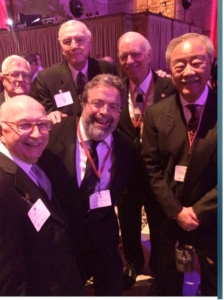
Drew and some legendary Hotelies: Rocco Angelo ’58, Bill Eaton ’61, John Mariani ’54, Drew, Jim Treadwell ’61, Michael Chiu ’66”
“Drew is truly one of the greats.
It goes without saying that he created some of the most innovative and impactful restaurants in America/ showing his creativity and range with the diversity of ideas he’s brought to life in restaurants from Montrachet to Nobu, and everything in between.
But the thing about him that has always inspired me most is the energy he brings with him when he walks into one of his dining rooms. He is the definition of bombastic hospitality- bringing warmth, excitement, energy, and enthusiasm to every table he touches.
If you happen to be in one of his restaurants when he comes through that front door, it’s an experience like no other. The feeling of being present in a magical world, alongside the guy that had the imagination to dream it up and the courage to bring it to life, is one of life‘s true pleasures. And when he walks over to your table, you always feel like the most important person in the world.
The restaurant business needs more people like Drew Nieporent. I’m grateful for all he’s taught me, and the myriad of beautiful ways that he has impacted our industry.” Will Guidara ’01, Restaurateur, Former co-owner of Eleven Madison Park, Author of Unreasonable Hospitality
“Drew Nieporent entering into the Cornell Hotelie Hall of Fame as the ‘Ambassador of Hospitality’ is a truly just one chapter of what his remarkable career has meant to the restaurant industry! Restaurateur, Visionary, Humanitarian, and overall incredible person!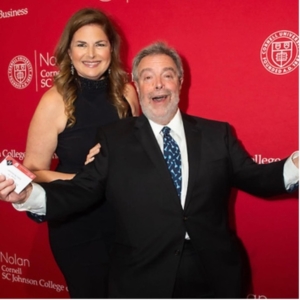
Every Cornell Hotelie with a passion for food and beverage has watched Drew’s every move for the better part of the last four decades. As Founder of Myriad Restaurant group, Drew blazed an extraordinary path with restaurants like Tribeca Grill, Nobu, and Montrachet. With Nobu Matsuhisa, Drew forever changed Japanese fine dining in America and around the world!
I remember a field trip to NYC with Prof. Tom Kelly where we dined at Tribeca Grill, met Drew and his team, and took a tour around Tribeca and Nobu. We were mesmerized and as we departed, I remember thinking I want to be like Drew! Congratulations! Elizabeth Blau MPS ’97, Founder and CEO, Elizabeth Blau and Associates
“I had the distinct pleasure of becoming a close friend of Drew’s during freshman year at Cornell and remained so ever since. Over and above being his friend, I was Drew’s driver in college. This ‘job’ allowed me to learn about Manhattan – its restaurants, theaters, and clubs – from the best, Drew and his Mom and Dad when I drove him home for the holidays.
Drew is the consummate restauranteur, and that is well known to anyone who has seen him in action, but more than that, Drew is a thoughtful, generous, and caring friend. One of the greatest lessons in my life came over dumpling soup in New York with Drew and my son John. Drew illustrated the importance of being there for a friend in a way that neither John nor I will ever forget, and it inspired me to adopt the mantra that friends default to ‘yes.’ That one lunch has caused both John and I to be there for friends’ special moments that we quite likely would not have were it not for Drew’s dumpling wisdom. By the way, as Drew promised, the dumpling soup was the best on earth.
Congratulations Drew – my friend – on this hard-earned and well-deserved honor.” John Longstreet ’77, Coach, Hospitality Leaders Group, LLC

Drew at his 45th Reunion.
Drew Nieporent received Cornell Hospitality Innovator Award at the 3rd Annual Icon and Innovator Award Gala. Here is a video of the event. The cast of the TV show Soprano introduced Drew.
https://www.youtube.com/watch?v=4p1iIQ7p3eg
How many of us have Andy Rooney talking about us on CBS’s 60 Minutes?
https://www.youtube.com/watch?v=RfMeL-45E1I
When the 1972 movie The Godfather was a huge success, the director Francis Ford Coppola was asked to make a sequel. He declined. The producers told him he had the “Coke formula” for movies and ask why he won’t make a sequel just like the first one. He said, “because I have made that already.” When he finally agreed to make The Godfather Part II, he made it completely different than the first one in the way the story was told. Drew approaches his restaurants the way a great movie director approaches a movie, one at a time. Each one is a new creation. The teaching at the Cornell Hotel School is about leading not following; it is about creating not copying; and it is about the total experience not some parts of it. Drew has learned well and went on to teach many, many more.
“You Need to Meet”
One of the two inaugural inductees for the decade of 1980’s is Philippus “Phil” Miller III ‘83
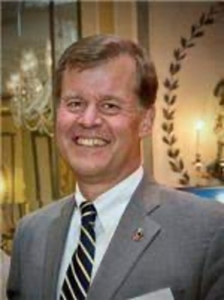 Rarely in life are we graced by the presence of someone loved by everyone they encounter. Phil was this unique individual. He gave of himself in service to others. He was especially aware and deliberate in seeking out that individual who felt out of place or lost and made them feel included. He made friends wherever he went and was constantly making connections and creating opportunities for others. He is famously known for saying “You need to meet…”. He was passionate about Cornell University and the School of Hotel Administration. Phil was first and foremost a devoted husband to his beloved wife, Yasamin, and their relationship was a joy to anyone privileged to spend time in their company. He cared deeply about his family as well his many close friends and cherished nothing more than spending time in the company of his loved ones. He buoyed everyone with his warmth, unforgettable laugh, and brilliant humor. He was quick witted, incredibly bright, and accomplished in all endeavors he approached. Phil was described by many in colorful terms that pay homage to the color and vibrancy of his life. ‘A dazzling conversational acrobat’, ‘absolute gentleman’, ‘witty, urbane and supremely intelligent’, ‘Cornellian extraordinaire’ are just a small sampling used to describe him.
Rarely in life are we graced by the presence of someone loved by everyone they encounter. Phil was this unique individual. He gave of himself in service to others. He was especially aware and deliberate in seeking out that individual who felt out of place or lost and made them feel included. He made friends wherever he went and was constantly making connections and creating opportunities for others. He is famously known for saying “You need to meet…”. He was passionate about Cornell University and the School of Hotel Administration. Phil was first and foremost a devoted husband to his beloved wife, Yasamin, and their relationship was a joy to anyone privileged to spend time in their company. He cared deeply about his family as well his many close friends and cherished nothing more than spending time in the company of his loved ones. He buoyed everyone with his warmth, unforgettable laugh, and brilliant humor. He was quick witted, incredibly bright, and accomplished in all endeavors he approached. Phil was described by many in colorful terms that pay homage to the color and vibrancy of his life. ‘A dazzling conversational acrobat’, ‘absolute gentleman’, ‘witty, urbane and supremely intelligent’, ‘Cornellian extraordinaire’ are just a small sampling used to describe him.
Born October 14, 1960, in Philadelphia, Pennsylvania, Philippus Miller III, age 58, passed away on Saturday, August 10, 2019, after suffering a stroke. Phil was a member of The Society of the Cincinnati, founded in 1783 at the end of the Revolutionary War by the Continental Army officers who fought the war of which George Washington was one of the founders. The Society of the Cincinnati is composed of one hereditary male descendent of each of those original officers. Phil is a fifth-generation grandson of Lt. Col. Caleb North, an original member. The purpose of the society is to perpetuate those early friendships, work to sustain the ideals of those who fought, be of assistance for the less fortunate, and to educate every generation that freedom was obtained at a high price. Phil was proud of this heritage but never high minded or boastful. The values of The Society were the roots to his life of helping others.
Phil attended The Haverford School and sang in the choir at both Haverford and the Bryn Mawr Presbyterian Church. It is there where he developed his passion for music, poetry, and history. Mount Desert Island Maine was a special place for Phil, and his dedication to a life of service started there, working summers at the Claremont Hotel as a teen.
Phil was a 1983 graduate of The Cornell University School of Hotel Administration. During his student days he was a member of the Cornell Glee Club, President of the Hangovers A Capella singing group, a member of Delta Chi fraternity, and nominated into the Quill and Dagger Senior Honorary Society, and remained very actively involved with all these organizations over the years.
His early career included roles with Hyatt Hotels, the Related Companies. Phil then moved to Guatemala to become a hotel manager in the Central American Highlands. He then went on to Kenya as operations manager of a safari camp.
In 1993, he returned to Cornell and spent 11 happy years as the Hotel School’s Director of Alumni Affairs and Secretary of its alumni association, the Cornell Hotel Society. Phil assisted the School’s 11,000 students and alumni in all aspects of their careers and encouraged their lifelong interaction with Cornell. He was the Executive Editor of the alumni magazine, supervised the operations of more than 60 alumni chapters worldwide, directed the efforts of hundreds of volunteers, and assisted one of the most active alumni associations in the world in its evolution from a print-based to an online organization. Under Phil’s leadership, the Society’s alumni engagement reached an all-time high.
Phil was also successful in his own entrepreneurial ventures. He founded and managed Philippus Miller III & Associates, a premier executive search firm in the hospitality industry. He was also a founder and a senior leader at Paramount Lodging Advisors, one of the fastest growing hotel real estate advisory firms.
His deep ties to Cornell University and the Hotel School continued until his passing as he was actively involved with students, faculty, and alumnae. Phil served as an Entrepreneur-in-Residence at the Cornell Hotel School’s Pillsbury Institute for Entrepreneurship, and secretary and former president of the Cornell Hotel Society Foundation
Phil was the consummate “Hotelie,” having dedicated most of his life to the university and hospitality industry.
Phil was a vibrant and active man, always ready with a smile, a firm handshake, and a story. He was a relentlessly energetic and positive force of nature. He was always up for an adventure or new experience, especially when it involved good food, travel, and meeting new people. Phil was a loving figure who believed in the greatness of people and their abilities. That he had so many true friendships and touched so many lives is a testament to his genuine interest in helping and serving others. Phil appreciated the nuances of life, always choosing to be persistently and relentlessly positive, radiating good cheer.
He lived by a very consistent code of morality, ethics, and perfect manners, and always set a standard to be admired. He was a gentleman. It takes a special person to elevate the school, build bridges, and nurture such a wide and diverse group of people around the globe.
“Phil” comes from the Greek verb meaning to love and no one embodied this more than Phil. He loved his family, friends, colleagues, and life and will remain forever in our hearts.
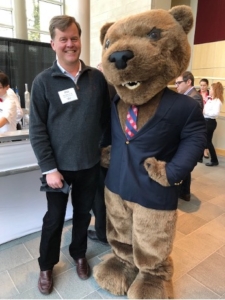
“What can I say about my dear friend, Phil Miller? Just over three years ago, the world lost one of the best humans I have ever met. Phil was one of my oldest friends as I met him in 1978 when he arrived on campus as a freshman with a squash racket and pink alligator shirt from the Main Line and I auditioned him for the Glee Club and Hangovers. We have laughed, partied, and sang together since that day. On the night before he passed, we were supposed to go out and celebrate in Ithaca with Phil’s wife Yasamin and our close friends the Mellors…only to be faced with the somber reality that at age 58, my vibrant, charming, and brilliant friend wasn’t going to join us for a classic fun-filled night of storytelling ever again on this earth. I personally miss him with every bone in my body.
Rarely does a week go by when one of my friends and colleagues doesn’t mention Phil. Comments like ‘What would Phil Miller think?’, ‘How would Phil Miller handle this situation’ and ‘Who would Phil Miller recommend I call for direction or advice’ are common. Phil was sought after in the hotel industry as the dependable and creative connector of people and ideas. His network wasn’t just rich with colleagues of all ages throughout our industry, but one of deep personal trust. Many industry professionals knew and trusted Phil with highly confidential topics but even if Phil had just met you, within minutes, he established a warmth and caring that many people never achieve with anyone. Phil developed friendships with everyone, but he was especially fond of those people that weren’t at the top of their career or seeking to make their next million dollars…. he simply wanted to help those that were most needy of a gentle shoulder and solid advice, always judgement-free.
Apart from the brief personal and professional anecdotes I have shared, I believe that Phil Miller will most often be remembered for transforming the Cornell Hotel School’s alumni affairs office from an active, but not always inspiring organization, to one of the strongest, energetic, and effective alumni associations of any kind in the world. The Cornell Hotel School, its faculty, staff, alumni, and students of all generations to come will reap the rewards of Phil Miller’s passionate dedication to his, and our, alma mater.” Russell Urban ’81, CEO, Electra America Hospitality Fund
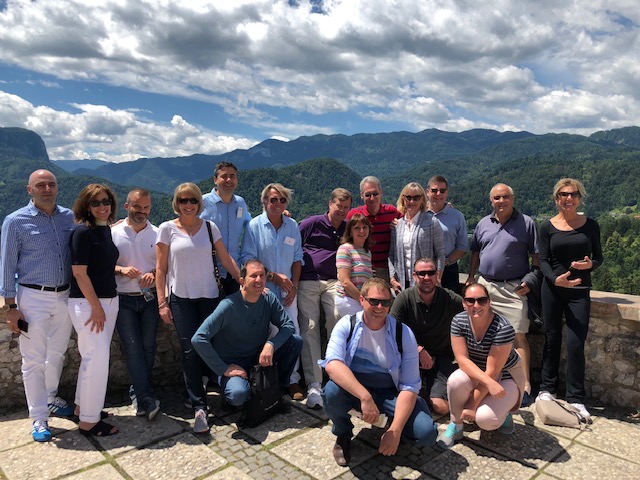 “Phil was the cornerstone of the Hotel School. He knew everyone. He was the real ‘linked in’. Not only he connected people, but he also took the time to listen and genuinely care. He always looked you in the eye and was always listening for ‘how can I help?’ His purpose in life was to be of service and he built a Hotelie family around the globe that did exactly that for each other”. Deniz Omurgonulsen Altug ’00, Vice President Membership, The Leading Hotels of the World
“Phil was the cornerstone of the Hotel School. He knew everyone. He was the real ‘linked in’. Not only he connected people, but he also took the time to listen and genuinely care. He always looked you in the eye and was always listening for ‘how can I help?’ His purpose in life was to be of service and he built a Hotelie family around the globe that did exactly that for each other”. Deniz Omurgonulsen Altug ’00, Vice President Membership, The Leading Hotels of the World
 “Phil’s endearing personality and genuine love of people will forever impact my perspective on the importance of making new friends and maintaining life-long connections to them. To see Phil ‘in action’ was to witness a master who knew the value of making others feel important and respected. He always wanted to learn as much as he could about every person that he met in an effort to see how he might someday help open a door for them to meet another person for professional advancement or simply pave the way for a new friendship to develop. Phil knew no strangers and showed by example that helping others was not just a philosophy he professed, but a mission he pursued his entire life. He left the world a better place, connecting so many people through his caring, humor, and selflessness. Phil made all of us better human beings.” Rick Adie ’75, Board Member, Cornell Hotel Society
“Phil’s endearing personality and genuine love of people will forever impact my perspective on the importance of making new friends and maintaining life-long connections to them. To see Phil ‘in action’ was to witness a master who knew the value of making others feel important and respected. He always wanted to learn as much as he could about every person that he met in an effort to see how he might someday help open a door for them to meet another person for professional advancement or simply pave the way for a new friendship to develop. Phil knew no strangers and showed by example that helping others was not just a philosophy he professed, but a mission he pursued his entire life. He left the world a better place, connecting so many people through his caring, humor, and selflessness. Phil made all of us better human beings.” Rick Adie ’75, Board Member, Cornell Hotel Society
“Phil was always so generous and giving of his energy, time, and expertise. All of us have heartfelt memories of ways in which he supported each and every one of us, including myself as a faculty member, fellow alum, and in my role as dean. In fact, Phil was one of the first to reach out to me, asking me how he can help. Phil was an entrepreneur-in-residence, and he guided and mentored our HLDP and HEC students. He would immediately take time to talk to any student seeking advice. His dedication to our school and students was both boundless and limitless. In the most meaningful ways, Phil reminded us all that life is service.” Kate Walsh MPS ‘90, Dean and E.M. Statler Professor, Cornell Nolan School of Hotel Administration 6/2016 – Present
“I knew Phil when he was a student and as man living a good life. Phil was one of the most welcoming individuals I have ever known. He greeted everyone with respect and a smile that expressed interest warmth and understanding. Whether it was his calm voice or the way he looked deep into one’s eyes, meeting and engaging with Phil always made people feel good. He was great at his work at the University by getting and keeping alumni involved, and in helping alumni network. His networking skills paid off with his successful executive search firm. Phil’s story telling is legendary and he was a fantastic singer with the Glee Club. Dean Beck used to tell students that the School of Hotel Management was an education in business unlike most other business schools. At the Peter and Stephanie Nolan School of Hotel Administration students are taught to be proficient in the financial side of business, but they become distinguished by their learning what the core of the hospitality business is all about. The core is not about money. The hospitality business is about creating good experiences that bring customers back: sustainable business practices. A great hospitality business makes strong and very personal connections with customers. Phil Miller reminded us with his character, kindness and presence that we can each make the next person we meet feel good such that they become friends who we want to meet again, and some we will miss and never forget.” Ezra Cornell ‘70, Life Trustee, Cornell University, CEO Cornell Pochily Investment Advisors Inc.
“So much has been said about Phil, it’s hard to add more. And so, this will be more personally anecdotal.
I first got to know Phil well when I became active in the CHS—going through the ranks from Chapter President on to CHS President in 2002. He was always so helpful and positive, not just in CHS matters but in any other way that would be helpful to me professionally and personally. ‘You need to meet….’ is apropos of what Phil was about. Knowing virtually every Hotelie in some fashion, he was the ultimate networker and connector in our milieu. He was the kind of person who made one feel like you were his best friend, even though that couldn’t possibly be true, with all the relationships he had.
When my daughter, Allie ’07, arrived on campus in 2003, I took her down to Phil’s office to make the introduction. ‘Allie, you need to meet Phil Miller.’ Phil warmly greeted us and proceeded to invite us to lunch at his favorite Collegetown restaurant where he waxed wisely about how things worked in the Hotel School and how important it was to be active in CHS.
When my son, Tyler graduated MMH ’10, Phil, in his executive search capacity. gave him career advice and as the years went by, made important introductions for him.
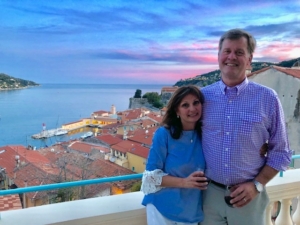
I was on campus in various roles from 2006-on and Phil and Yasamin were always down for going out to dinner or hosting me in their home. Forever knowing who was in town, there many nights when a whole gaggle of Hotelies were trying out the newest restaurant; of course, he was friends with the owner.
Today, I still find myself thinking, ‘I’ll just ask Phil; he’ll know what’s going on.’ Alas….
So, Phil lives on in our psyche but it’s important to support his memory and sustain our Hotelie culture through the Phil Miller Legacy initiatives.
There were two funding initiatives created in honor of Phil to further his tireless effort on behalf of the students. They are called the Phil Miller Hotelie for Life Prize and the Phil Miller Legacy. Both of these programs are already launched and supporting deserving students and future Hotelie Ambassadors. Joe Lavin ’75, President, Harborstone Hospitality
“Patron Saint of Service”
One of the two inaugural inductees for the decade of 1980’s is Giuseppe Pezzotti ’84 MPS’96
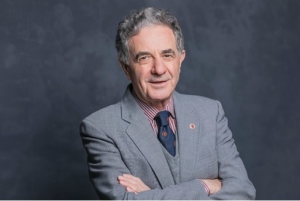 Giuseppe studied hospitality in Lignano and Piano d’Arta, Italy and worked in Grand Hotel Pineta Palace and Grand Hotel Royal Viareggio. After being awarded first prize at the Italian Hotel School in Viareggio, Pezzotti held positions on luxury liners of both the Italian Line and Swedish American Line, as well as the Rainbow Room before coming the Cornell Hotel School to study as an adult student during the Dean Robert Beck administration. He remembers fondly his interview with Mrs. Cheryl Farrell.
Giuseppe studied hospitality in Lignano and Piano d’Arta, Italy and worked in Grand Hotel Pineta Palace and Grand Hotel Royal Viareggio. After being awarded first prize at the Italian Hotel School in Viareggio, Pezzotti held positions on luxury liners of both the Italian Line and Swedish American Line, as well as the Rainbow Room before coming the Cornell Hotel School to study as an adult student during the Dean Robert Beck administration. He remembers fondly his interview with Mrs. Cheryl Farrell.
Upon graduation in 1984, with his extensive international hotel experiences, he had opportunities to join the Waldorf=Astoria, St Regis, the Ritz, Crillon and Plaza Athéneé in Paris, the Savoy in London, the Rainbow Room in New York City as well as Castello Banfi. But a very persuasive team of Steve Mutkoski ’67 and Tom Kelly ‘71 convinced Giuseppe to teach a Food and Beverage Operations class at the School. Almost forty years later, he never left.
When asked what he likes about teaching, he said “it is such a joy to share with students the knowledge I have gained over the years in this industry which I am so passionate about.” For Giuseppe, teaching is his mission. “It is beautiful to share what God has given us.”
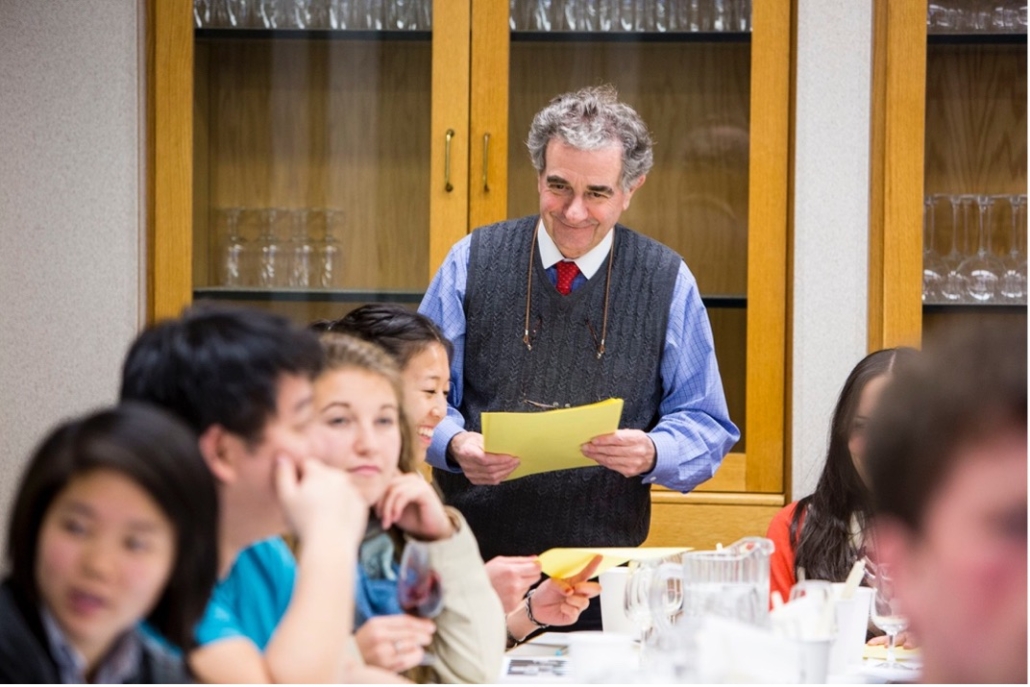
To Giuseppe, there are no best or worst students. They are all different, like fingerprints. They are not just students; they are human beings. He makes it a point to memorize the names of each student at the beginning of the semester so they will feel his attention individually. Behind every student, he sees the hopes and dreams of their families.
For almost forty years, Giuseppe worked tirelessly at the School. He would also teach summer schools and professional development programs. He would take students on field trips to visit restaurants and hotels, often operated by Hotelies he has taught. In 2003, the Giuseppe Pezzotti Scholarship in Food and Beverage Management was established for a student studying food & beverage management at the School of Hotel Administration.
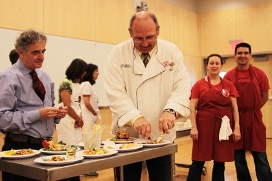
Giuseppe with Chef Robert White
Some faculty members are more focused on teaching. Some on research and some on industry projects. Giuseppe has always been known as the go to person at Statler for career or personal advice. He helps every student who comes to him whether they were assigned to him or not. His advice has always been out of personal experiences and caring for the students.
Giuseppe feels very grateful for the support from his colleagues over the years. Particularly instrumental in developing his teaching practice were Vance Christian, Steve Mutkoski, Tom Kelly as well as Dean Jack Clark and Chef Robert White. “We do our best work when we are supported and appreciated by our team members.”
For anyone who has taken a class will remember Giuseppe’s Quote du Jour. Here are some to bring back memories:
Guiseppe has a passion for music and would start his classes with a song selection from varied genres. He also loved Formula One cars, especially Ferraris, which he had been an enthusiast since his younger days in Italy.
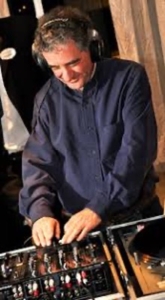
Giuseppe DJ’ing at HEC
There is only one person Giuseppe loves more than Cornell and its community, and that’s his late wife Debbie. She was his soulmate, his constant companion, and his raison d’être. For him, she enabled him to pursue his passion of teaching.
“Guiseppe Pezzotti truly defines the word ‘hospitality’. He was unquestionably one of my most influential professors at Cornell. He taught us not science or finance but the true art of genuine hospitality that defines our industry.
On the first day of class Guiseppe went around the entire lecture hall addressing individually each student in the incoming Master’s class. Years before the Internet, when you could simply Google the names and faces and backgrounds of every student, Guiseppe performed an astonishing welcome to each and every one of us! He had never met any of us and yet he did not miss a face or a detail of our lives and background. It was extraordinary! It was a welcome like none other and set the tone of what an extraordinary graduate program.” Elizabeth Blau MPS ’97, Founder and CEO, Elizabeth Blau and Associates
“Following his successful pursuit of a Hotel School degree, Giuseppe decided that he wanted to start a new career in teaching. Little did we know what a great teacher he would become, and how positively he would affect every student in the many classes he taught during his career at SHA. From his incredible capacity for memorizing in advance, the name of every student in his classes, to the kind and supportive attitude he brought to all, he will always be remembered as the ultimate professional F&B person, by all whom he taught, and all his colleagues during his tenure at SHA.” Mac Noden, Senior Lecturer-Retired, Cornell School of Hotel Administration
“Giuseppe’s loyalty and contributions to the SHA over the many years he served the SHA was outstanding!! He was excellent at helping the students find jobs both Summer and upon graduation due to his strong industry connections. The students loved it!! He was wonderful to the faculty also, especially those like me who had not worked in the industry per se but had good, related industry/corporate experience that he could then help us with to make the ‘transition’ so that we could then properly help our SHA students in our classes/labs.
What’s even more amazing than the quality of his aid/suggestions –was the pleasantness of his aid and his willingness to be so helpful to all at the SHA!” Jack Clark, Dean Emeritus, Cornell University, Dean 7/1981 – 12/1989
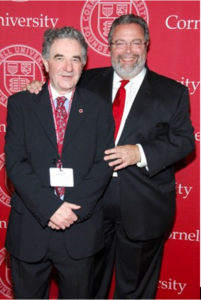
“When I think about Giuseppe, I think about the importance of human connections! I first met him 34 years ago when I stepped into his office to meet with him as my faculty advisor. We spent the next thirty minutes not talking about what classes I would take or what I was interested in studying but about where I was from, about my family and what had made me want to attend Cornell. He truly wanted to know who I was so that he could be the best advisor to me both academically and personally! Many years have passed but each time I see him he will ask how my mother is doing, my brother and even remembers the name of my freshman year roommate! He was and is a great advisor but an even better friend who realizes the importance of connecting people.” Keith Barr ’92, Chief Executive Officer, InterContinental Hotels Group
“Giuseppe was the most influential faculty member I had during my time at the Hotel School. His deep knowledge, passion and warmth have provided inspiration for hundreds of industry leaders. I am honored to call him my friend and colleague.” Anthony Capuano ’87, CEO Marriott International
“Leading the Globe Around Luxury Hospitality”
Our inaugural inductee for the decade of 1990’s is Liv Gussing Burgess ‘91
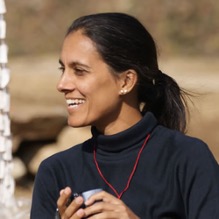 Destined for a life of international hospitality…
Destined for a life of international hospitality…
From the get-go, Liv was destined to explore the world and connect with its many rich and diverse cultures. As a child, she lived in Sweden, Ethiopia, Somalia, and Switzerland (her father was with the International Red Cross) while her summers were spent in her mother’s native Kenya. Before arriving at Cornell, she had also spent time as a housekeeper and waitress, honing her service skills whilst mastering four languages. These formative years laid the groundwork on which she would later forge the remarkable career in global hospitality.
Liv quickly dived into all that was on offer at Cornell, recognising that she would find her learnings from books, professors, and activities. During these years she served as Managing Director of HEC 1991 as well as Function Manager of the main banquet at HEC 1989, serving 1000 guests in Barton Hall, as she describes: “We were three foolish sophomores and one senior who saw no limitations. We built a stage in Barton Hall and a troupe of Cornell dancers performed a scene from Phantom of the Opera. We served a five-course dinner to 1000 guests. We had a vision, we worked hard, and we found solutions every time someone said no.”
Liv also remembers starting a business as part of a management class, making, and selling sandwiches to students late at night around campus; “It was not a very successful business,” she says “but it was a valuable lesson in how important it is to select the right business – and the right business partners.”
Following her graduation from Cornell, Liv joined the historic, luxury St Regis hotel in New York City as a butler, catering to guests as varied as singer Harry Connick, Jr., the prime minister of Sweden, and the Thai Royal family. “We were trained by an English butler who taught us how to make and pour tea, pack and unpack, and run a bath as well as the fine-tuning that it takes to provide discrete and personal service to the global traveller.” This hands-on experience taught Liv about that ‘invisible’ line when serving guests in their bedroom, their private sanctuary.
A year later, she left New York for Asia, where she would spend the next 18 years. Her first role was developing and implementing operating procedures for five-star Dusit Hotels and Resorts, based in Bangkok. Following this, Liv moved to the company which would truly shape her career, Aman Resorts. Liv spent 14 years with Aman Resorts, where she worked closely with visionary Indonesian hotelier Adrian Zecha, whose properties became the byword for innovation, elegance and style. It was here that Liv’s global experience and cultural understanding honed her ability to lead teams forward with a shared vision and deliver the highest levels of luxury in the guest experience.
Liv proved a key asset to Aman Resorts over the years, including expanding the legendary Aman brand and culture around the globe in resorts in Marrakech, Wyoming, Java, and Tahiti, as well as Aman’s first spa at the flagship Amanpuri Resort in Phuket, Thailand. She also served at the helm of the groundbreaking and acclaimed Amandari resort in Bali, Indonesia as General Manager.
In 2010, Liv, with her husband and two children, left Asia for the United Kingdom This also marked the launch of her own business; Luxury Hospitality Consulting where she “navigates the way for luxury hotel owners and operators to define, deliver and celebrate their unique value.” Without her multitude of experience, it would be impossible for Liv to carry out the dream of her clients, whether in hotel developments, brand strategy or operational excellence.
With a visionary understanding of successful global hospitality, Liv can hold a hotel up to the light like a beautiful gem and know which unique details will make it dazzle from every different angle. Her expertise, creative passion and insight provide the guidance and inspiration to transform a unique brand vision into a successful reality through powerful innovation, strategy and operational excellence. Whatever the context, the goal is to keep questioning and redefining the ever-evolving notion of luxury, forever reaching higher.
Through Luxury Hospitality Consulting, Liv has served clients as varied as Six Senses Shaharut, Airelles in France, and Lord Beaverbrook in the U.K. with ongoing projects being the opening of RH Guesthouse New York and the restoration of a state guest house in the Middle East with Snohetta architects.
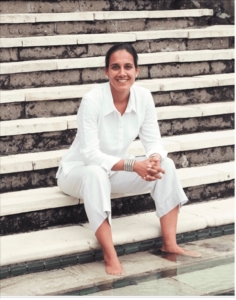
Since graduating, and throughout her global career, Liv has been actively involved with Cornell. She is a life-time Cornell University Council Member and serves as Chair of the Cornell Club of the United Kingdom. She has also been a University nominated alumni trustee, served on the Dean’s Advisory and was Global President of the Cornell Hotel Society in 2013. She has hosted CHS regional meetings in Thailand, Myanmar and the U.K. Liv has also earned a Masters in Tourism and International Development and co-authored a paper for Annals of Tourism Research.
“I have always come to the same conclusion… all the great ideas in the world – design, location, style – are nothing without the right people. I have known and worked with Liv for over two decades. She is inquisitive, focused and delivers. But above all, she connects and brings people together.” Adrian Zecha, Founder, Amanresorts
“To pinpoint one thing about Liv is impossible, as she is the epitome of what it means to be a Hotel School graduate. In 2008, my family and I visited her in Bali, Indonesia when she was appointed Aman’s first female GM. As my daughters were 6 and 4, I was apprehensive about bringing such young children to what was/is one of the most luxurious resorts in the world. Not only did Liv make my family feel at home, she brought her own daughter, Isara, to entertain them, and they remain friends almost 15 years later. However, what has always stood out to me was how Liv makes everyone she meets feel special. From the most discerning travelers and hotel owners in the world, to the village community that provides the staff that operates the Amandari, her humility, her grace, and the legacy she will leave in the luxury hospitality space is what makes her the consummate Hotelie and deserving of this award.” Baron Ah Moo, MPS ‘93, Managing Director, Head of US, PKF hotelexperts LLC
“I met Liv when I returned to Bangkok after graduating from Cornell. She was working there at the time, and through the Hotelie connection we quickly became good friends. We decided to start the Thailand Chapter of CHS, organized the second CHS Asia Pacific Conference in Phuket, and raised money to build a school in a remote part of Northern Thailand.
I have always admired Liv for her leadership, determination, self discipline and resilience. She was also compassionate, empathetic and always made time for her close friends and family. She has been a great role model and inspiration for others including myself, and my involvement with CHS has been largely because of Liv.” Regan Taikitsadaporn, BS ’93, Chief Human Resources Officer at Marriott International
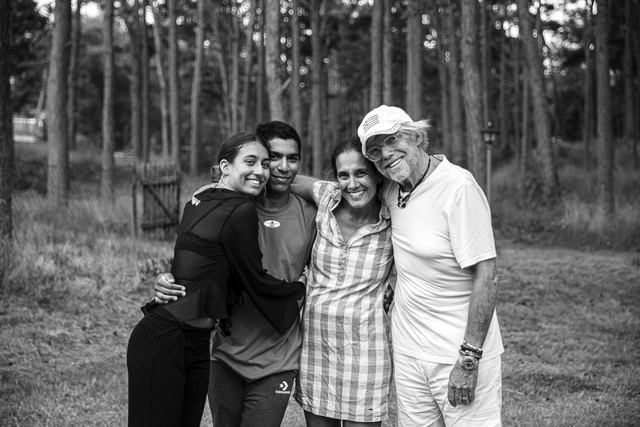
“Providing Service through Service”
Our inaugural inductee for the decade of 2000’s is Ben Justus ‘08
 “Providing Service through Service”
“Providing Service through Service”
Not everyone dreams of starting their career after graduating from Cornell Hotel School by joining a corporation or working for a luxury hotel. Ben Justus is an example of someone who took the “road less traveled”. His aspiration was to use his hospitality experience to help others to achieve their own dreams. During his travels to several developing countries while in college, he realized that there were many young adults who needed a bit of help, and when given that opportunity they will be able flourish and make a big difference in their livelihoods as well as that of their families and communities. Shortly after graduating from Cornell, Ben packed his bags and headed to Cambodia with no concrete plan other than a goal of starting an organization to help underprivileged youth prepare for a career in hospitality. His story was told in the following Cornel Hotel Society article:
Hotelies Unite To Change The Fortunes Of Cambodia’s Youth Through Hospitality
July 9, 2016/in Conversations/by Robert Mandelbaum
Seth Godin’s latest book, Tribes, describes the culture-altering impact leaders have by simply building tribes of like-minded, passionate people eager to contribute. There is perhaps no better example of this than Hotelie Ben Justus ’08 and his organization Everything’s Gonna Be OK (EGBOK). EGBOK, a nonprofit hospitality training school that is changing the face of the hotel industry in Cambodia, owes its creation, in large part, to the network of Cornell Hotel Society alums eager to help Ben turn his vision into a movement — one that’s impacting lives across Cambodia.
From the beginning, Justus knew attending Cornell was a privilege and developed a deep conviction that he wanted to use that privilege to give back. Although he originally wanted to work with underserved kids, visiting Cambodia on a Spring Break trip inspired him to modify his vision. He noticed how often people are inclined to help children in need, but the young adult population is mostly ignored. This shifted his focus to helping 18 to 22-year-old get practical, real-world training, creating distinction from other NGO schools set up to serve the country’s youth.
Cambodia, a country torn apart by civil war and genocide, desperately needed regeneration in its hospitality industry. Moreover, its people are exposed to human trafficking and have few opportunities for education or advancement.
After failing to find an organization worthy of donating the $36,000 he raised while at Cornell by selling t-shirts, and then realizing that teaching hospitality classes in a Cambodian orphanage didn’t equip students for independent life and work, Justus decided to found his own hospitality vocational school: EGBOK. Taking a holistic approach, EGBOK recruits Cambodia’s must vulnerable and trains them not only in hospitality but in life skills; it then finds them internships and jobs and continues to offer professional development to alumnus who are working in the hospitality industry.
What’s been truly amazing about the success of EGBOK is that it was built on the backs of volunteers, many of whom are Hotelies. Justus’ passion to see his students succeed has inspired countless others to not only give financially but to contribute their time and skills to equip the school and students for success. His model is impressive: many people — because they have no experience with educating children in a third-world country — feel they have nothing to give. But Justus invites them to use the knowledge and training they do have to give to the school in unique ways, from helping out with accounting to creating the organization’s website. Over two dozen Hotelies have volunteered since the school’s creation — a fact even more impressive when taking into consideration the requirement that all volunteers must give at least three months of their time.
EGBOK’s continued and growing success is thanks in large part to the CHS alumni network, as well. Several of the people sitting on EGBOK’s Board of Directors are Hotelies including Marge Ferguson and Barry Bloom ’86 [and later Regan Taikitsadaporn, ’93 and Osman Khawaja ’01 also joined the Board]. And the school simply would not be where it is today if it weren’t for the CHS Asian Pacific Regional Conference in Singapore. This conference enabled Justus to meet many people who had insight into the region and were able to provide invaluable advice and contributions. One such person is Osman Khawaja ’01, another Hotelie.
When Justus met Khawaja at a CHS conference in Siem Reap, Khawaja had already heard about EGBOK from another MMH volunteer, Kathryn Miller ’11. And, once he met Justus and volunteered at the school, he decided to fully commit himself to the school and served first as its Country Director and now [2013-2016] serves as its Executive Director.
“The CHS chapters are a great way to stay connected with fellow Hotelies and hear about all the remarkable things happening in the world of hospitality. It was there where I found the links to make the move to the non-profit sector and where we continue to find the much-needed support for EGBOK.” Osman Khawaja ’01, Executive Director, EGBOK
Justus, when asked about CHS’s impact on EGBOK, said that the alumni network has been incredible; that it’s been great to be a part of a worldwide group of people who are willing to throw their talents into a growing nonprofit.
Godin claims that, “great leaders create movements by empowering the tribe to communicate [and] to make connections.” This is evident in Justus’ work; particularly in the way Hotelies across the globe have joined his movement to empower the people of Cambodia.

Family Day – opportunity for parents to visit EGBOK to see where their children live, study, and do their internships.
Since the inception of EGBOK in 2009, the school has helped over 400 students launch their hospitality careers, many of whom have gone on to work in world class hotels and taken on leadership roles in the hospitality industry. In 2016, Spoons Café and Restaurant was added to the campus of EGBOK which provided additional learning space and expanded the program’s food & beverage curriculum, offering hands-on training in both restaurant service and culinary.
Under Ben’s vision, leadership, and guidance, EGBOK became a well-established and reputable hospitality and life-skills training facility in Cambodia. Ben knew that at some point, EGBOK needed to be a Cambodian run organization serving the local Cambodian community. With the adverse impact of COVID on tourism and foreign donations, Ben felt this was the opportune time to turn a crisis into opportunity by transitioning and localizing the leadership of the organization, both at the Board level as well as the leadership of the day-to-day operations. EGBOK was rebranded as SPOONS Cambodia Organization and continues to thrive today under a complete local leadership team.
What started as a dream and a leap of faith has materialized into a reputable not-for-profit hospitality school and restaurant that has enabled hundreds of underprivileged Cambodian young adults to become self-supporting through opportunities in the hospitality industry. The beneficiaries of this program have gone on to help improve the livelihoods of their parents, children, and communities.
Ben has always been very humble about the lives he’s impacted through EGBOK. His story reminds us of the opportunity we have been given, and to help those less fortunate to find opportunities for themselves as well. He shared his story at a TEDxCornellU Talk (Hospitality Dreams: Ben Justus) in which he beautifully summarizes his dream in the closing remarks:
“My hope is that the future generation of Cambodians can be born dreamers. Everyone deserves to have a dream…” – Ben Justus, ‘08
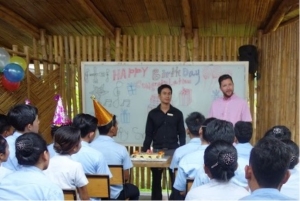
Ben celebrating students’ birthday.
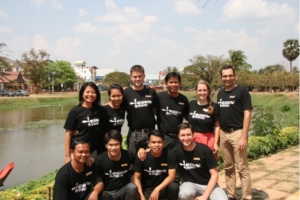
Ben with the local team
“From the beginning – Ben’s first freshman semester when he was my student and then later my TA — it was evident that here was a thoughtful, kind, and smart young man. Now fast forward to soon after Ben’s graduation: Ben returned to campus to sell T-shirts to support his new nonprofit EGBOK, which provided life and job skills to underserved Cambodian young adults. Then he asked if I had any books I could donate as well. Well, now I thought of Ben as a thoughtful, kind, smart, and a bit naïve, young man. I got 3 out of 4 character traits right, plus a t-shirt.
Ben’s vision, as ambitious and foreign as it initially sounded, became a reality. It wasn’t overnight and it wasn’t easy, but Ben was not to be dissuaded. His conviction, mission and compassion were contagious – not only inspiring my husband Dave and me, but many Hotelies to volunteer at EGBOK, where we had the honor of interacting with a remarkable community of young adults and staff who, I think it is safe to say, changed many of our lives.
It is so gratifying to see Ben nominated as one of the first CHS Hall of Fame inductees. It not only recognizes Ben’s contributions to the global Hotelie community but reminds us all how we can be of service to those who have not been as fortunate with so many life opportunities. The saying “To whom much is given, much is expected” has never felt more true.
Ben has shown us Cornell Hotelies how the hospitality industry can be part of something greater than ourselves. The baton has been passed. Thank you, Ben. May we all live up to the life of service you have shown to be possible. Barbara Lang ’78, creator of Puppets for a Purpose, Former Lecturer, Cornell School of Hotel Administration
“I first met Ben when he was an undergraduate student at the Hotel School and he spent the summer of 2006 when he worked as a hotel real estate analyst on my team at CNL Hotels & Resorts. While Ben clearly had talent that could be utilized in the hotel real estate industry, when I saw him next in 2009, he had already envisioned the organization that became EGBOK. I got involved immediately with local events in Chicago and joined the Board of Directors when it was formally established in 2014.
Ben’s vision for service is exemplified in the work EGBOK did in enabling underserved young adults to be self-supporting by providing education, training, and social services to enable them to enter the burgeoning hospitality industry, primarily in Siem Reap, with continued follow up by the organization in support of its alumni. The development of Spoons in 2016 furthered EGBOK’s mission by providing culinary curriculum and significantly increasing the number of students served in what was an admirable effort to help make EGBOK self-sustaining.
Ben’s efforts in starting and nurturing EGBOK are truly exemplary, particularly at such an early age. Ben’s wisdom and maturity were further evidenced by his stepping away from an active role as Executive Director in EGBOK in 2015 and the difficult decision as Chairman of the Board to transfer EGBOK’s assets to a local organization during the COVID-19 pandemic.” Barry Bloom, Hotel ’86, MBA ’01; President and Chief Operating Officer at Xenia Hotels & Resorts
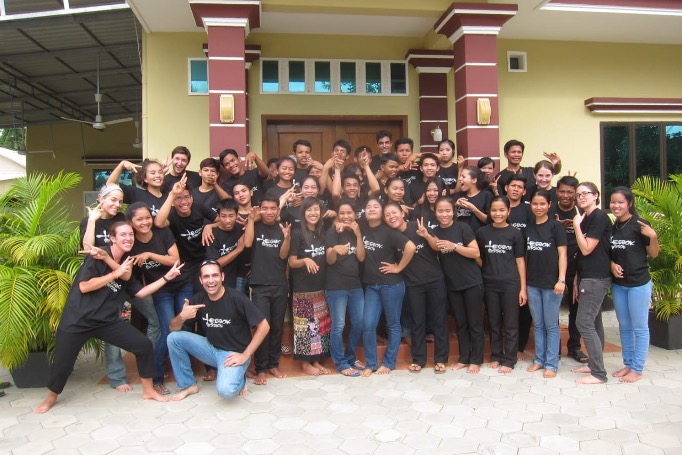
Volunteers, staff and students group photo in 2013.
“I was completely inspired and moved by Ben’s story when I first heard it at HEC in 2010. It was especially meaningful to me considering it took place in my part of the world. Upon returning to Asia, I became a regular supporter of EGBOK, and in 2016 Ben asked me to join the Board which I gladly accepted.
What Ben did took a lot of courage. While most people look for well-paying jobs first before considering giving back to the community, Ben did it the other way around. His dream has paid off handsomely, not in wealth but in livelihoods and communities that are better off because of what he did. His story will be told for many years to come, and the lives that has been and will be impacted because of his courage will continue to multiply manifold.” Regan Taikitsadaporn, ’93; Chief HR Officer – Asia Pacific, Marriott International
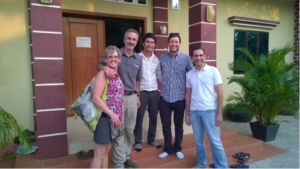
International volunteers who helped teach and setup the Spoons restaurant.
“Ben’s vision inspired me and so many of us. Working closely with him over 4 years deeply impacted my own life and direction. I remember Ben put a lot of trust in the team and recognized the potential in each individual to let them define direction and find the best way forward to fulfill EGBOK’s vision. His commitment to develop a Cambodian team for long term sustainability of the organization has come to fruition as evident in the transition of EGBOK to a Cambodian organization led and run entirely by a Cambodian team.” Osman Khawaja ’01; Executive Director, Phare Ponleu Selpak, Cambodia
“The lives of 420 students, 60% of which are females, have been changed because of this initiative started by Ben Justus. From remote disadvantaged youths, they become professionals through life skill development and working in the Hospitality industry. Ben remains a legacy to Cambodian’s citizens. He is our Cambodian team’s role model and that is why we continue his mission to bring benefits to people who need us the most.” Sophany Mao, Executive Director, Spoons Cambodia Organization (formerly EGBOK)
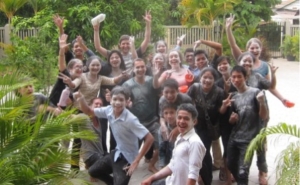
Celebrating Khmer New Year with the team and students.
“Starting in high school, parlayed a passion into a customer acquisition strategy by developing expertise in an uncontested space.”
Our inaugural Rising Star award goes to Rob Karp ‘19
 November 26, 2012 was a chilly fall day and Rob Karp was a few months into his sophomore year of high school. He had just returned from the Westchester County Clerk’s office, to which his mother drove him to and from, to open a limited liability company (LLC), Karp Enterprises. It was the day before Rob’s 15th birthday and the birth of MilesAhead! As the first business card read, “Luxury Travel Made Affordable.”
November 26, 2012 was a chilly fall day and Rob Karp was a few months into his sophomore year of high school. He had just returned from the Westchester County Clerk’s office, to which his mother drove him to and from, to open a limited liability company (LLC), Karp Enterprises. It was the day before Rob’s 15th birthday and the birth of MilesAhead! As the first business card read, “Luxury Travel Made Affordable.”
While the story began here, a seed was planted long ago. Rob took his first flight at six months, traveling between White Plains (HPN) and Minneapolis (MSP), back when Northwest flew their RJ-185. That was what travel looked like in his childhood, flying to see family and seeking thrill from looking outside the window at 30,000 feet. As Rob grew up, he took a liking to Microsoft Flight Simulator, a computer game where you virtually fly planes. At age 9, he was moonlighting as a pilot for Delta Virtual Airlines, filing flight plans for transatlantic and transpacific routings. Mornings consisted of take-offs and setting flight plans so when he returned from school it was time for landing.
As time went on, Rob became intrigued by how to buy plane tickets. He began reading blogs about miles/points and attended the New York Times Travel Show, where he met Brian Kelly, the infamous “Points Guy.” His friends, endearingly, referred to him as “The Points Kid.” This interest spawned into planning family trips and figuring out how to fly in the front of the plane for less than coach. For Rob, it was an exhilarating puzzle, and he was determined to solve each one. Soon enough, he was (unofficially) helping family friends secure international mileage tickets at a fraction of what they found. Unintentionally, a business was forming, and with the appropriate dose of encouragement and seed funding from a season of soccer refereeing, it was born.
Rob spent much of his high school days on the phone with airlines and speaking with clients, after soccer and debate club, of course. His dad raised him on the principle of “your word is your bond”, which he took to heart. In the spirit of a teenager seeking to gain the trust of adults, and to handle their travel arrangements no less, Rob did whatever it took to take care of his clients. In turn, this led to influx of referrals, many of them thanks to the “Chappaqua Moms” facebook group. The high school kid could maximize your points and maybe even for business class to Europe!
Senior year, Rob was accepted to Cornell’s School of Hotel Administration. It was a dream come true. Funny enough, he planned to close down MilesAhead for freshman fall, the plan was to enjoy college with no distractions. That was all well and good until he met a couple of amazing people at school who believed in the vision and wanted to climb aboard. It was the start of hiring a fleet of students who supported the business for the next four years. The quasi “office” was the Pillsbury Institute of Entrepreneurship, a formative and special place for him. Slowly, but surely, MilesAhead evolved from just booking flights to planning luxury travel.
At Cornell, the company booked flights for Micato, a luxury safari operator, and created a partnership with their charitable arm, Huru. Over the course of four years, MilesAhead was able to donate several hundred thousand dollars and help hundreds of young women in Nairobi stay in school. Junior year, Rob and team were tasked with arranging a two-week safari for fifteen people over the busiest time of the year, and it went off without a hitch. That was a moment when he realized there was a world of opportunity that lay ahead.
May 2019 was graduation, not only for Rob, but also for MilesAhead. They were moving into offices in New York City and now a business comprised of full time employees. There were ambitious plans to grow the business…and then COVID happened, it was survival mode. Rob’s goal was to retain as many as employees as possible as close to their full salary. And he did just that. Thanks to navigating government relief programs and wise guidance from his advisors, MilesAhead made it through the pandemic and now is ten strong, the largest the organization has been in its history.
Today, MilesAhead is a luxury hospitality company creating unforgettable experiences of the highest quality. They deliver an elevated luxury experience through planning, managing and executing bespoke travel arrangements for individuals, families and executive teams. For Rob, it’s just the beginning, as he aspires to grow the business into a company representing $1billion of travel sales by 2032.
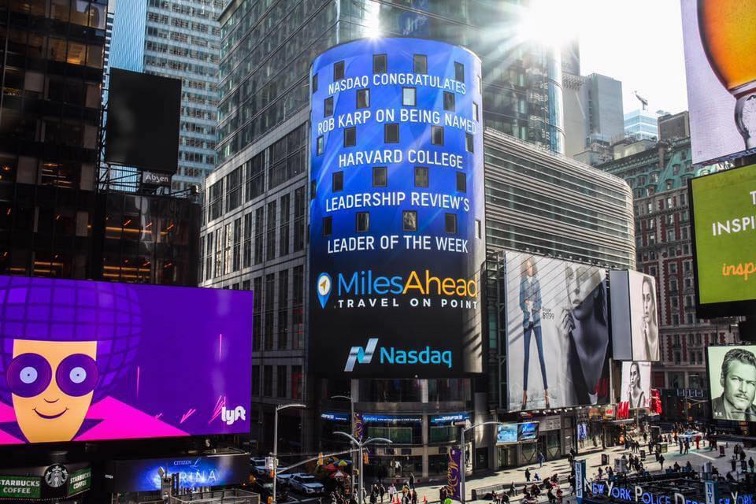
“Rob Karp is a true turbo Hotelie: a student entrepreneur who fueled his passion for hospitality and built his business while in school. I first met Rob when I caught him texting during my Brand Management class. Rob apologetically explained that he was running a hospitality and travel business and dealing with a crisis! Impressed by his industry and initiative, I bent my own rule and allowed him to sit in the back corner of the classroom so he could engage with the class while keeping an eye on his business. Not only did he fulfill all course requirements, he applied what he was learning to make his business even stronger. Today, no surprise to me, Rob is the CEO of a successful and growing luxury travel service business, and I count myself among his many satisfied customers. Rob epitomizes the very best Cornell Hotel School graduate can be: living a life of service for the greater good by bringing people together through hospitality and travel.” Chekitan S. Dev, Ph.D., IMHI ‘85, Singapore Tourism Distinguished Professor, Nolan School of Hotel Administration, Cornell University

“Virtuoso’s mission is transforming the profession of travel advisor, and attracting new generations is key to achieving that goal. Rob’s story and success not only inspired younger professionals to join us, but offered veterans renewed purpose and a desire to extend their careers. Leveraging the unique abilities of new to industry advisors and veterans, puts Rob at the forefront of a macro trend that will determine our collective future, cross generational collaboration.
We are proud to have Rob as a member of the Virtuoso network and congratulate him on this well-deserved recognition. He is truly a Rising Star, and we are excited to what his future holds.”
Matthew D. Upchurch, CTC, Chairman & CEO, Virtuoso Travel